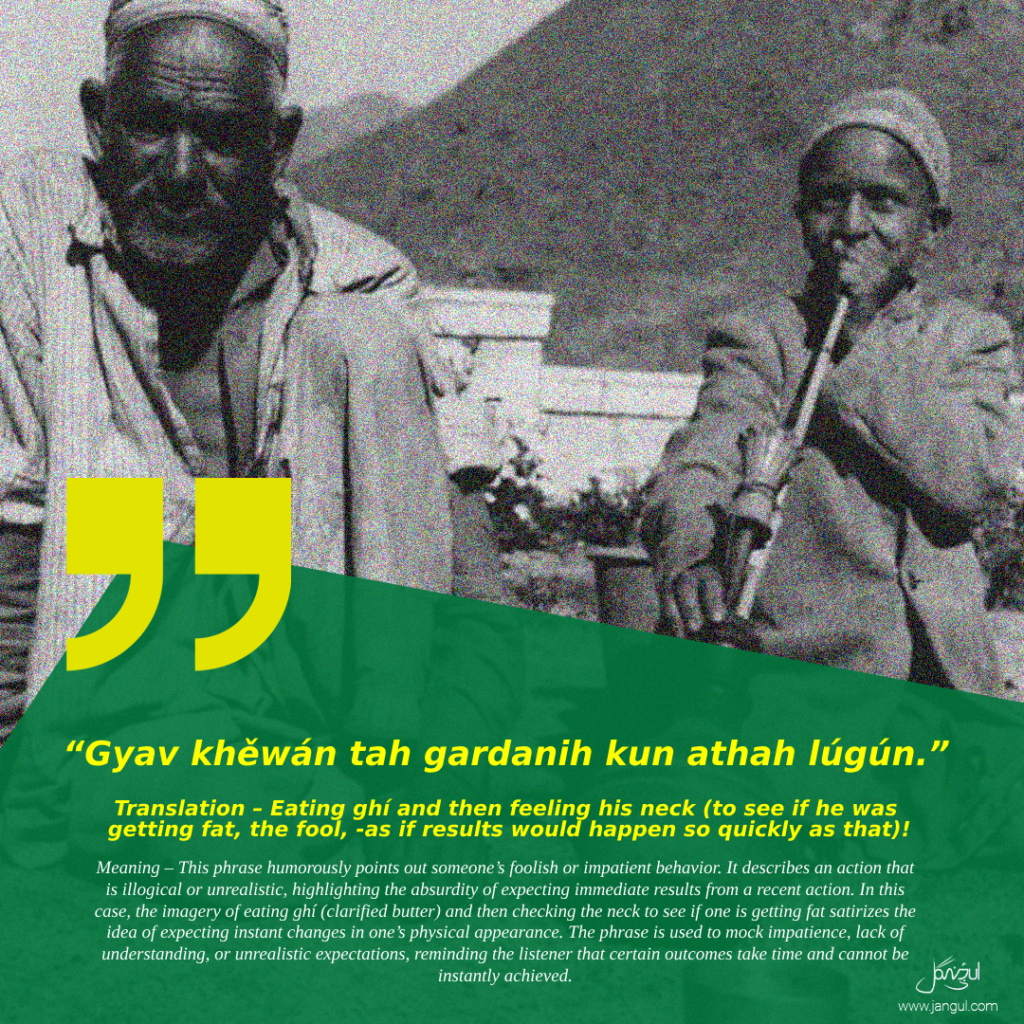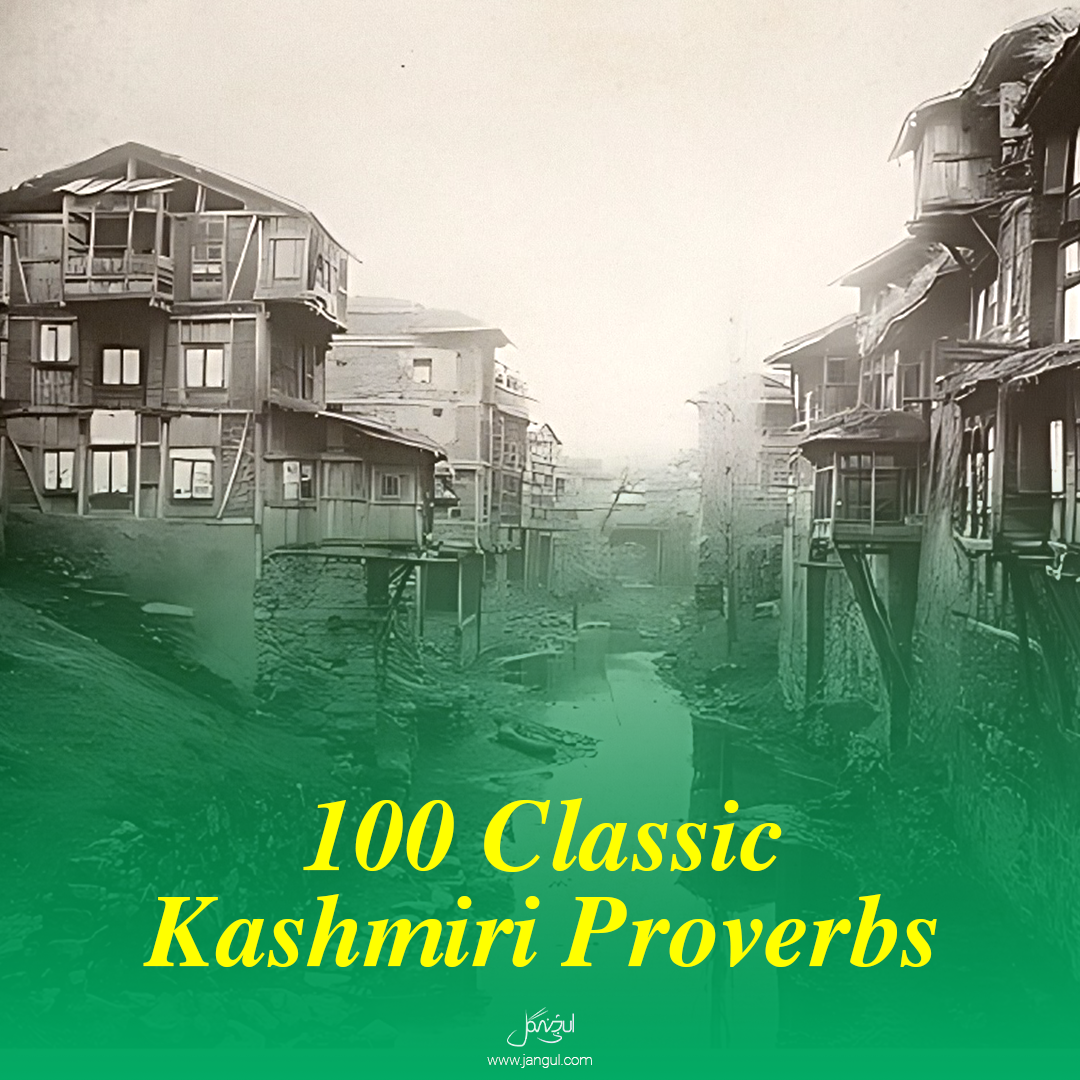These Kashmiri proverbs carry profound meanings and insights into life, relationships, and human emotions.
1. “Ab tih toth bab tih toth”
Translation – I love myself and I love my father.
Meaning – When the friend offered him only one out of the two things he greatly desired, the extremely covetous man responded like this.
An inclination to clutch or seize or grasping disposition.
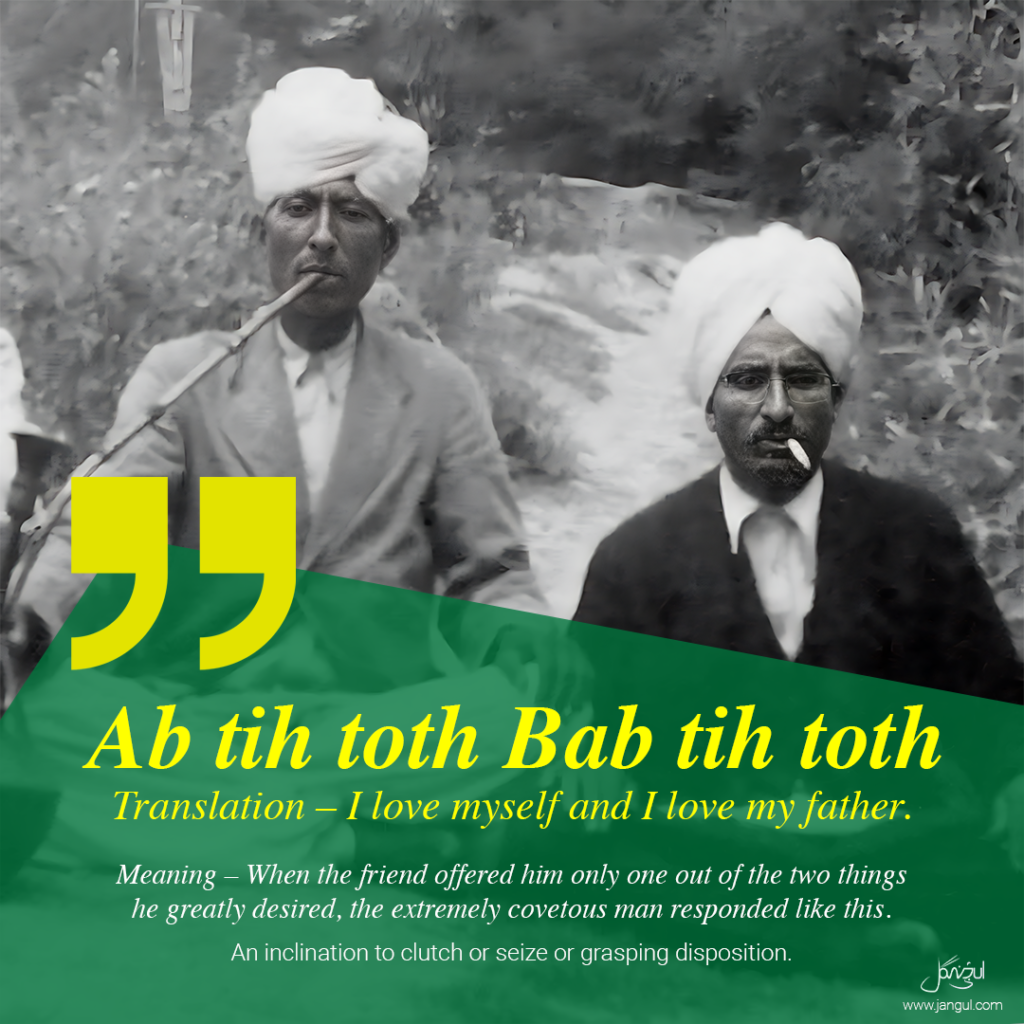
2. “Ábah tali shrák“
Translation – A knife in the water.
Meaning – A traitor in the camp.
Ábah or poní means water in Kashmiri.
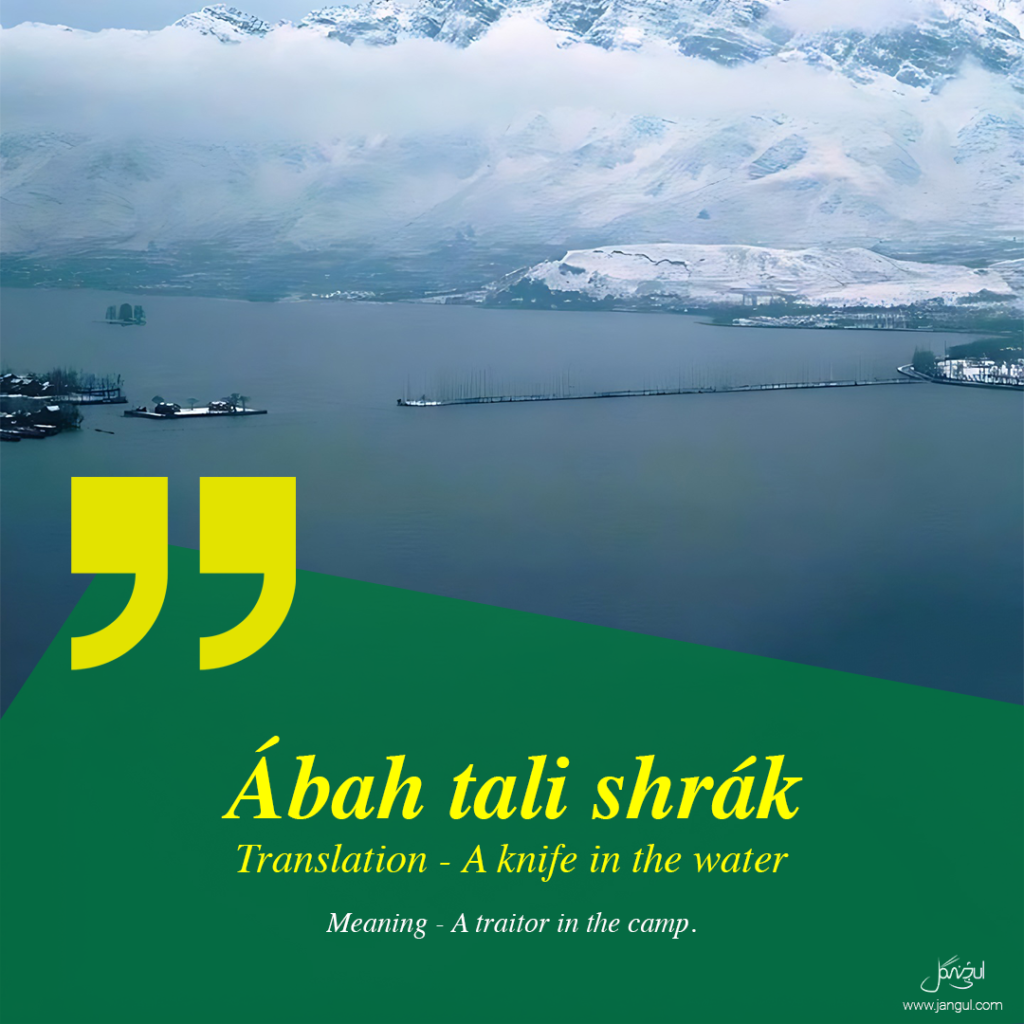
3. “Ábas andar krand“
Translation – A big basket in the water.
Meaning – An individual, vested with a certain position and significant influence by virtue of their role, resembles a leaf adrift on the water. As long as they hold their position, their authority and esteem remain intact; however, once they are relieved of their duties, these attributes dissipate. Similar to a basket that gathers water while afloat in a current, it promptly empties once removed from the stream.
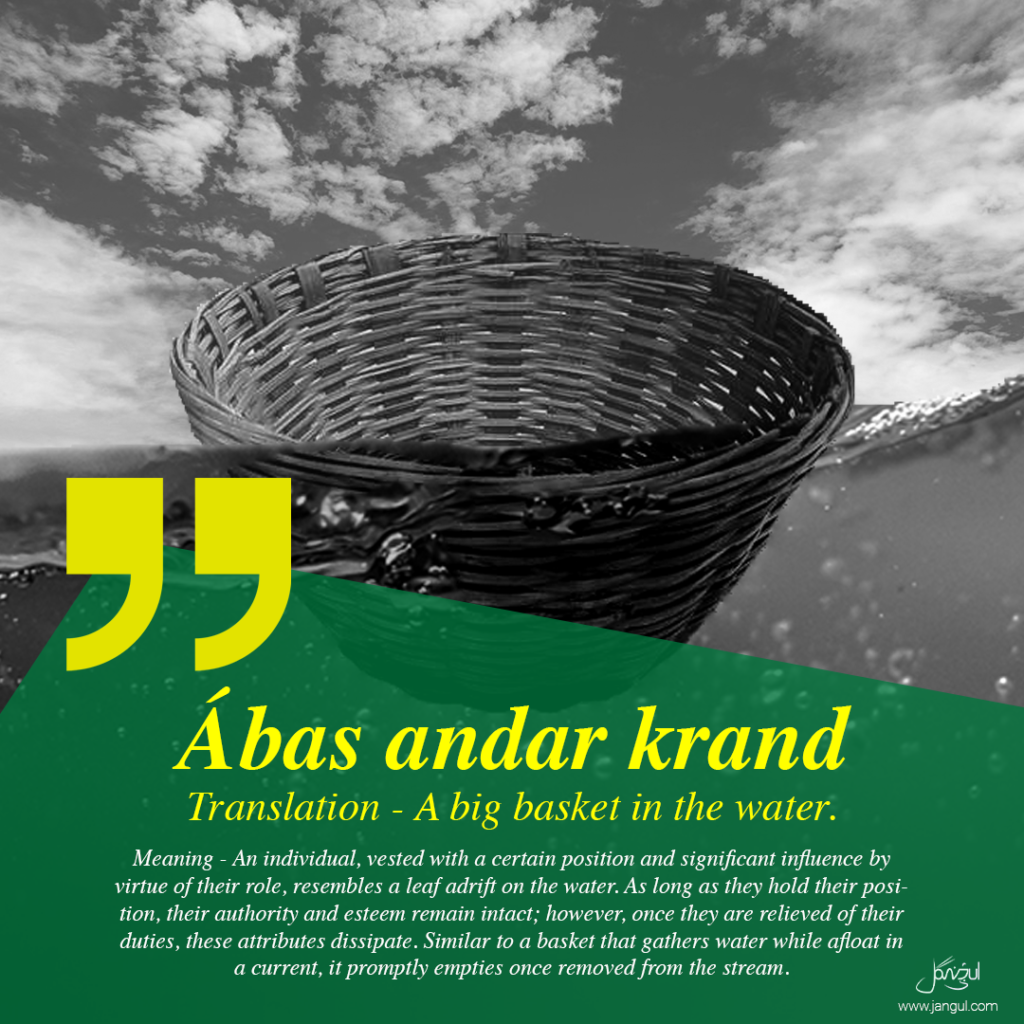
4. “Achh káni ján tah wat káni nah“
Translation – Better that the eye be blind than that the way be blind.
Meaning – One who borrows often finds themselves burdened with sorrow.
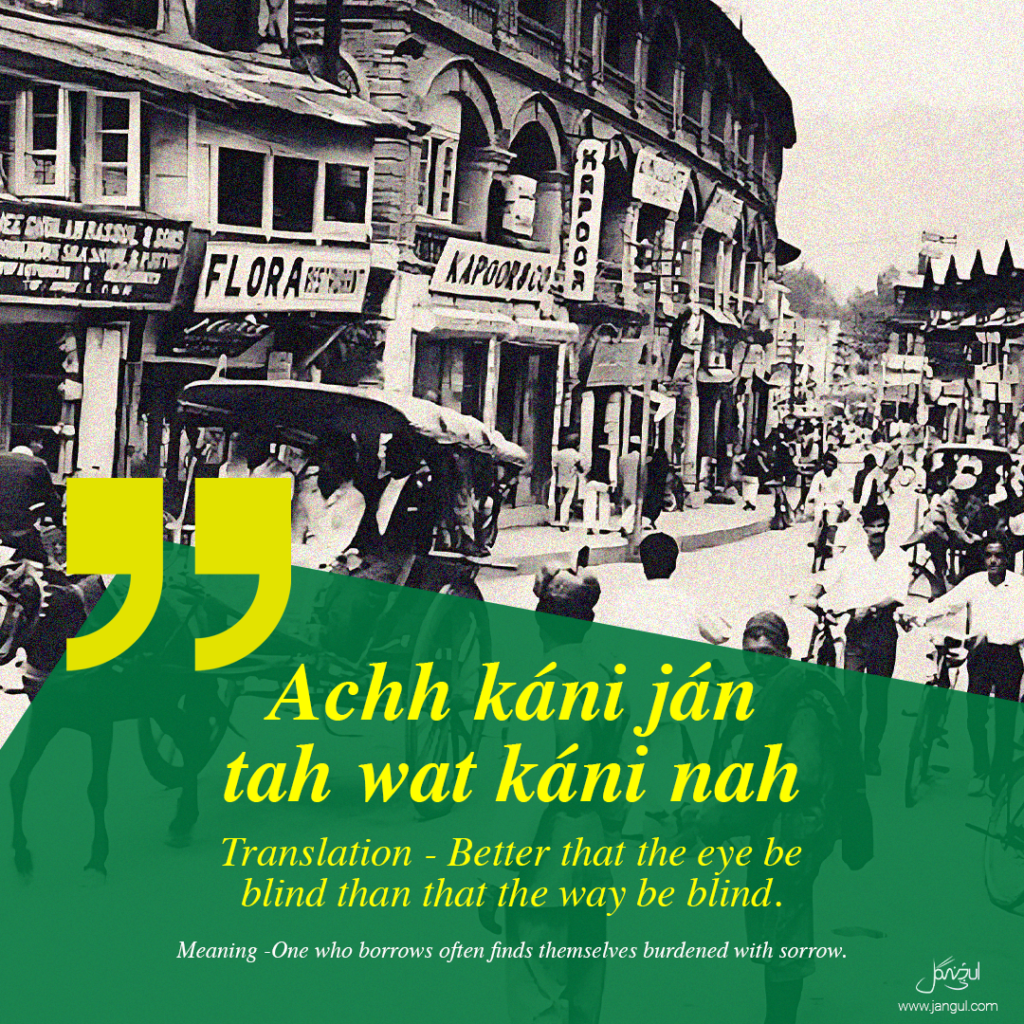
5. “Achh watsah tah gáshah ratshah“
Translation – May your eyes be opened but see nothing.
Meaning – A Kashmírí curse. One of the very famous Kashmiri Proverbs.
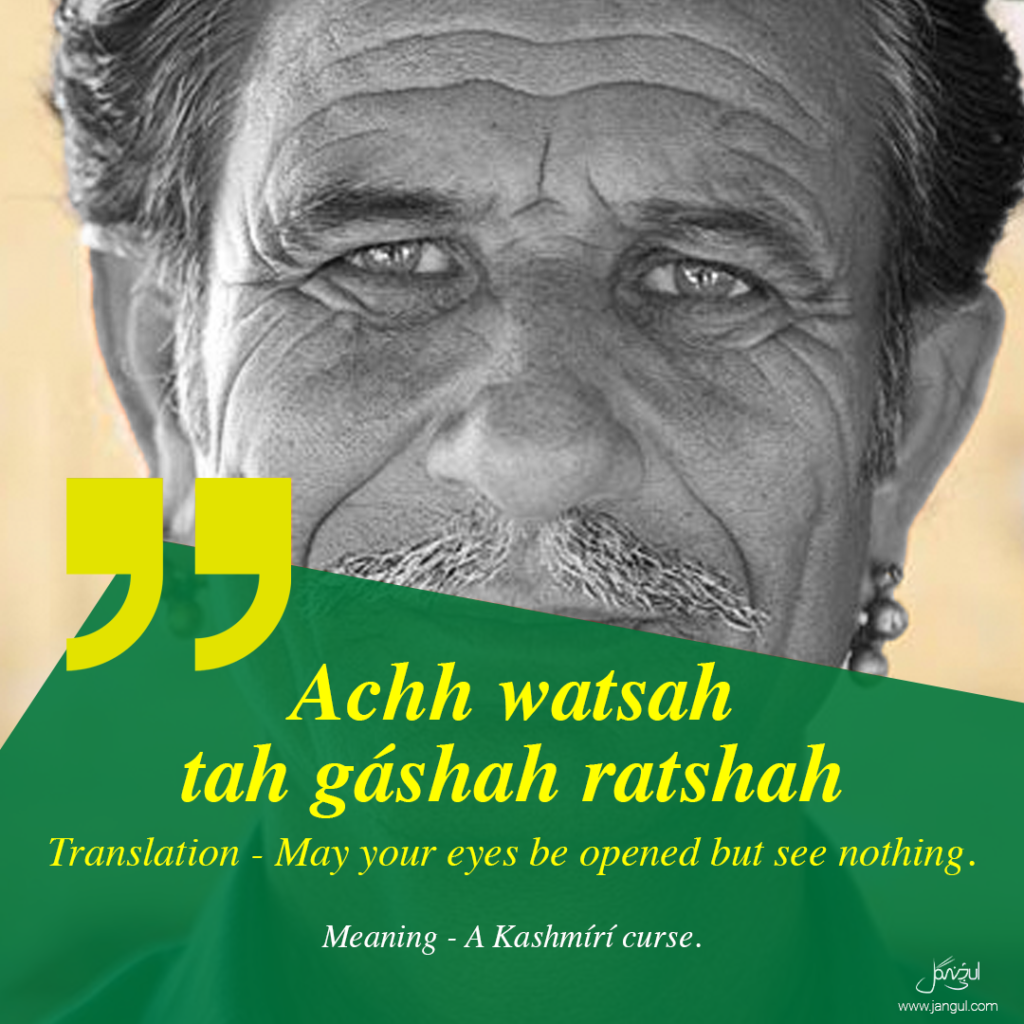
6. “Achhin ungujeh thukainh”
Translation – To strike the eyes with the fingers.
Meaning – To tease, to bother.
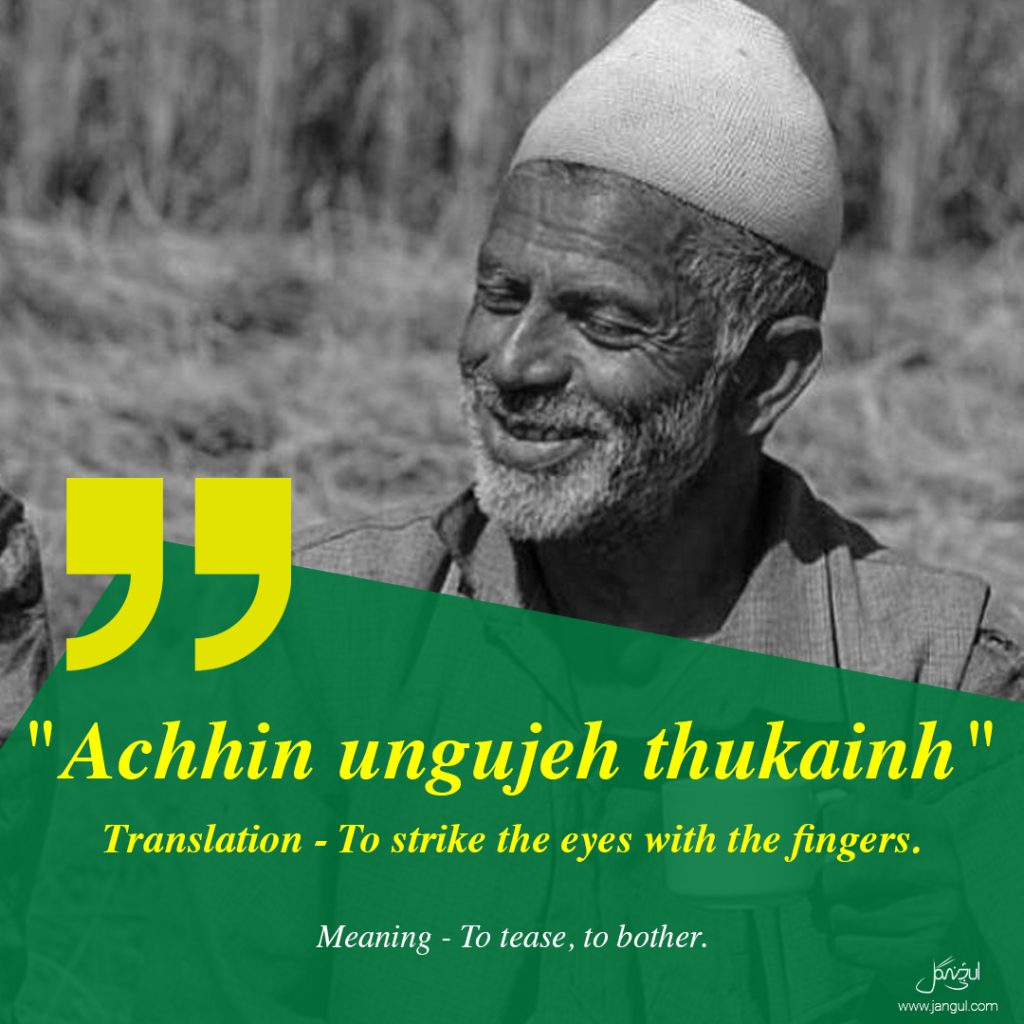
7. “Achhuv andarah niyih surmah kaḍit”
Translation – He’ll take the (very) antimony out of your eyes (and you’ll
not know it).
Meaning – A sharp fellow, Beware!
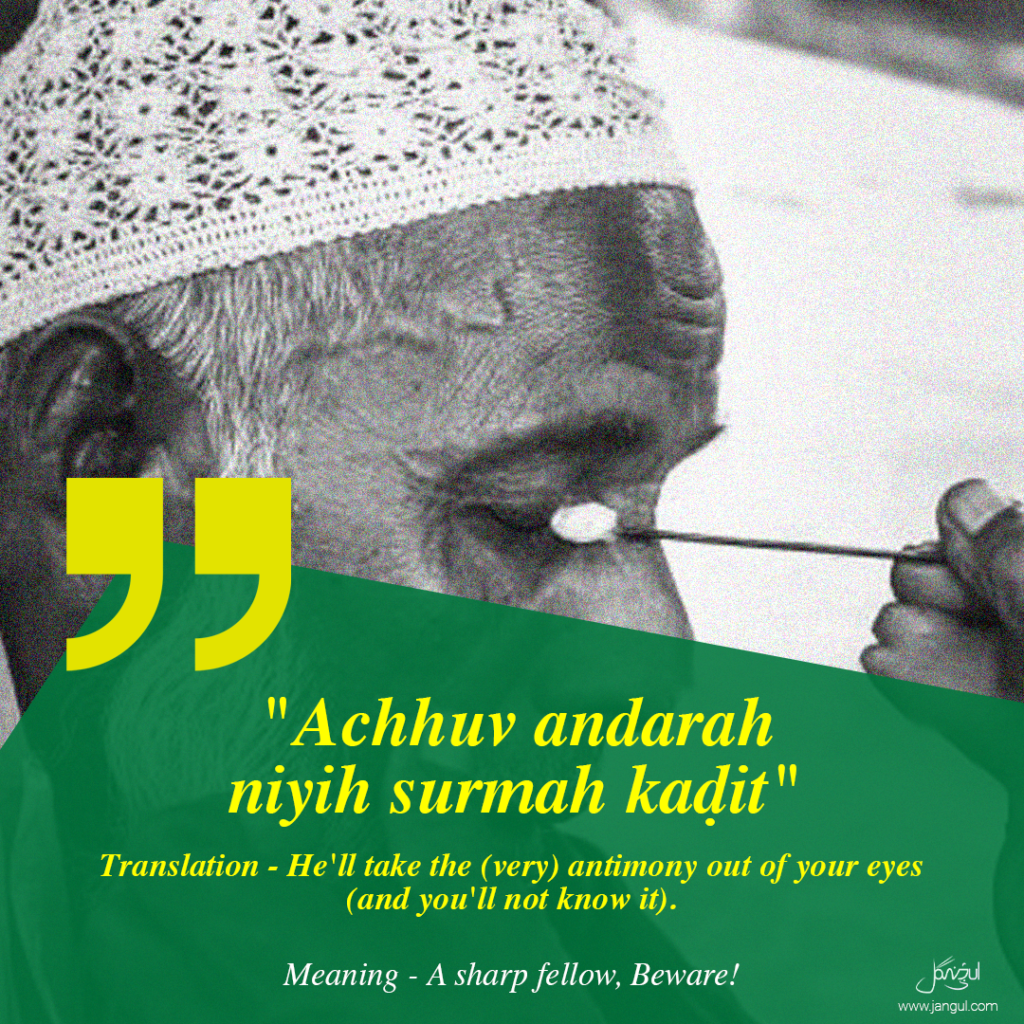
8. “Adal tah wadal zanánah chhai pashich zadal tshai”
Translation – A contrary woman is like bad grass on the roof.
Meaning – Grass unsuited for thatching fails to establish a proper seal, allowing rain to penetrate the roof.
Kashmiri proverbs
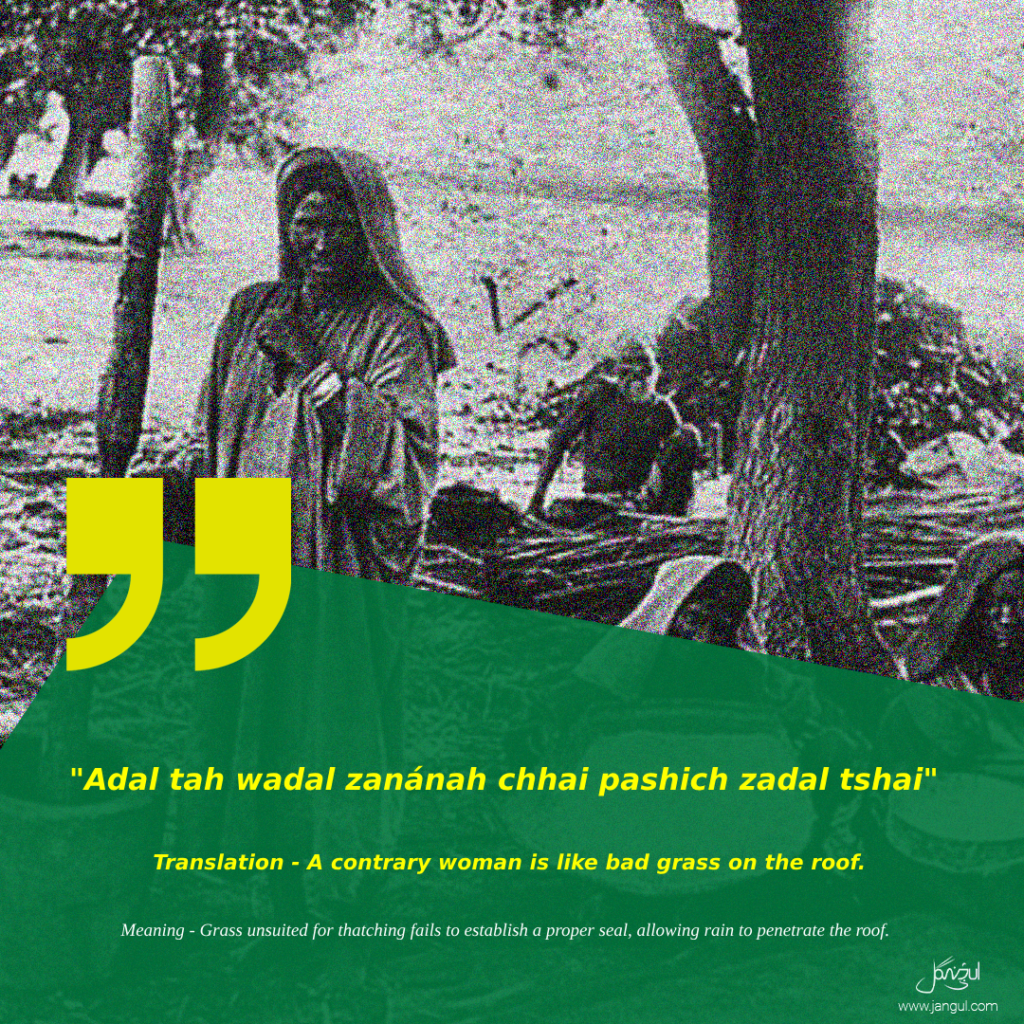
9. “Adi dadi yětshih tah adi dadi rětshih”
Translation – Half (the people) are burnt with wishing and half are burnt
with scandal.
Meaning – The competition for recognition and position.
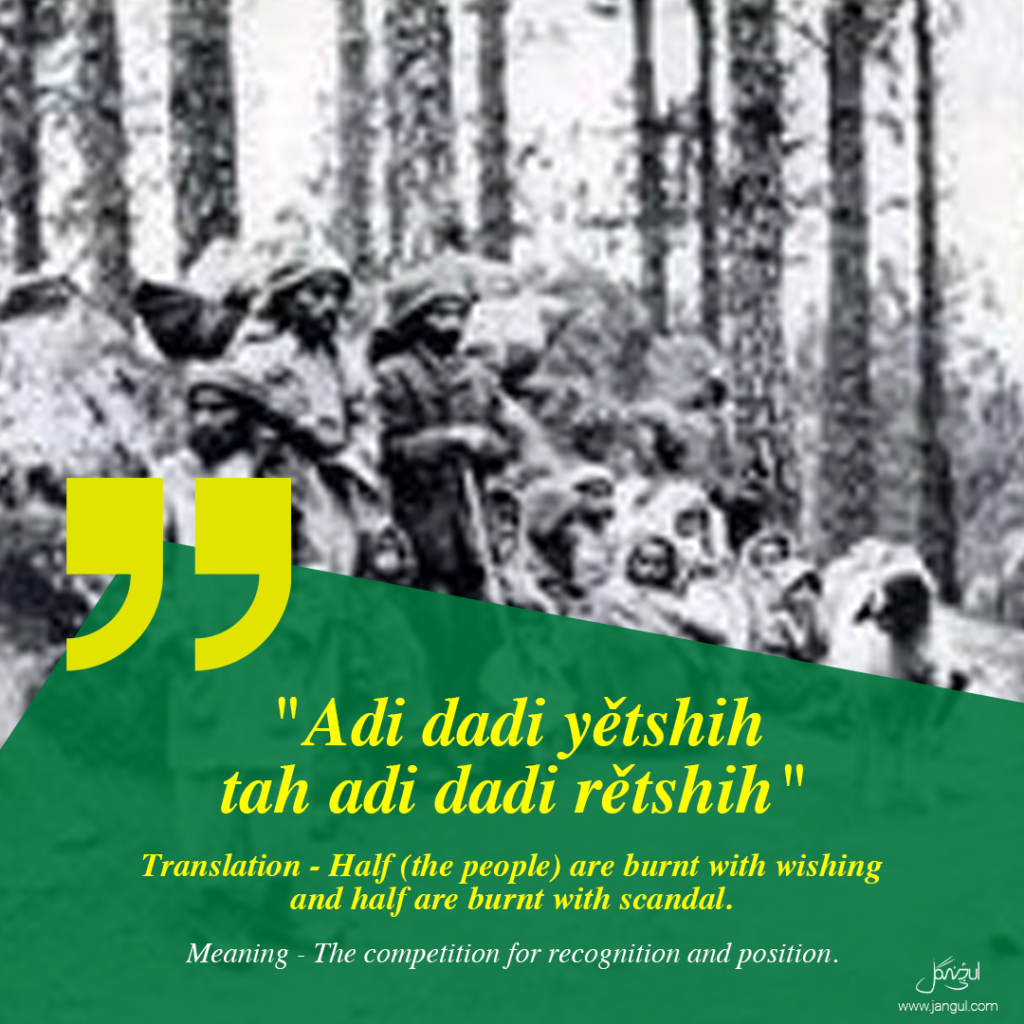
10. “Aadam bastan andar chhuh sir”
Translation – A secret is (concealed) under the skin of a man.
Meaning – Man is a make-up of mystery.
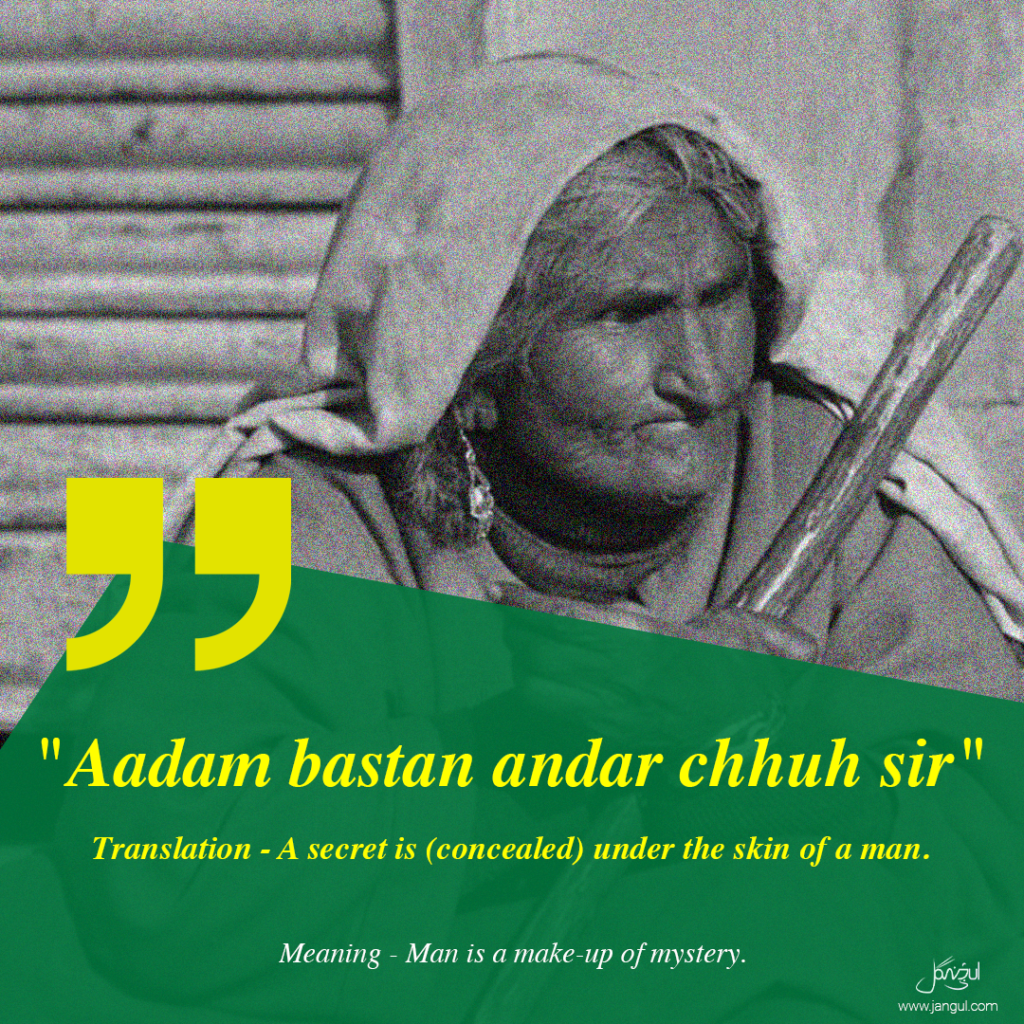
11. “Adui umr tah baḍuí balíí.”
Translation – Half-life and great misfortune
Meaning – This Kashmiri Proverb carries a curse, wishing that half of your life is filled with great misfortune.
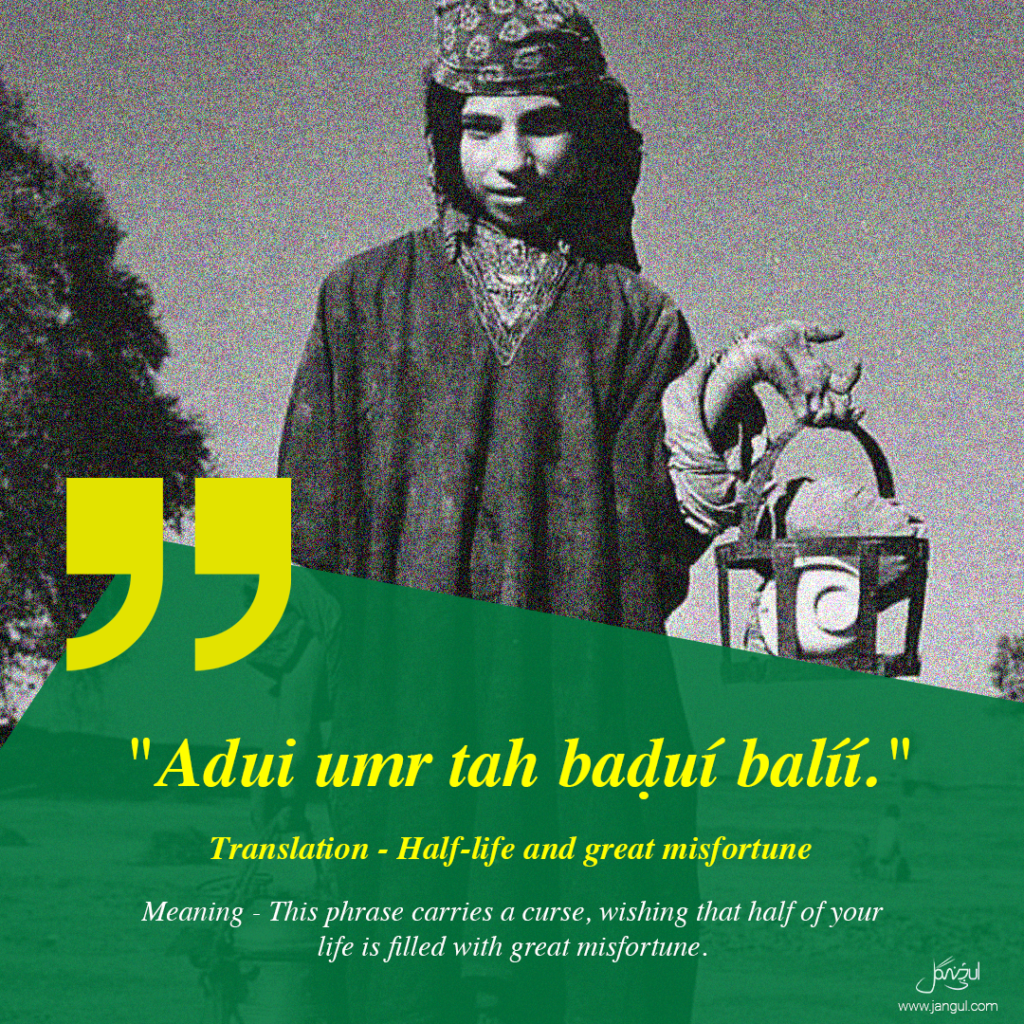
12. “Adyao khěyih chinih adyao khěnh ták”
Translation – Half (of the people) ate the large dishes and half from the
small dishes.
Meaning – Signifies a meal event that was poorly organized or planned.
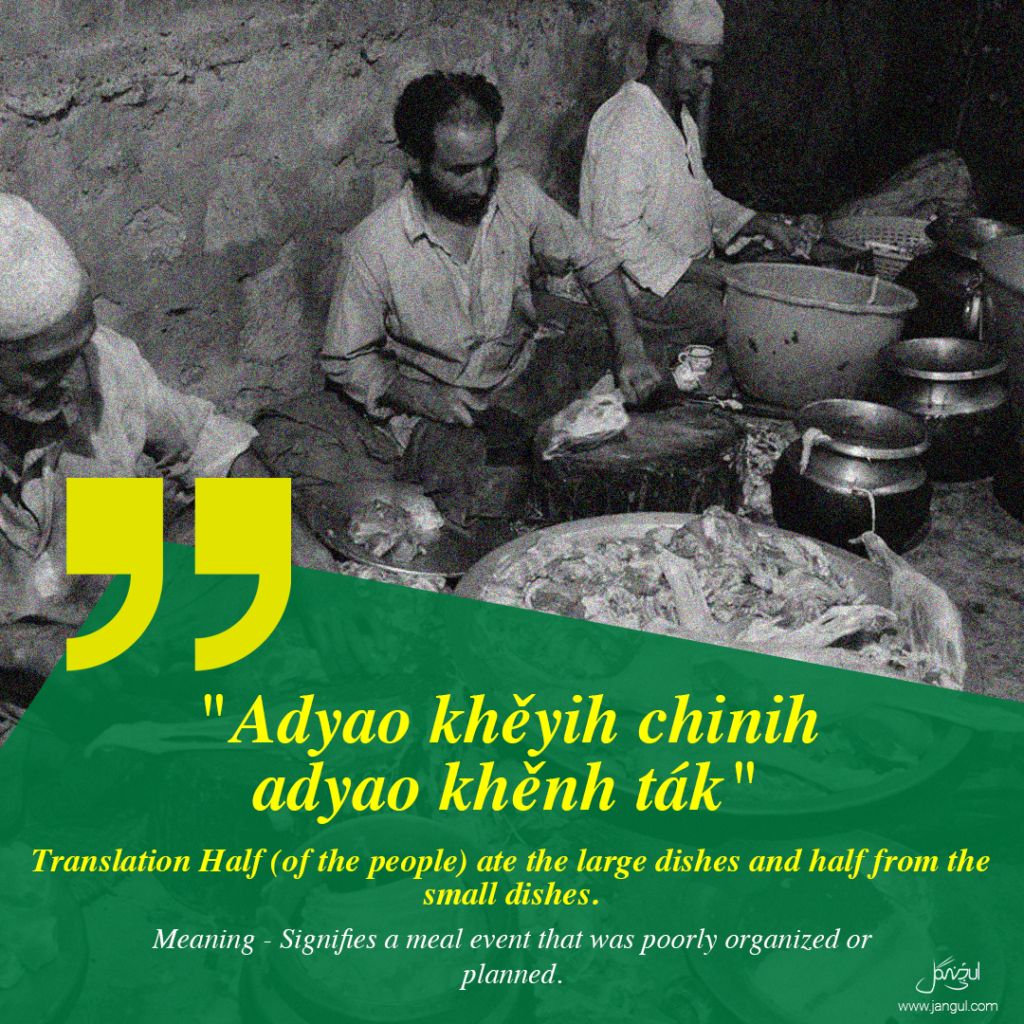
13. “Ágah boḍ paharas naukar boḍ waharas”
Translation – The master is great in three hours, the servant is great in
as much in three hours as others do in twelve a year.
Meaning – Certain individuals generate a significant income in three hours, equivalent to what others achieve in twelve months.
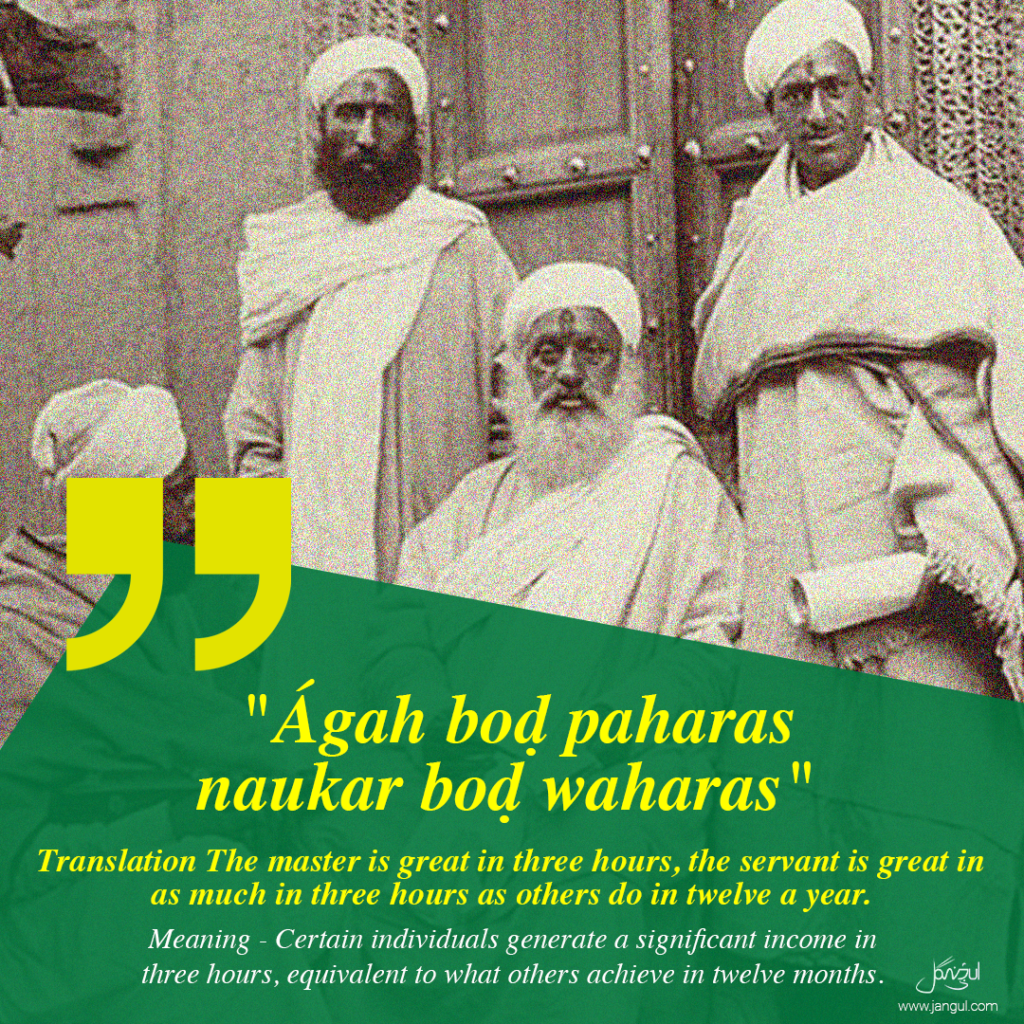
14. “Ágah karán nethar tah parzun nah mánán”
Translation – The master enters into marriage, yet the servant refuses to accept.
Meaning – A dissenting servant.
Kashmiri proverbs

15. “Agar Khán tsiyov gagar wiji, talih no míjis kum-yíjí”
Translation – If Khán entered into a rat’s hole, he wouldn’t even get a bran-cake.
Meaning – Depicting extreme adversity, even in dire circumstances, Khán would receive no sustenance or assistance. One of very old Kashmiri Proverbs.
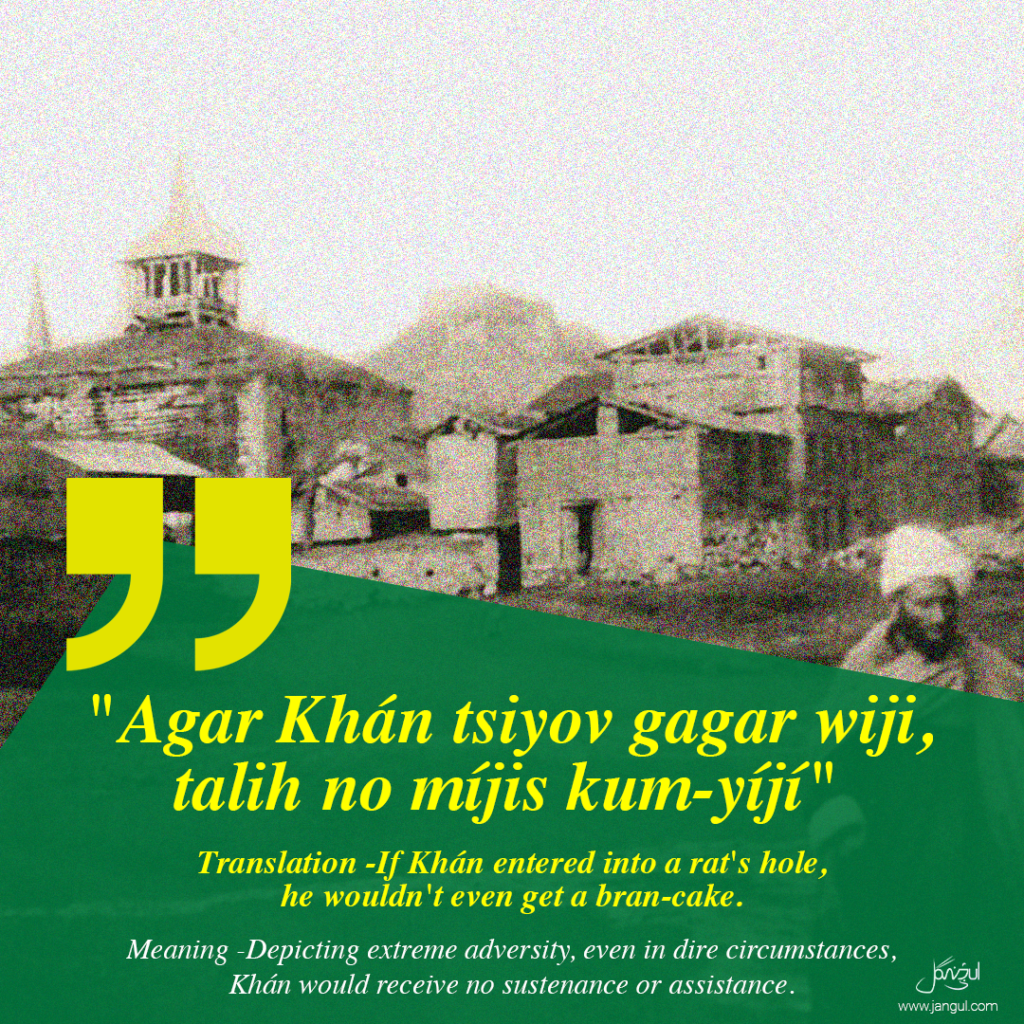
16. “Agar tser karihjald yiyih, agar jald karih tsír yiyih“
Translation – If he delays he will come quickly, but if he hastens he will come slowly.
Meaning – When one procrastinates, the outcome may arrive sooner than expected, but rushing can result in slower progress.
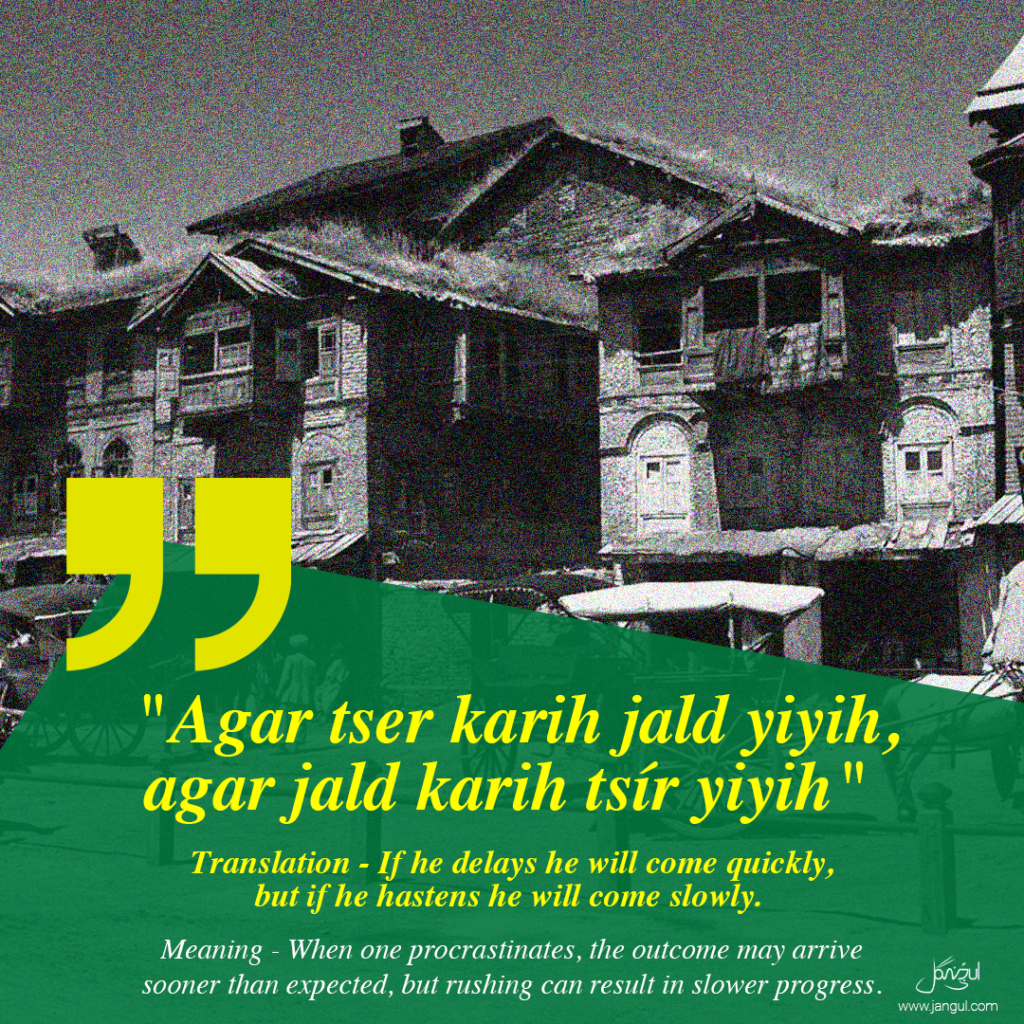
17. “Ahalamari ratah-kharí”
Translation -The quarrelsome people of Ahalamar.
Meaning – One of the kashmiri proverbs that characterizes the residents of Ahalamar as contentious and prone to engage in disputes.
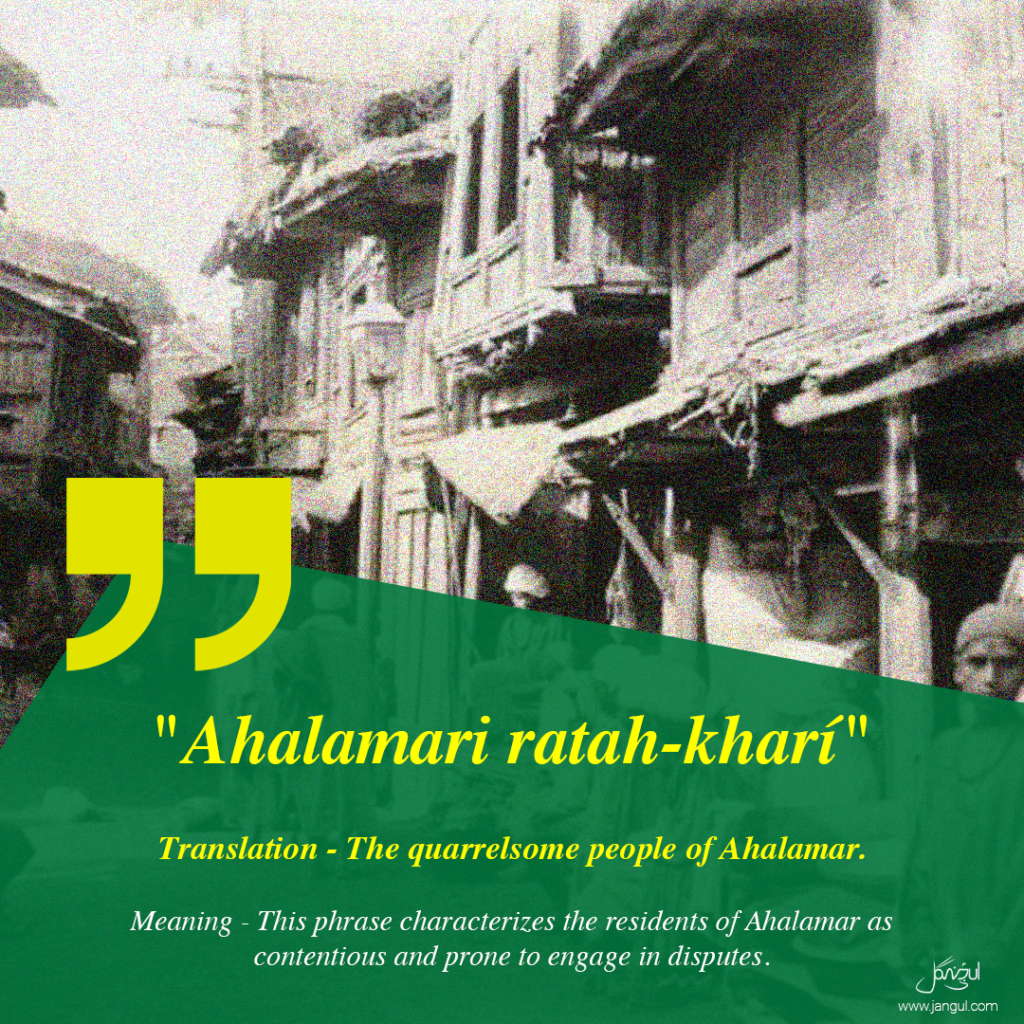
18. “Ai hák tsah katih ák ?” “Az khánai Mumah Ták.” “Nah tsah nun nah tsah pák. “Birav binshín bálá-i – ták”
Translation – “O cabbage, whence came ye?”
“From the house of Mumah Tak”
“You are neither salted nor cooked”
“Heugh! go and sit at the window”
Meaning – “Hák” refers to cabbage or other edible vegetables, and it might be called “Hák-wák” or “Ság,” similar to the Persian term for cabbage. These lines are a common humorous response when cabbage is poorly prepared or cooked. Mumah Ták was a well-known and significant greengrocer in the city of Srínagar. One of very funny Kashmiri Proverbs.
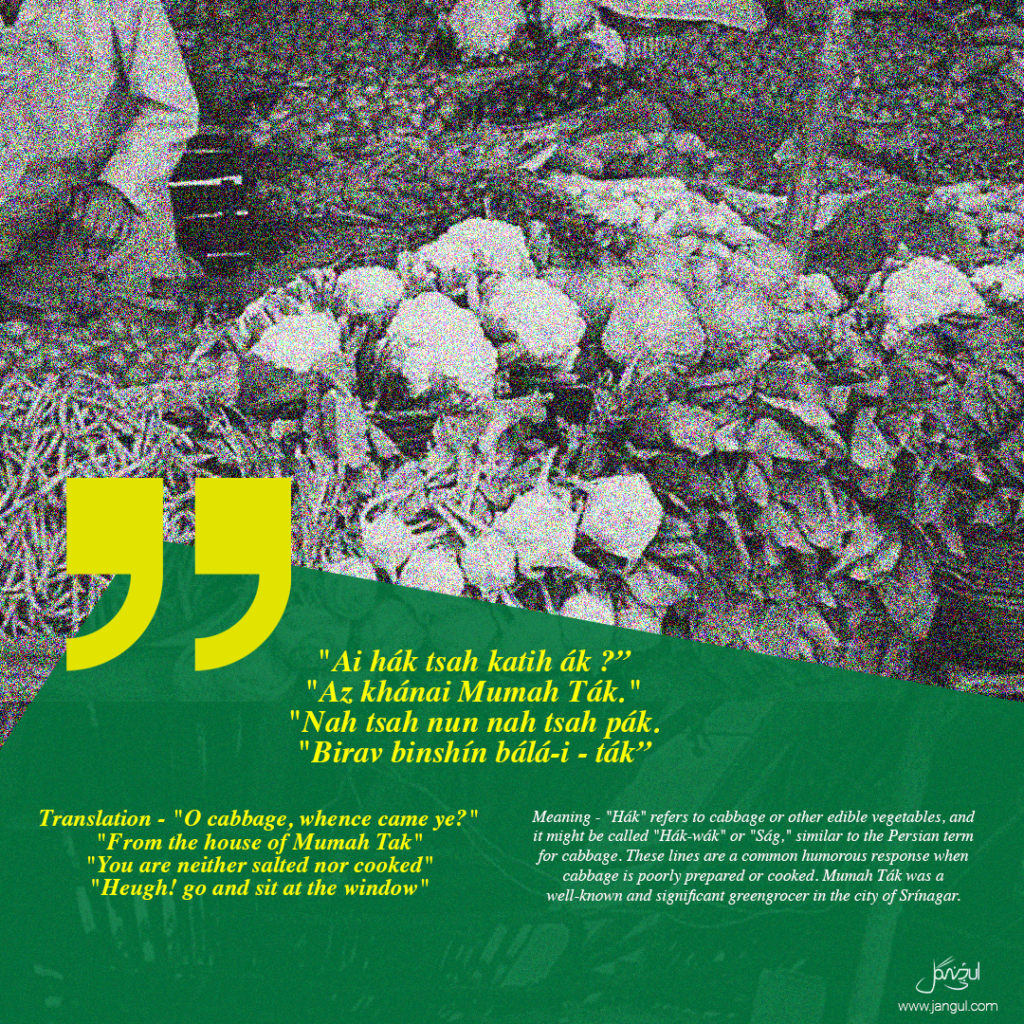
19. “Aib panun máshok”
Translation – A man loves his own fault.
Meaning – One of the kashmiri proverbs that suggests that individuals often have a tendency to overlook or excuse their own faults or mistakes.
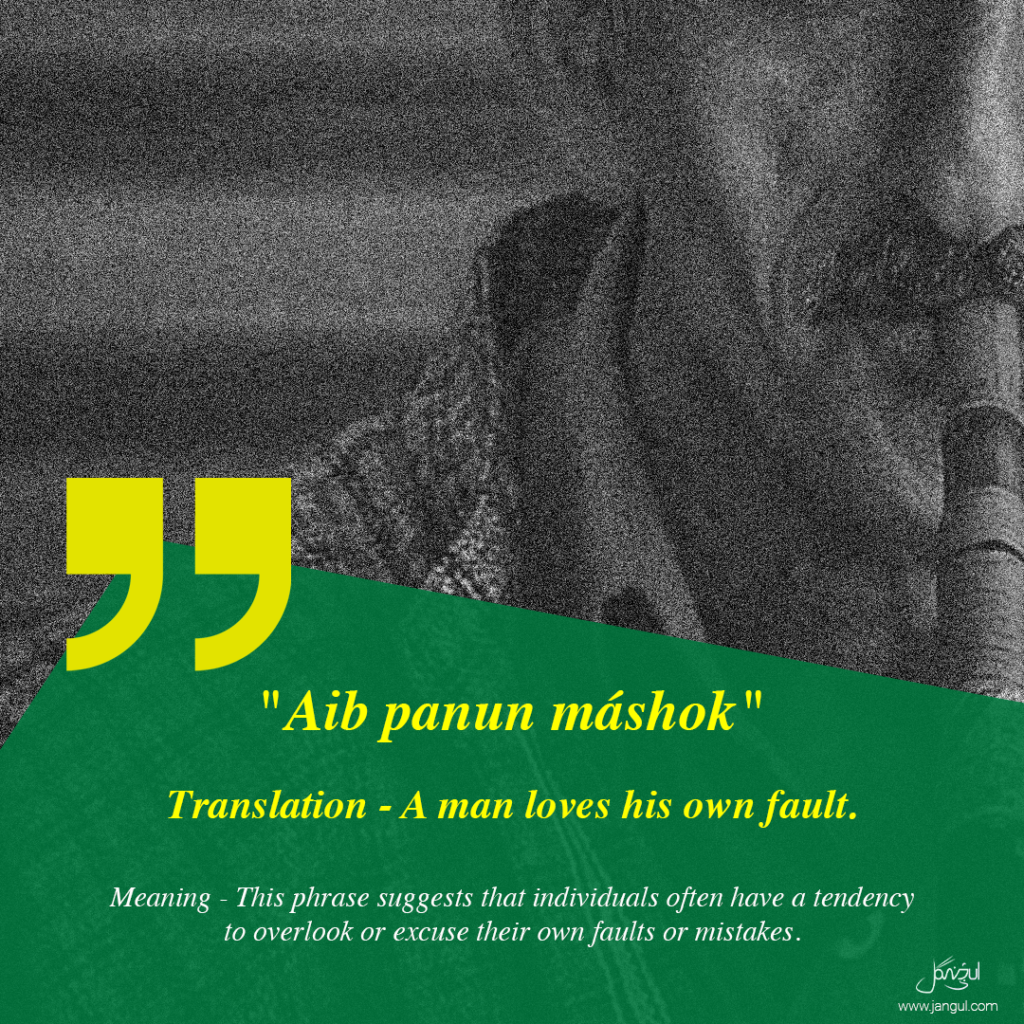
20. “Aibo pěyiyo gaibuch balái, mandachhih patah chhai khijálat”
Translation – O sin, let Heaven’s misfortune fall upon you-to you is a shame upon shame.
Meaning – One of the kashmiri proverbs that conveys a strong sense of condemnation for wrongdoing, implying that the weight of heavenly retribution and the accumulation of shame is destined to befall the one who commits the sin.
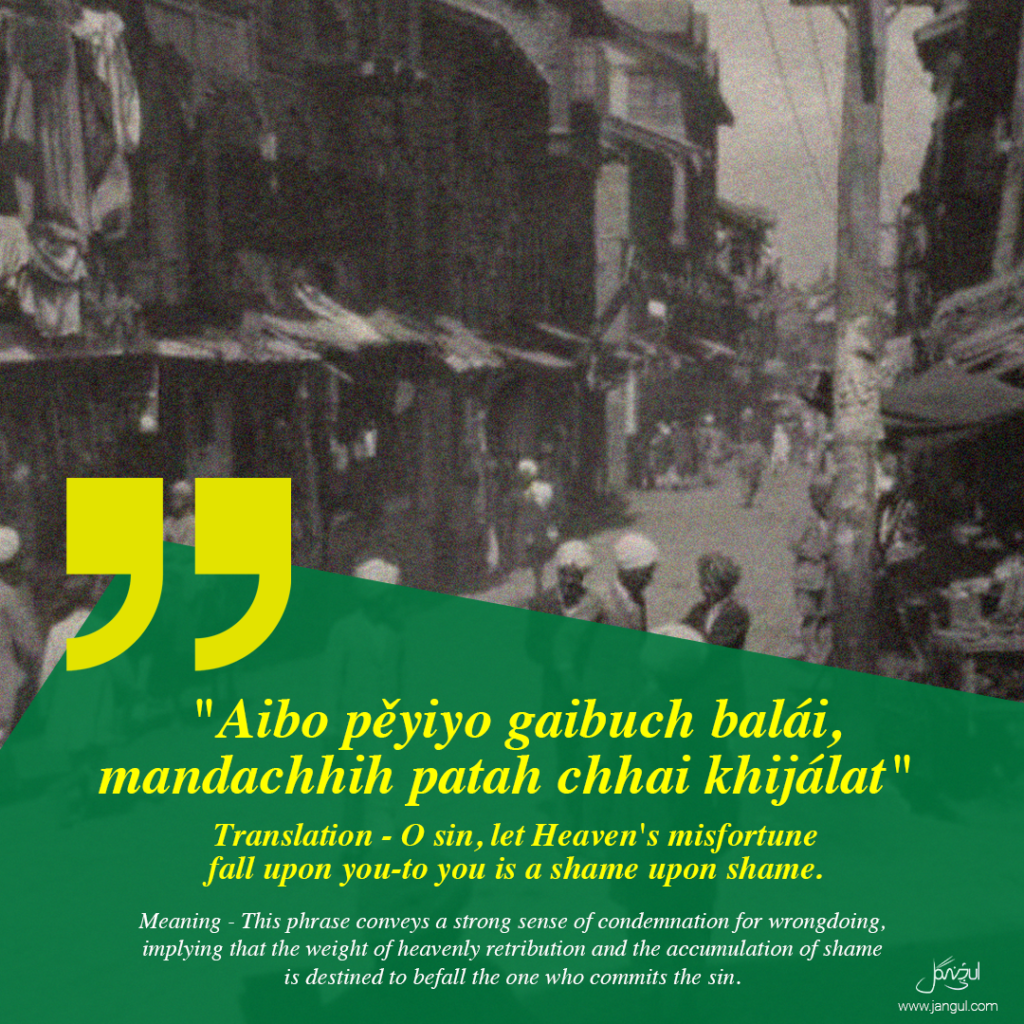
21. “Ák ai tah untham kyah? Yimah ai tah khyáwaham kyah?”
Translation – If you have come, what have you brought? If I come, what will you give me to eat?
Meaning – A hired soldier or fighter for pay.
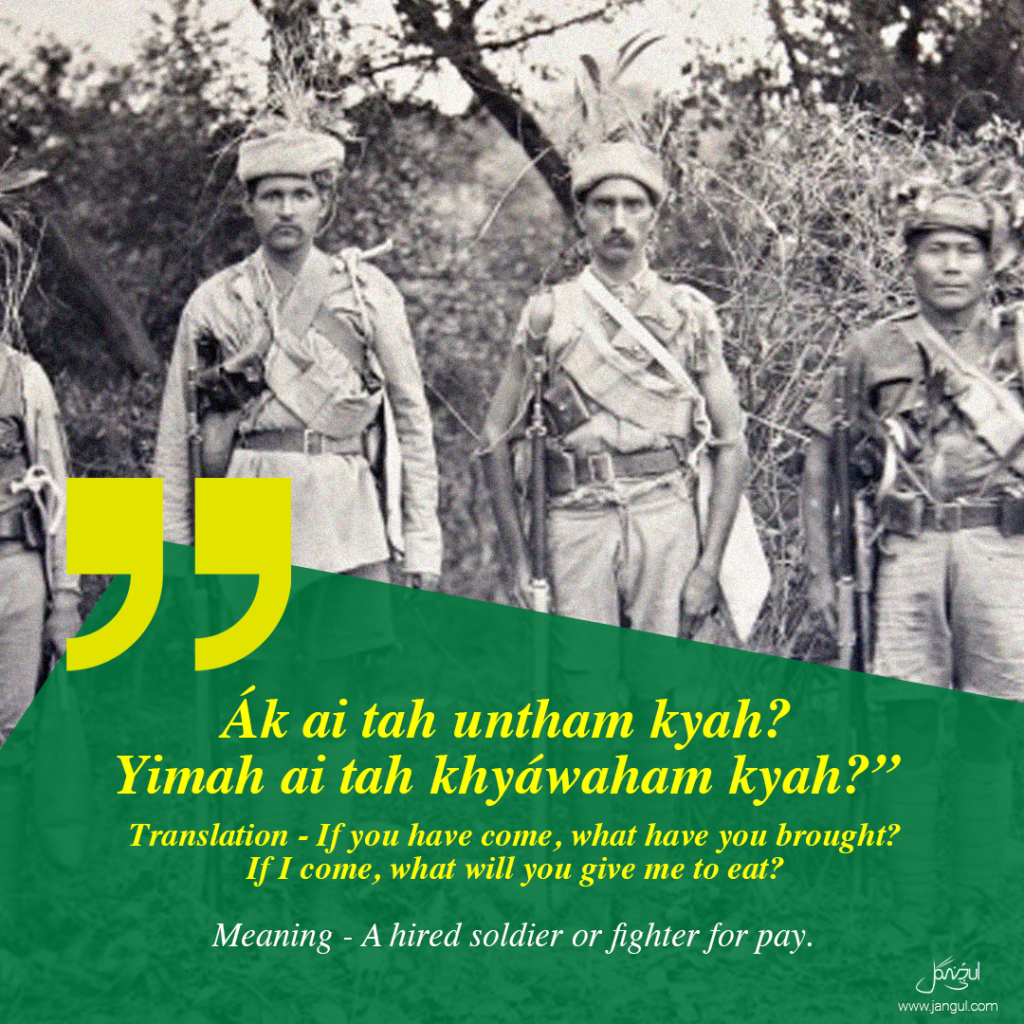
22. “Ák budih tah methih, byák budih tah tĕthih”
Translation – One man is old and sweet, another old and bitter.
Meaning – One of the kashmiri proverbs that highlights the diversity of personalities and attitudes among elderly individuals.
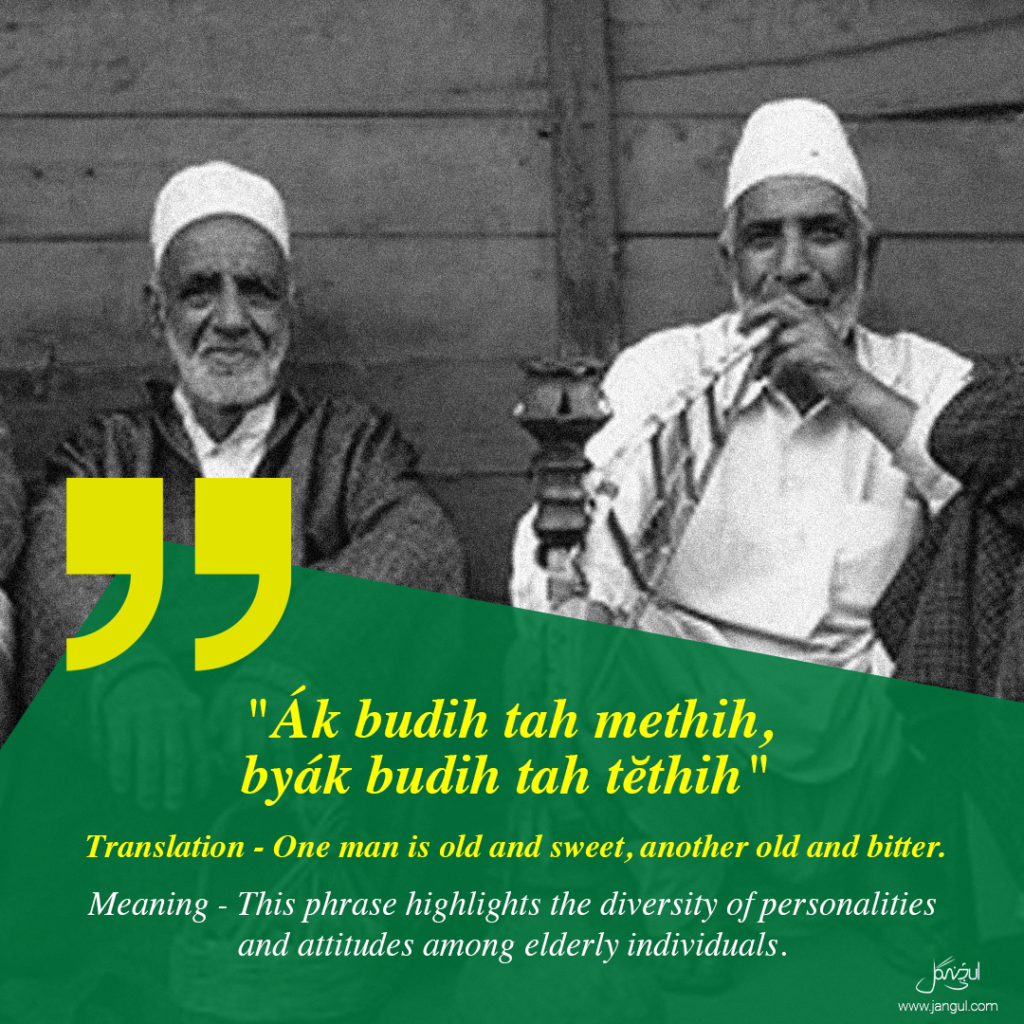
23. “Ak chhiwyov masah byák hákah rasah”
Translation – One man is intoxicated with the juice of the grape, another with the juice of vegetables. Meaning – Pride resides within all individuals, whether they are wealthy or impoverished. In the context of Kashmir, it stands as the exclusive region in India where the transformation of grape juice into wine occurs. This peculiar aspect can be more attributed to the region’s slightly acidic quality than to any scarcity of the fruit.
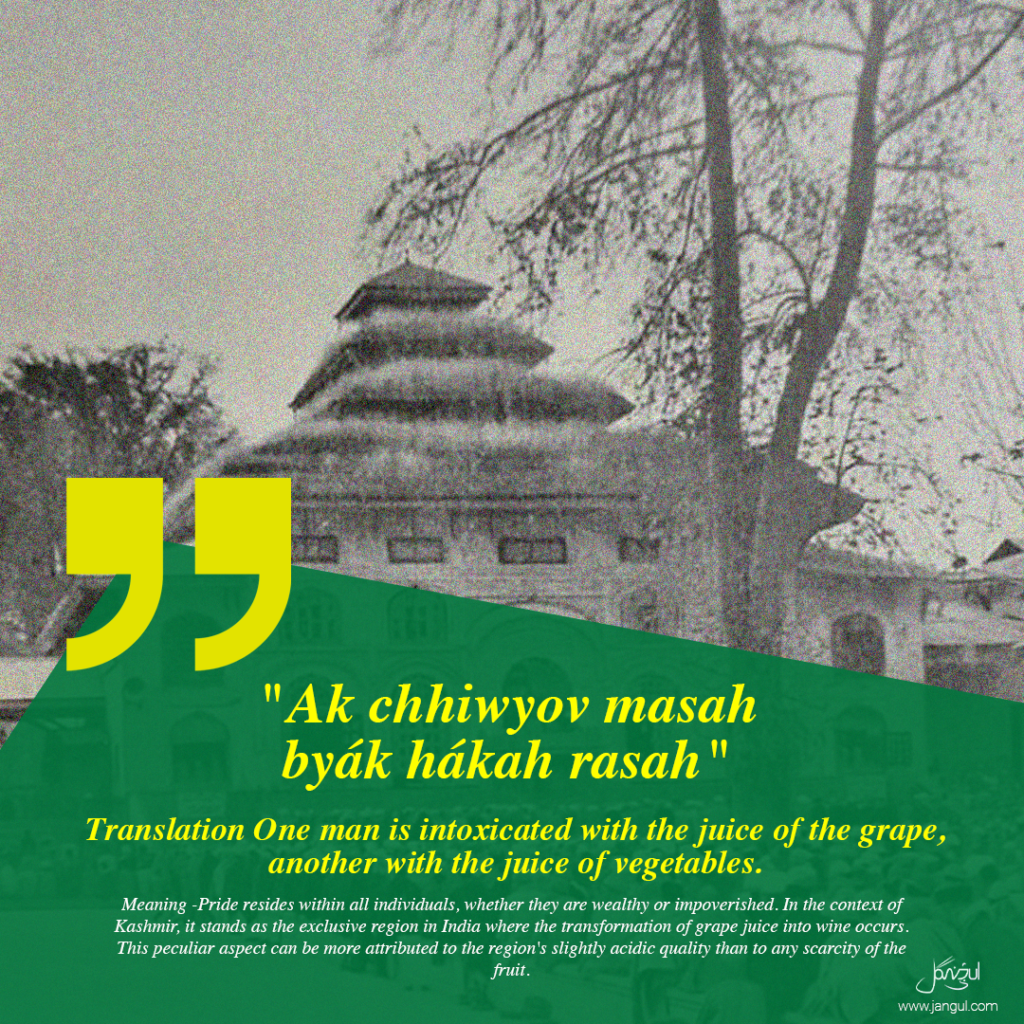
24. “Ak gov jani yár, bylk gav náni yár.”
Translation – One is a sincere friend, another is a superficial friend.
Meaning – One of the Kashmiri proverbs that emphasizes the distinction between genuine and shallow friendships.
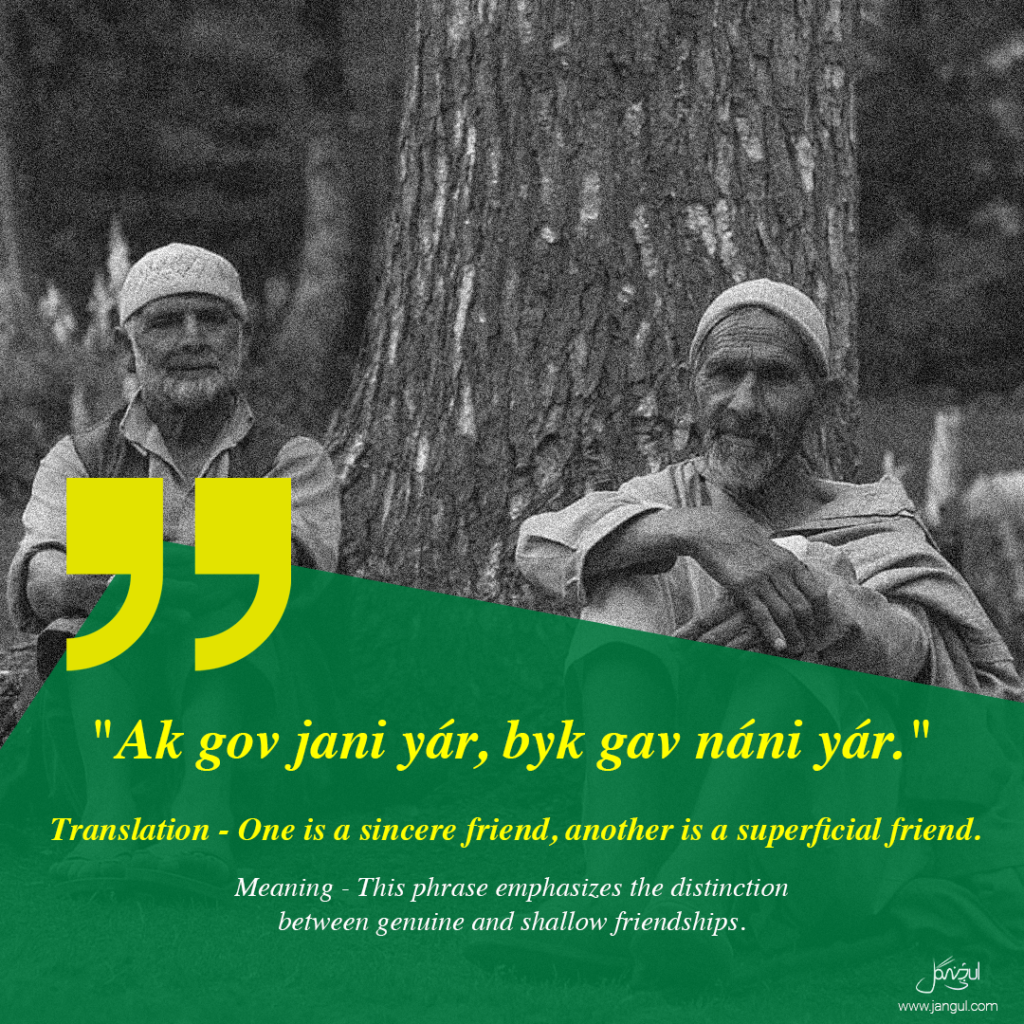
25. “Ak khojas suět batah khyun, běyá sinis kun athah nyun?”
Translation – When in the company of a nobleman, will you reach out for the dish yourself?
Meaning – One of the Kashmiri proverbs that questions whether one would take liberties or behave improperly in the presence of someone important.

26. “Ak lewún graṭṭas byúk lewún graṭṭawáli sunzih chinih.”
Translation – One licks the millstone, and the other licks the miller’s dish.
Meaning – This saying illustrates the cycle of earning and spending, implying that some individuals may have a tendency to spend their earnings rapidly, counteracting the efforts of those who earn money.
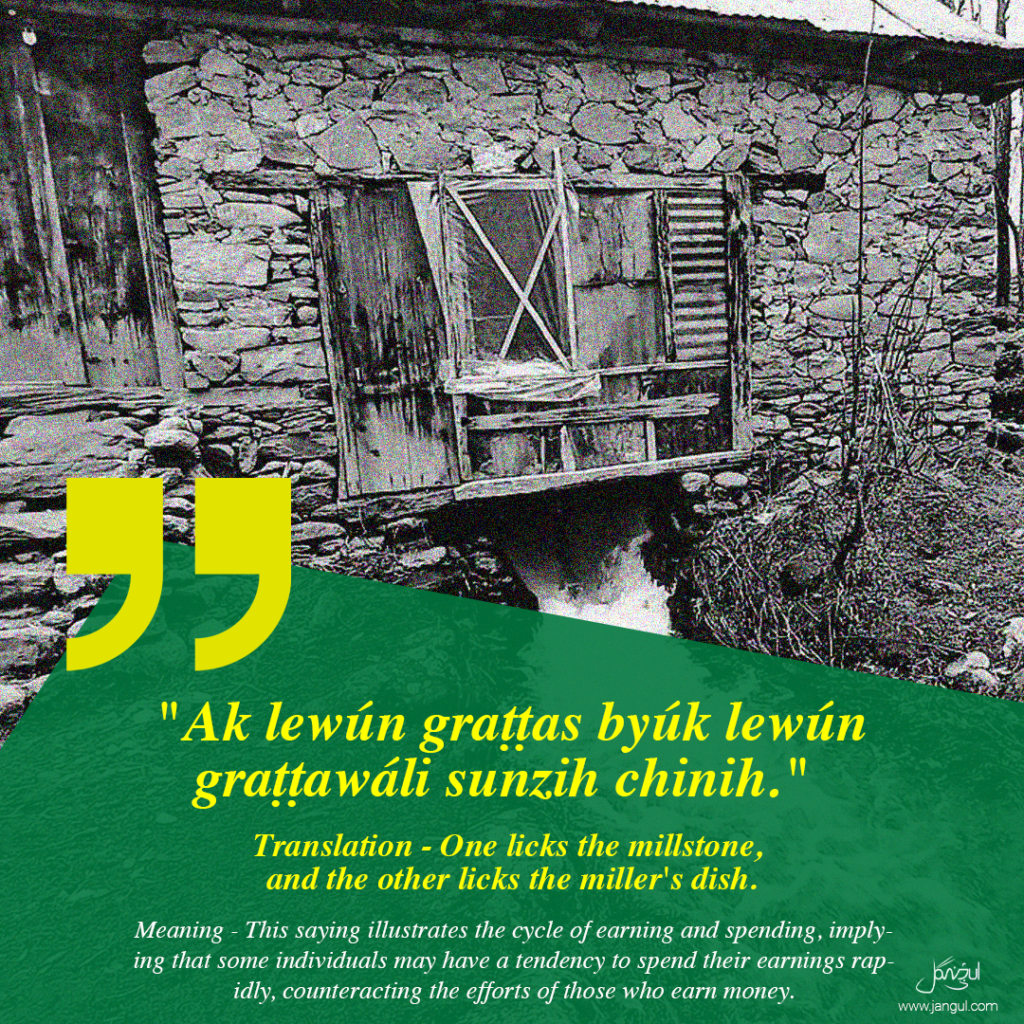
27. “Ak nyuv Yaman tah byúk khyav braman.”
Translation – One was taken by Death, and the other was enticed from his homeland to a foreign land in pursuit of profit.
Meaning – One of the Kashmiri proverbs that portrays the divergent fates of two individuals: one met his end due to death, while the other left his home to seek opportunities in another land for potential gain.
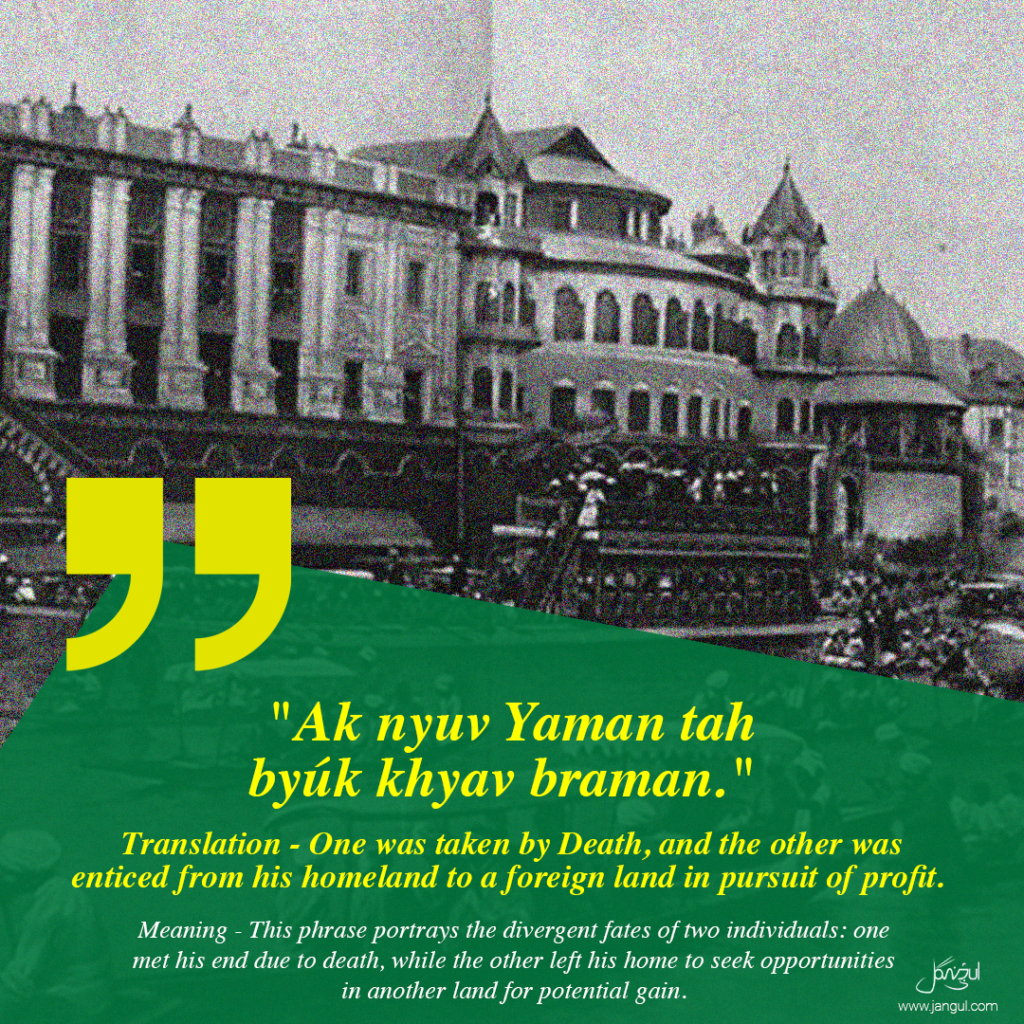
28. “Ak tah ak gav kah”
Translation – One and one make two.
Meaning – This saying suggests that collaboration and sharing ideas between two individuals can lead to better solutions or decisions compared to working alone.
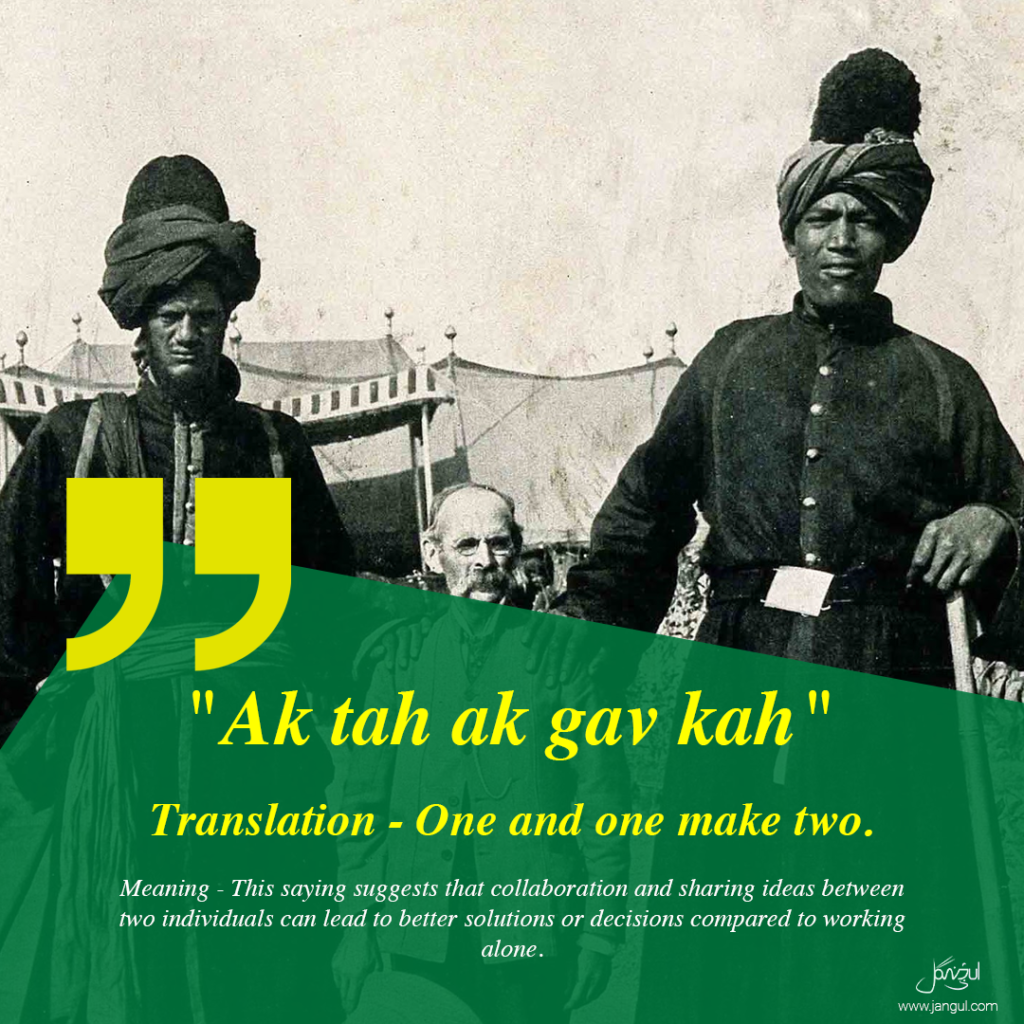
29. “Ak wukur běyih trakur”
Translation – First, you are in difficulty; second, you are arrogant.
Meaning – One of the Kashmiri proverbs that highlights that unwarranted or baseless pride is detrimental and can lead to negative consequences. It underscores the importance of having genuine reasons for feeling proud.
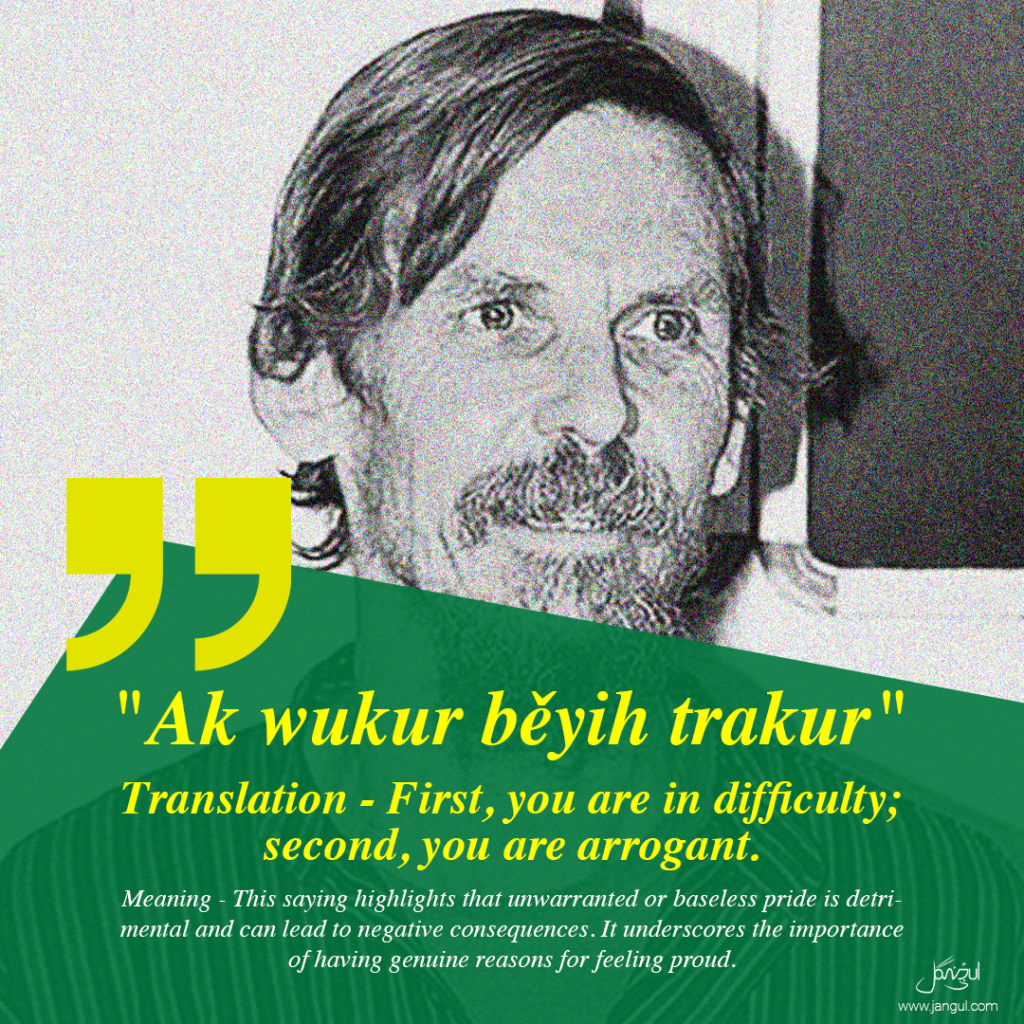
30. “Akhú khut hasis biyúkhá khastan dusih.”
Translation – One rode on an elephant, and another climbed the wall.
Meaning – One of the Kashmiri proverbs that signifies the dichotomy between social status and economic conditions.

31. “Aki sund dazih áb tah běyih sund dazih nah til.”
Translation – One can burn water, while another cannot even burn oil.
Meaning – This saying suggests that differing outcomes or abilities can often be attributed to luck or fate, underscoring the role of chance in determining individual successes or failures.

32. “Aki tsat sum tah sús gav kulih.”
Translation – One cut the bridge, and a thousand people fell into the river.
Meaning – One of the Kashmiri proverbs that depict the significant consequences that can result from the actions of a single individual, affecting a large group of people.

33. “Aki tsonḍ dunyú tah běyih aki ímún ; dunyá tah ímún chhik nah donawai athih yiwán.”
Translation – One pursued the world, and another sought faith; the world and faith do not fit in the same palm.
Meaning – One of the Kashmiri proverbs that contrasts the pursuit of material desires (worldly ambitions) with the pursuit of spiritual beliefs (faith), emphasizing that these two aspirations often conflict and cannot coexist harmoniously.
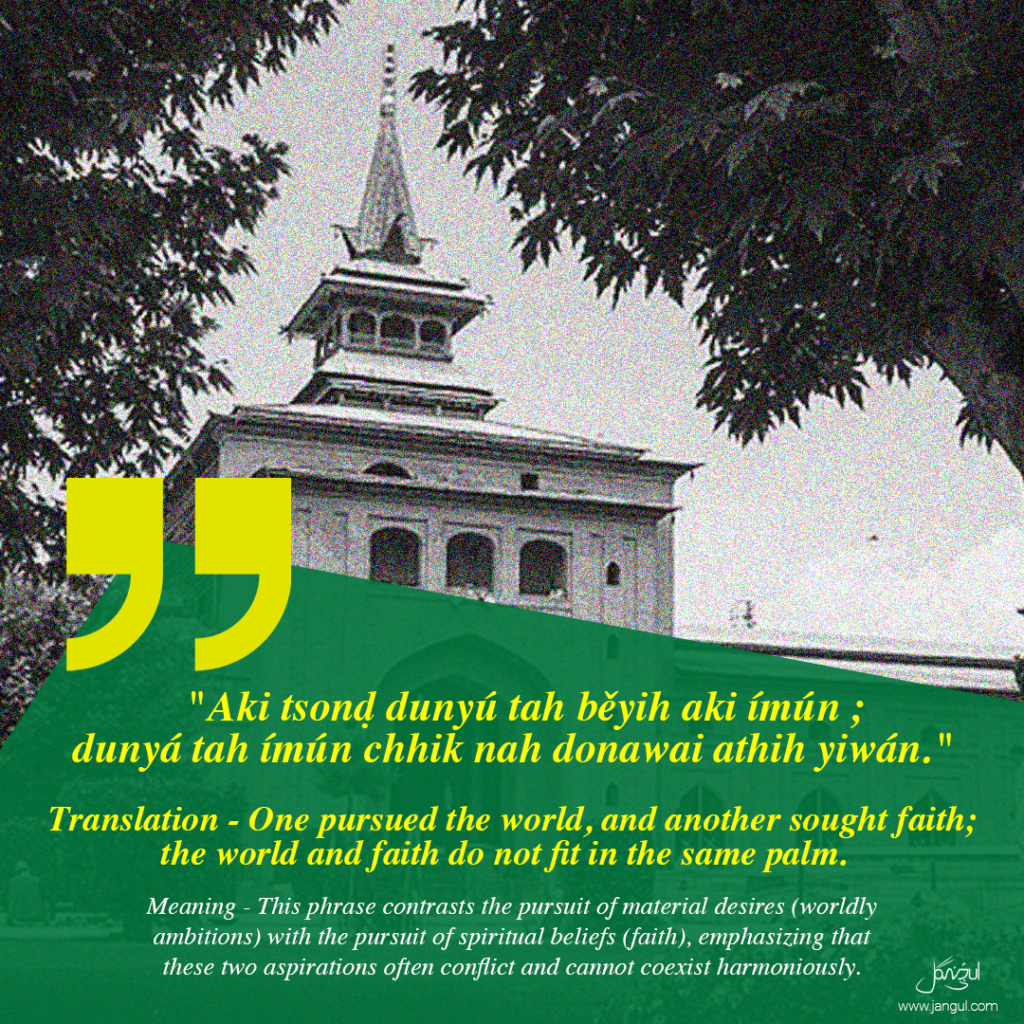
34. “Akis chhěh dazán dár tah byák chhus wushaniwún athah.”
Translation – One man’s beard is on fire, and another man warms his hands with it.
Meaning – One of the Kashmiri proverbs that illustrates the concept of deriving pleasure or benefits from another person’s misfortune, showing how some people might take advantage of a difficult situation for their own gain.
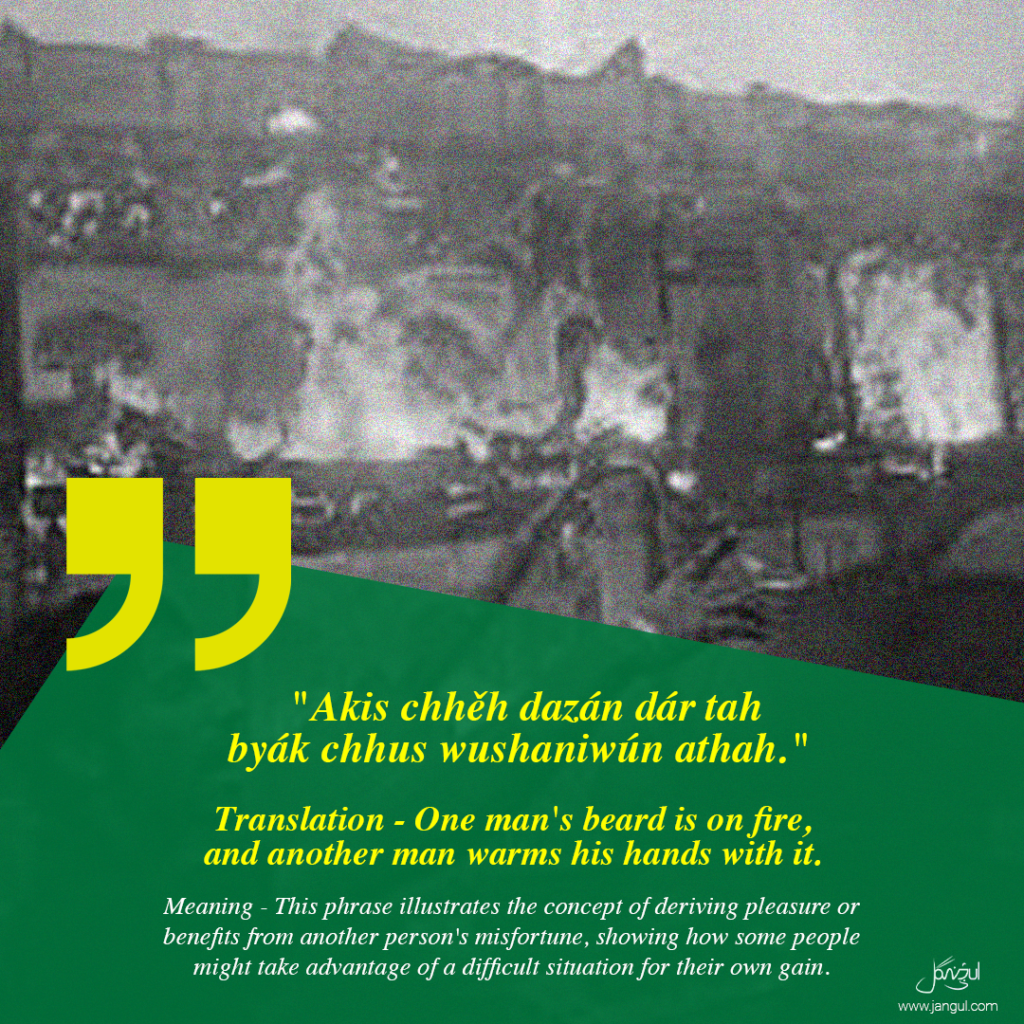
35. “Alah kulis tulah kul.”
Meaning – A mulberry tree from a pumpkin plant.
Meaning – This expression emphasizes the exaggeration or magnification of a small or insignificant issue into something much larger or grander, akin to turning a molehill into a mountain.
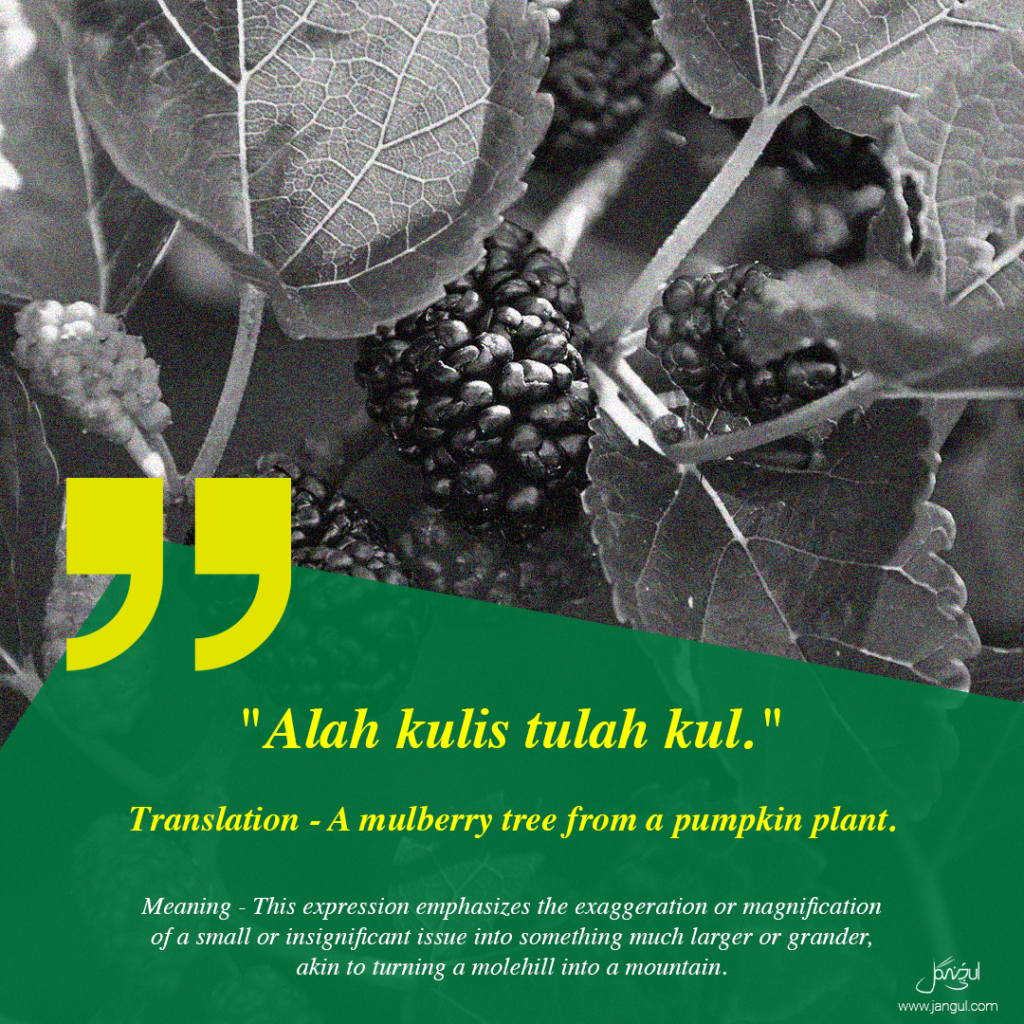
36. “Alah ruwuni wangan kaduni.”
Translation – Sowing pumpkins, harvesting eggplants.
Meaning – This saying conveys the idea of initiating a task or endeavor but failing to complete it, highlighting the importance of follow-through and commitment in one’s actions.
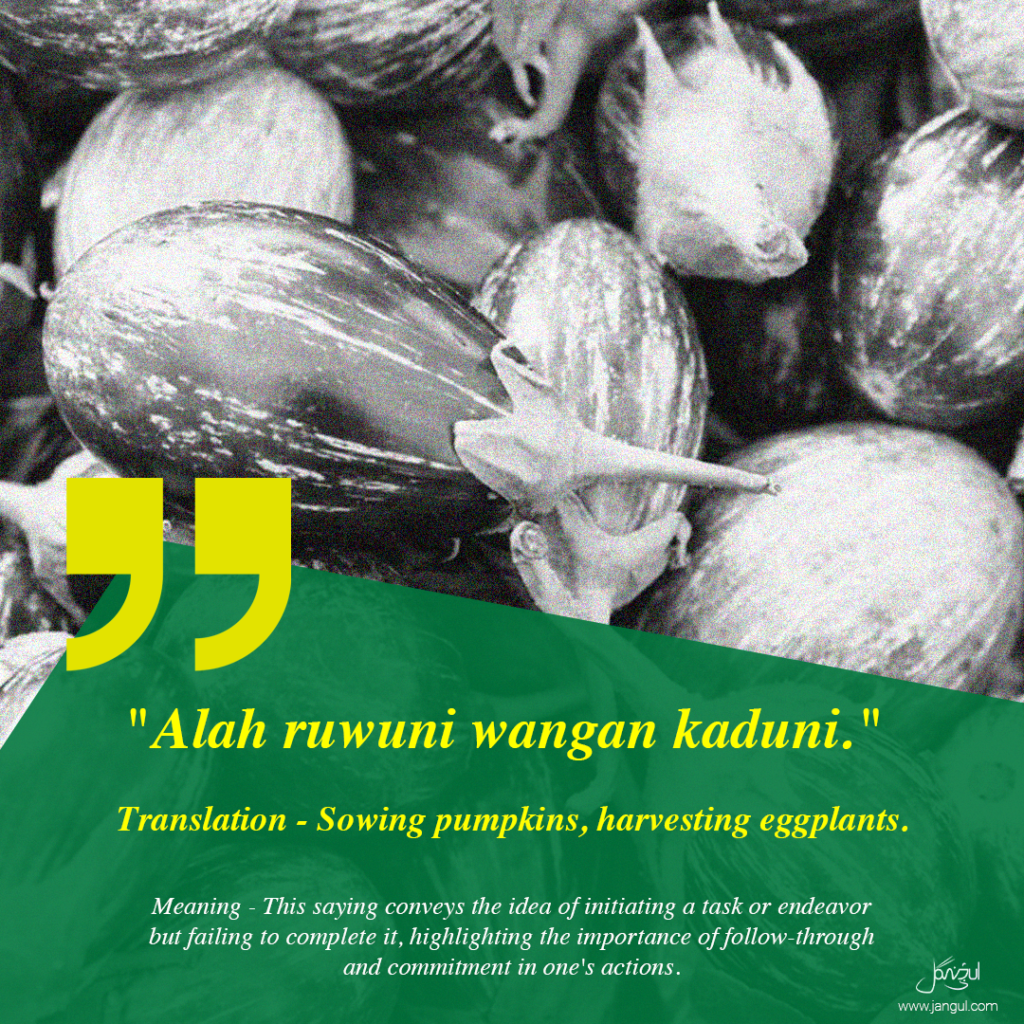
37. “Álan chhuh phal tah nindan chhuh dúnih.”
Translation – “To plow the field is to bear fruit, and to sow seeds is to have grains.”
Meaning – One of the Kashmiri proverbs that suggests that hard work and effort yield positive results, and productive actions lead to beneficial outcomes.
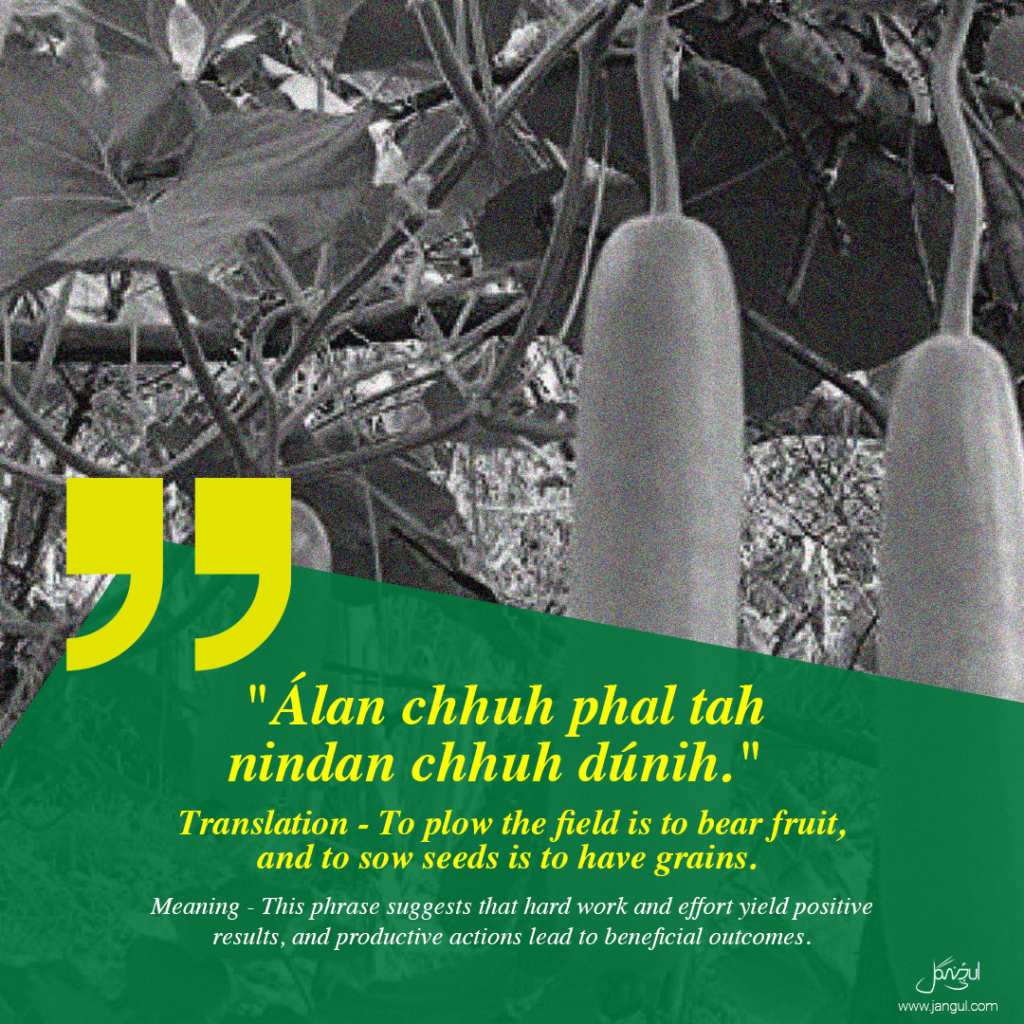
38. “Amanatas khiyánat.”
Translation – “Embezzling a trust.”
Meaning – One of the Kashmiri proverbs that underscores the gravity of betraying a deposit or entrusted responsibility, emphasizing that such an action is a significant wrongdoing, often accompanied by severe moral implications.

39. “Ámis dudas suět dabadab.”
Translation – Wrestling with raw milk.
Meaning – One of the Kashmiri proverbs that conveys the idea of engaging in conflict or argument with those who are vulnerable or powerless, highlighting the lack of honor or fairness in such behavior. It emphasizes the unimpressive nature of challenging those who are less capable or defenseless.
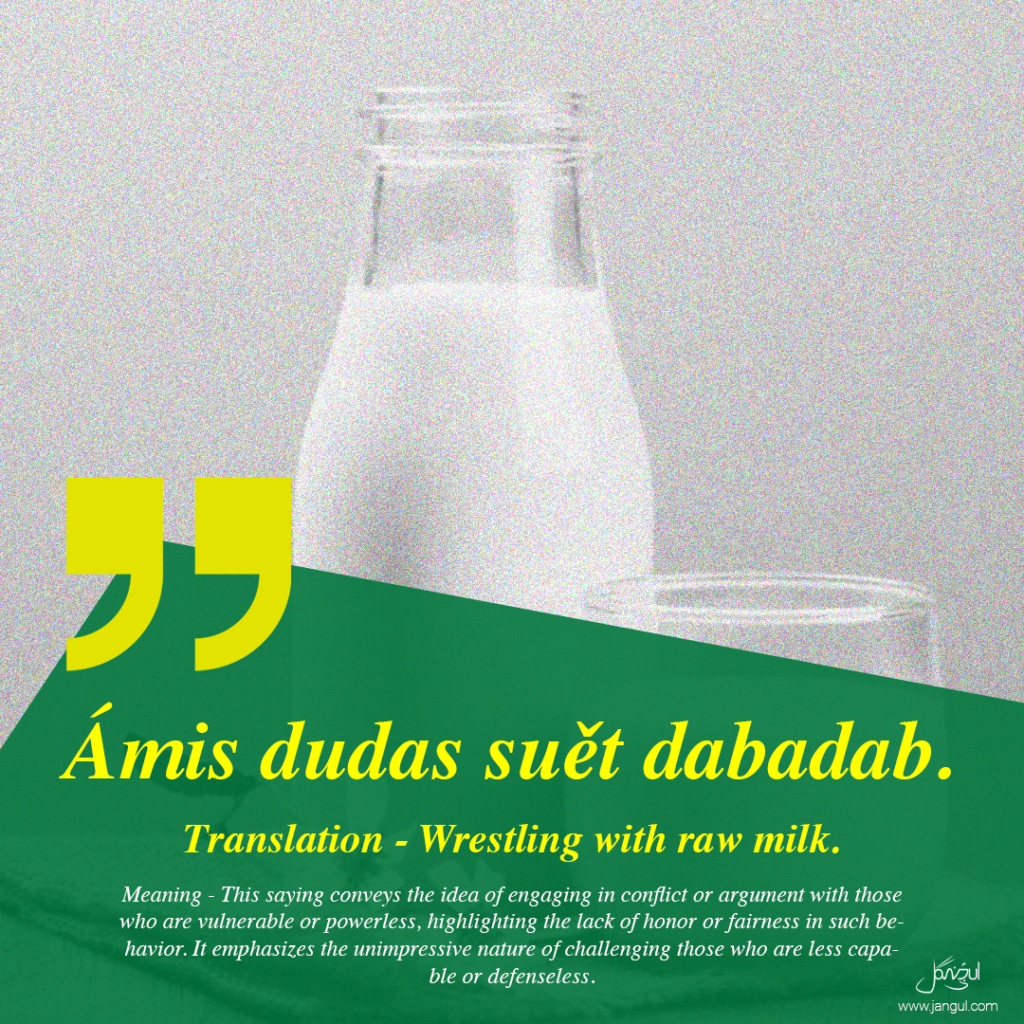
40. “Andari, andari, wot Tsandari gom.”
Translation – Secretly, secretly, he reached the village of Tsandar.
Meaning – This statement asserts that the person is genuinely facing significant trouble or hardship, emphasizing the sincerity of their challenging situation.
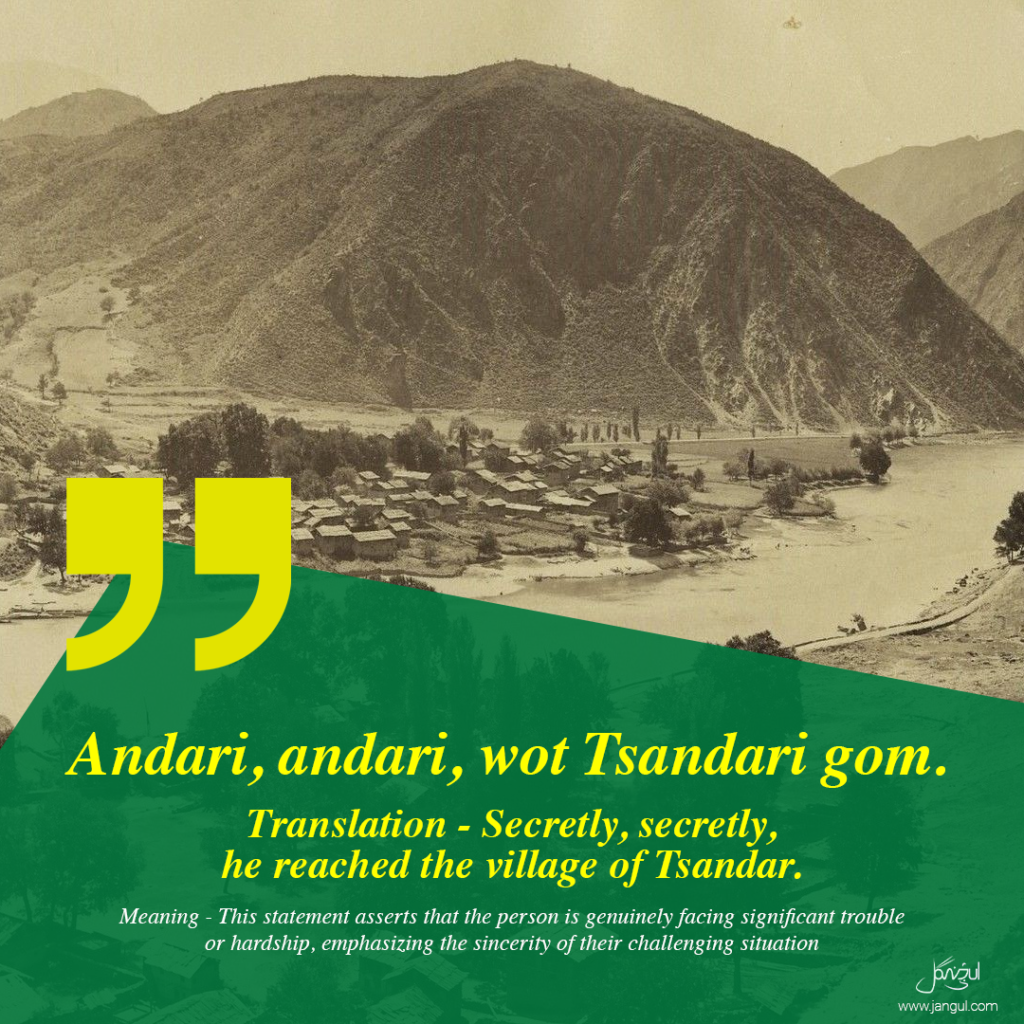
41. “Andarim dádi no mashinam marit Něbarim shudi kyah barah wúini buh?”
Translation – Shall I forget the pains of my heart, even after death? Shall I then long for worldly happiness?
Meaning – One of the Kashmiri proverbs that indicates a state of unwillingness or resistance to find solace or comfort, implying that the person is unwilling to accept consolation or relief from their distressing emotions.
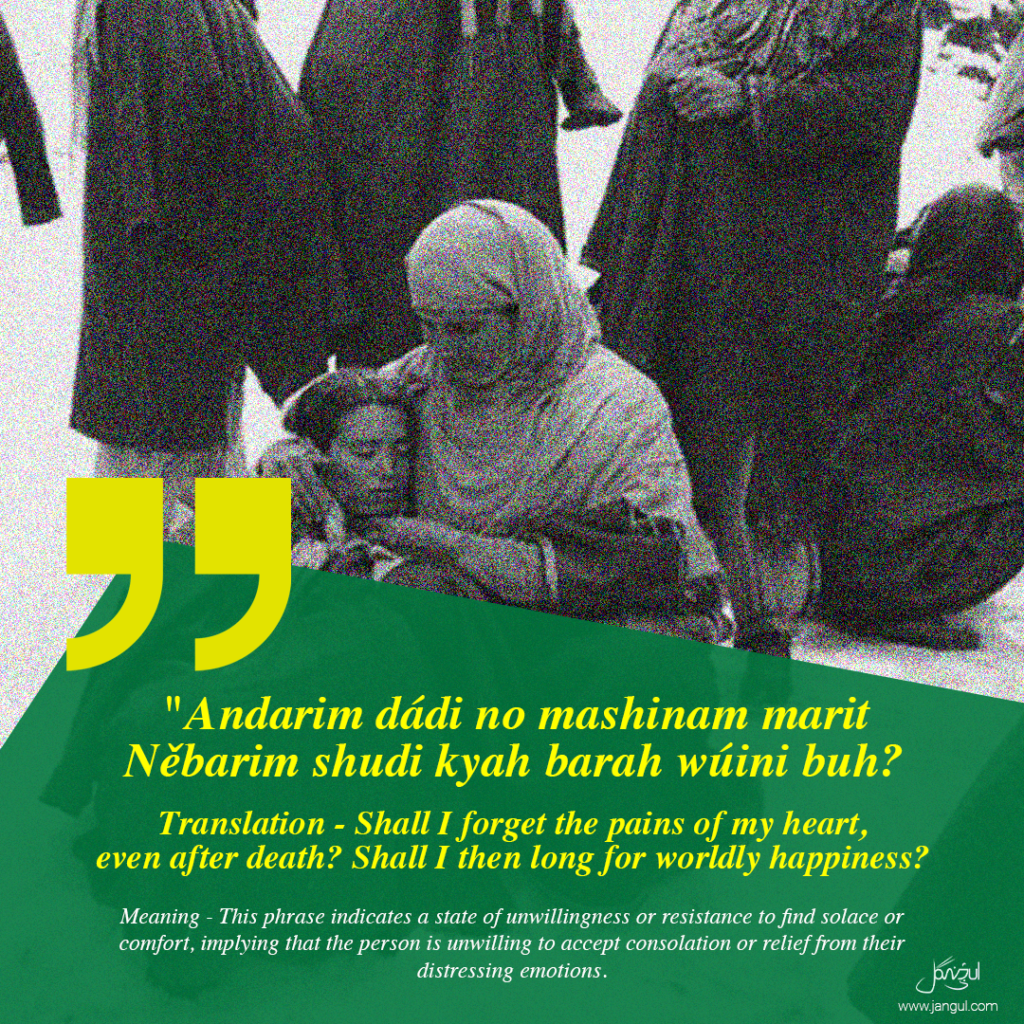
42. “Andarah dazaan paanah tah něbarah dazán luk”
Translation – Inside he himself burns, and outside the people burn.
Meaning – This phrase describes a situation where a person is suffering internally while appearing prosperous on the outside. The person’s inner struggles are hidden, and others envy their perceived success.
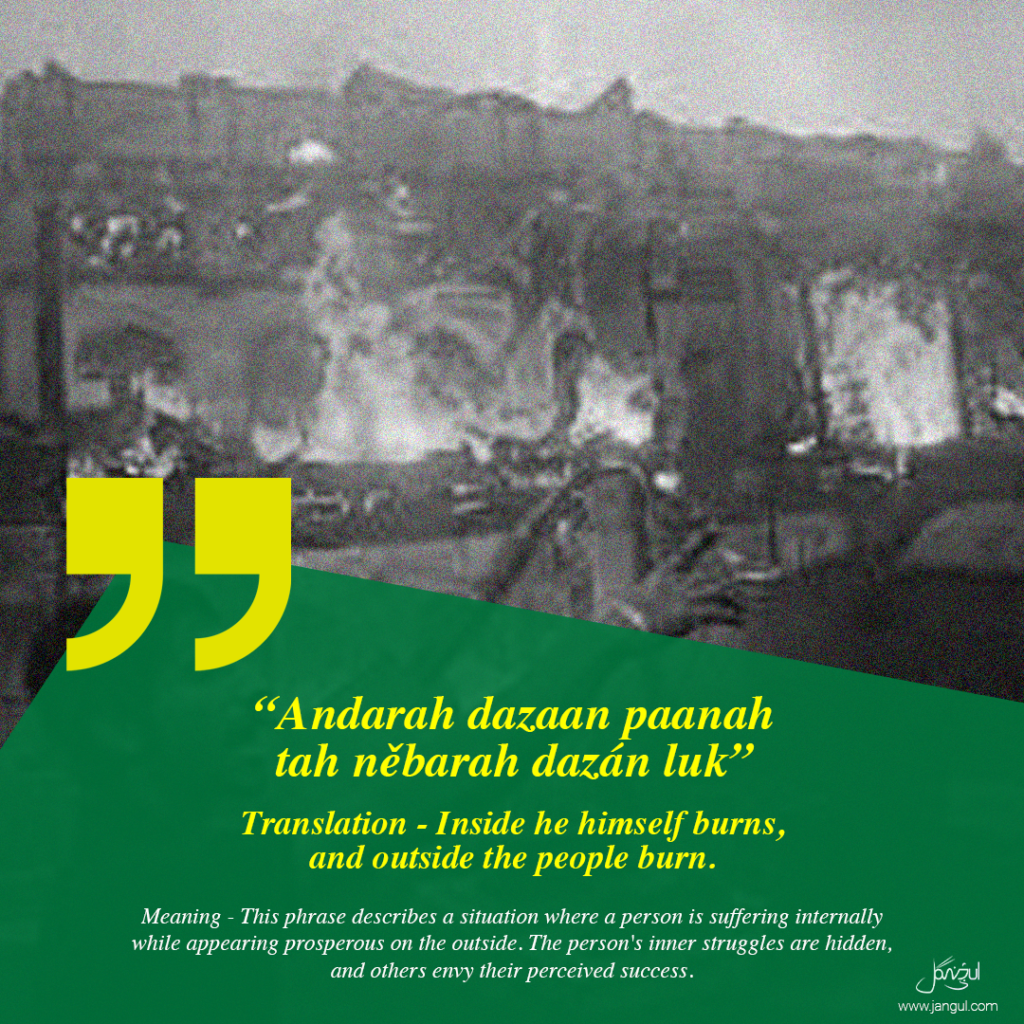
43. “Anis rút tah doh hčhu”
Translation – Night and day are the same to the blind man.
Meaning – One of the Kashmiri proverbs that conveys that someone who is unable to perceive or understand a situation remains unaffected by its changes or differences. Just as a blind person cannot distinguish between day and night, similarly, someone unaware or oblivious remains unaffected by variations.
Kashmiri proverbs
44. “Antan tah háwanai”
Translation – Bring it to me and I’ll show it to you.
Meaning – This phrase is used as a sharp retort when someone expresses surprise that another person hasn’t encountered or heard about a particular individual or object. It implies that if the person in question provides the subject, they will be enlightened.
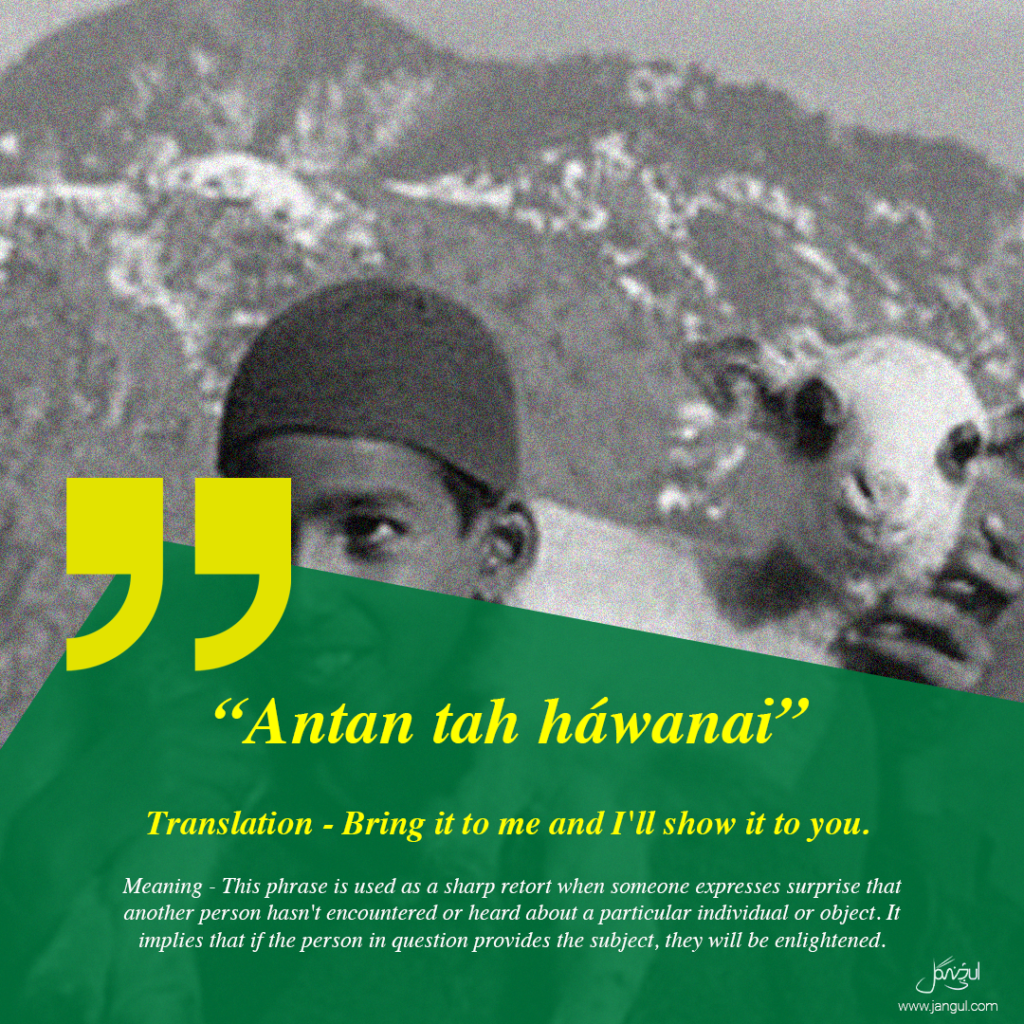
45. “Aris púnas drakah”
Translation – A leech to a healthy body.
Meaning – One of the Kashmiri proverbs that conveys the idea of enduring pain or hardship on behalf of others, often as an act of sacrifice or selflessness.
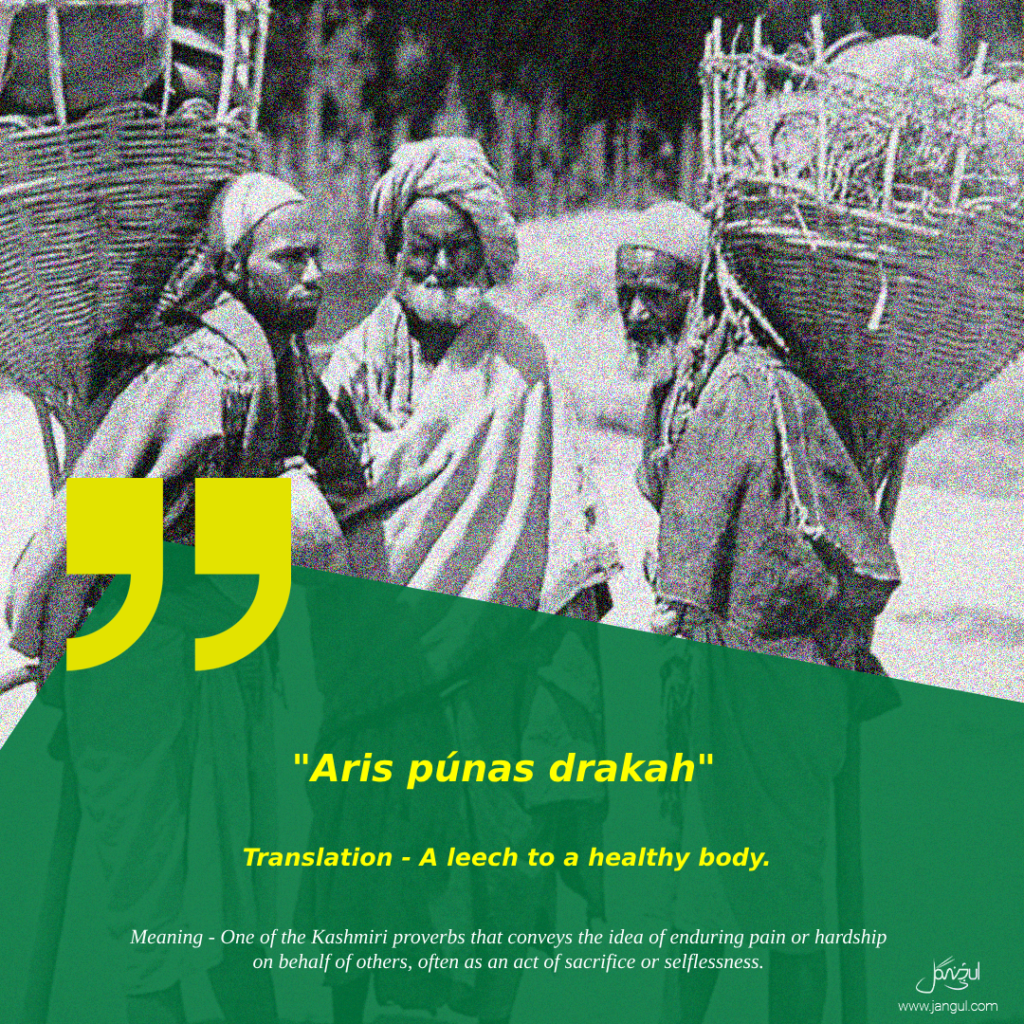
Kashmiri proverbs
46. “Asan ai tah lasah kitah púṭhi?”
Translation – If I laugh not, how can I live?
Meaning – One of the Kashmiri proverbs that reflects the importance of joy and laughter in one’s life. It suggests that the ability to find happiness and laughter is essential for a fulfilling and meaningful existence. It implies that without the positive and uplifting aspect of laughter, life might feel dull or incomplete.

Kashmiri proverbs
47. “Asas mazah tah yaḍ dazah- dazah”
Translation – A taste in the mouth and a burning in the stomach.
Meaning – This phrase indicates that the experience described above is sufficient to arouse interest, curiosity, or desire for more, but not enough to fully satisfy or satiate. It serves as an analogy to situations where a small taste or glimpse of something leaves a person wanting more.

48. “Ashraf gav sui yas ashrafí ásih.”
Translation – The man with the gold is the gentleman.
Meaning – This phrase implies that in certain contexts, wealth or material possessions can often grant someone social respect or perceived nobility. It suggests that having wealth or resources can elevate one’s status and be equated with being a gentleman, at least in the eyes of some. However, it might also carry a critical tone, pointing out the superficiality of such judgments based solely on material wealth.
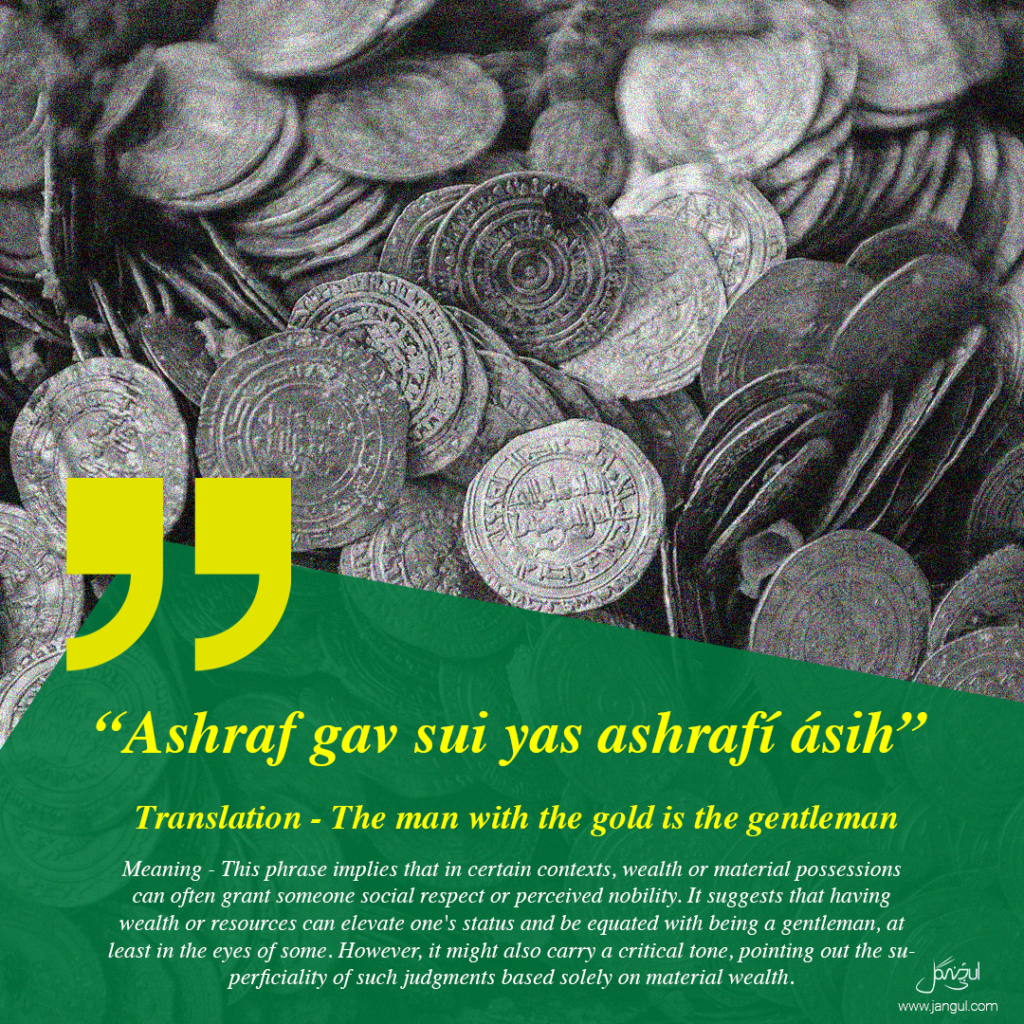
49. “Ásmánah pyav tah zaminih logus dab”
Translation – He fell from heaven to earth and is wounded.
Meaning – One of the Kashmiri proverbs that conveys that the larger or more elevated a structure is, the more significant the impact or destruction when it collapses. Similarly, the downfall of individuals or institutions with significant stature can lead to more profound consequences. It emphasizes the notion that a great height can result in a more impactful fall.
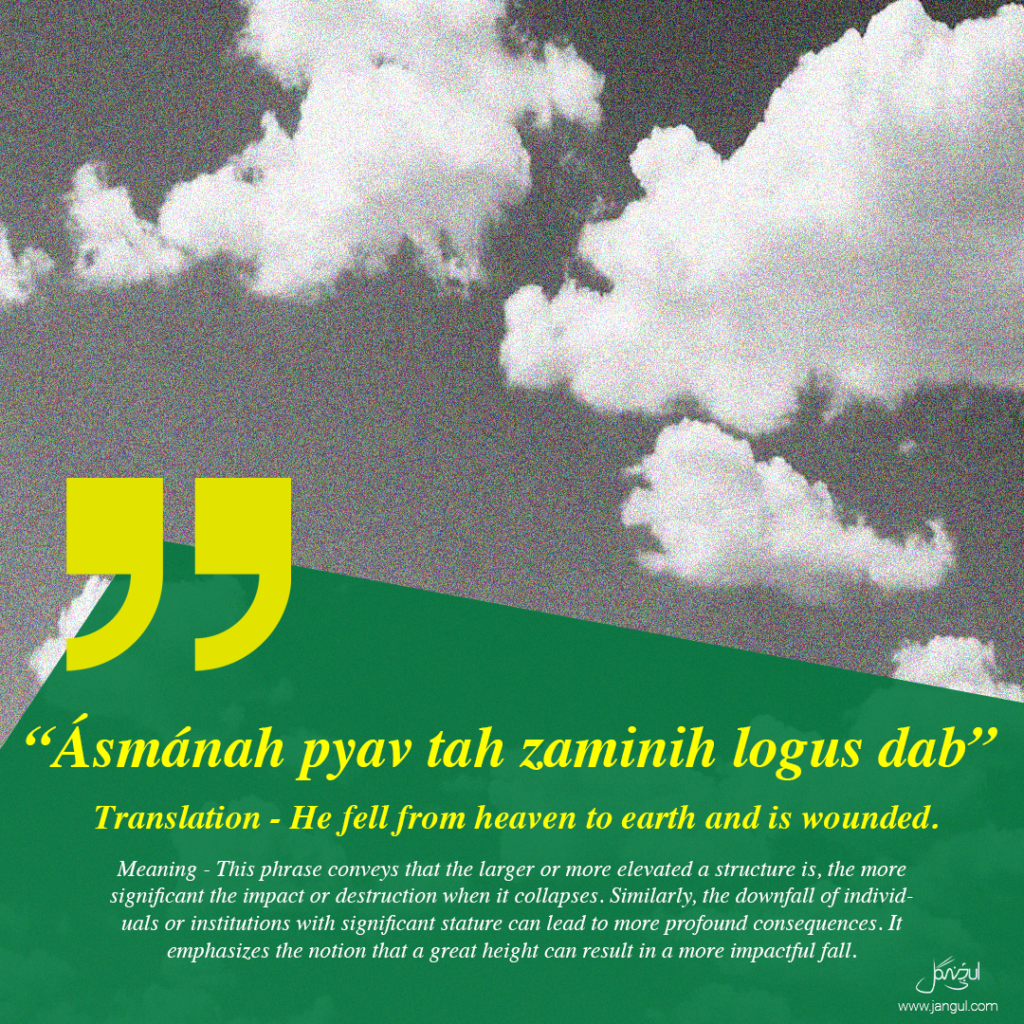
50. “Ásun chhuh hěchhinúwán nah úsun chhuh mandachháwún.”
Translation – To be (wealthy) teaches, not to be (wealthy) makes us ashamed.
Meaning – This phrase suggests that experiencing wealth and prosperity can provide valuable lessons and insights, teaching individuals about success, management, and responsibility. On the other hand, lacking wealth does not bring shame; it should not lead to embarrassment or feelings of inadequacy. The saying highlights the positive attributes of both having and not having wealth, emphasizing that each situation carries its own set of lessons and values.

51. “Asun chhuh kharas khasun”
Translation – It is a shame to laugh (immoderately).
Meaning – One of the Kashmiri proverbs that conveys the idea that a certain type of laugh can reveal or indicate a lack of understanding, knowledge, or depth of thought. It implies that a superficial or empty laugh might signify a lack of intellectual engagement or genuine comprehension.

52. “Athah ditam bronṭhah yitam.”
Translation – Give me your hand and come in front of me.
Meaning – One of the Kashmiri proverbs that indicates a willingness to help or assist someone, often in a physical or practical manner. It suggests offering aid or support to someone in need or during a challenging situation.
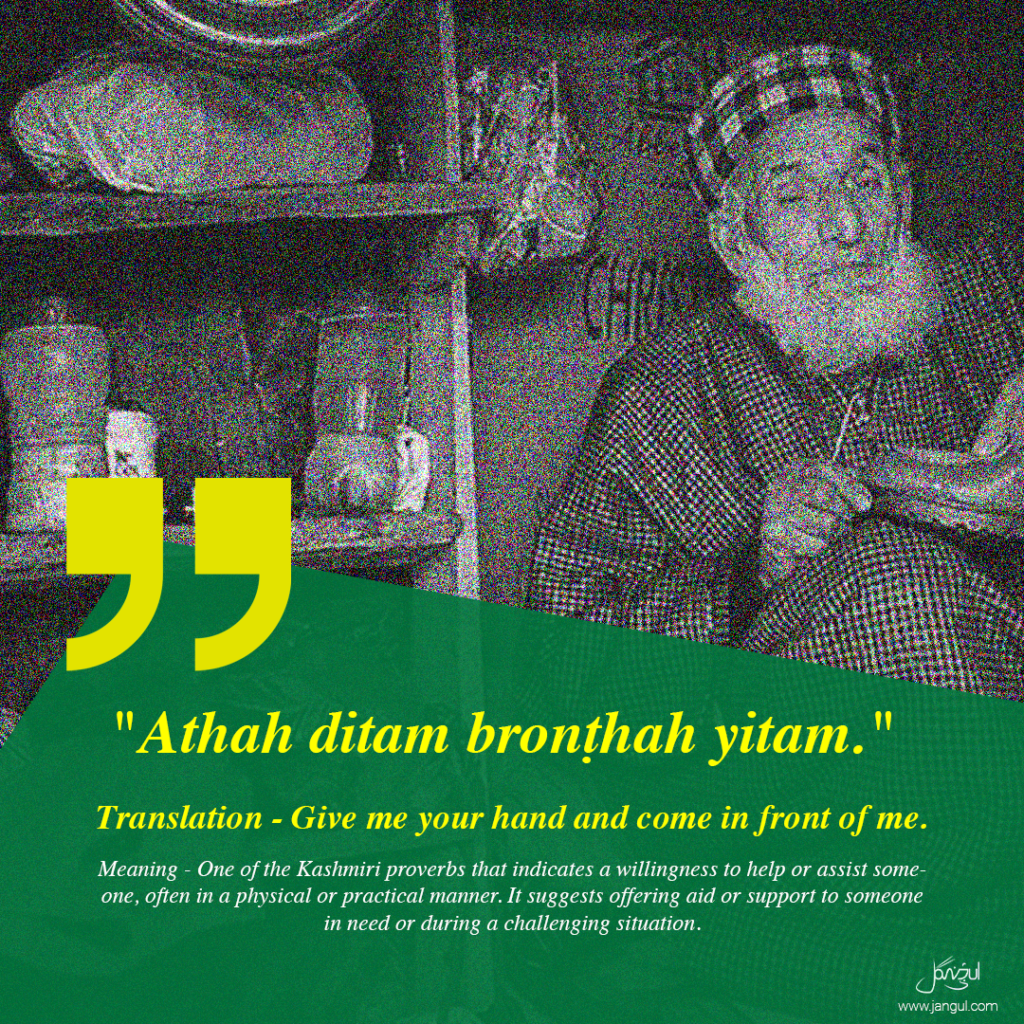
53. “Awah,” layih pantsah tah “Nah” layih lachh”
Translation – “Yes” is worth Rs. 50 and “No” is worth a lakh.
Meaning – This phrase conveys the idea that sometimes, the refusal or rejection (saying “No”) from certain individuals holds more value or significance than the agreement or affirmation (saying “Yes”) from others. It implies that the judgment or opinion of specific people carries more weight or importance due to their reputation, authority, or expertise.
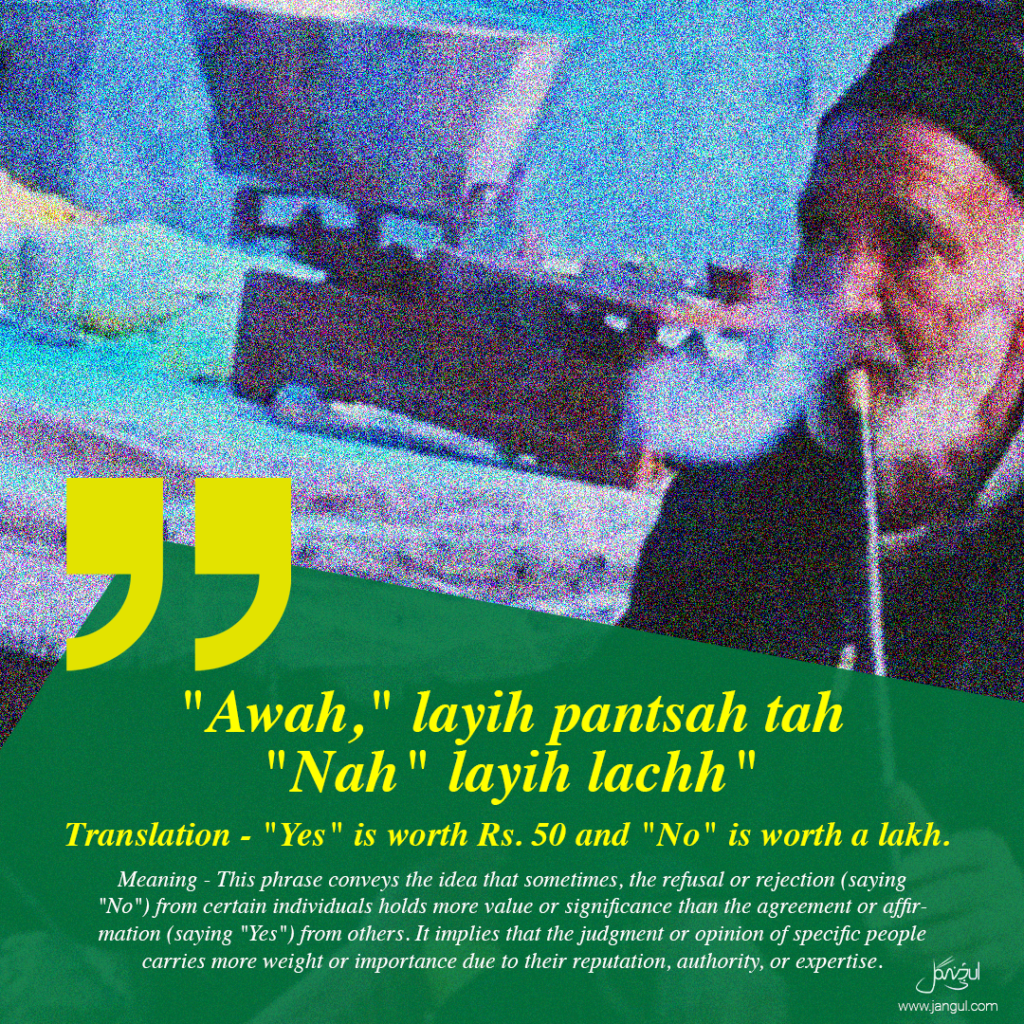
54. “Áyih wúnis gayih kúndris.”
Translation – She came to the banya’s but arrived at the baker’s
Meaning – One of the Kashmiri proverbs that is used to describe a situation where someone’s actions or intentions result in a completely unexpected or unintended outcome, often missing the intended target or goal.

55. “Az nah tah, adah kar”
Translation – Not today, when then?
Meaning – This phrase is used to emphasize the importance of taking action promptly and not procrastinating. It suggests that if something needs to be done, it should be done without delay.

56. “Búbah, budatham tah khidmatah kartam”
Translation – O father, become old and serve me.
Meaning – One of the Kashmiri proverbs that is used to illustrate the unfortunate reality where some elderly parents, despite their age and need for care, end up serving or being dependent on their children or family members.
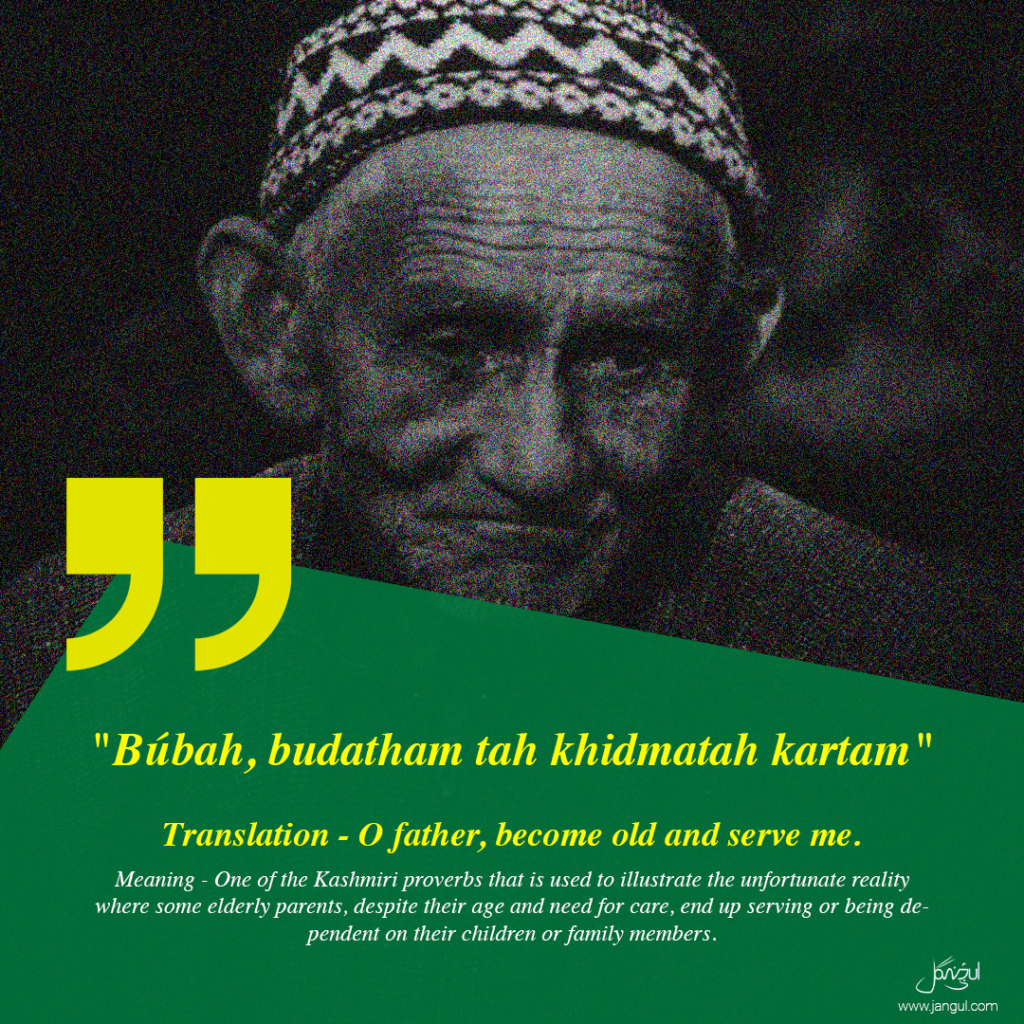
57. “Bachih dod chhuh lachih dod”
Translation – A child’s pain is a hundred thousand pains.
Meaning – This phrase emphasizes the intensity and significance of a child’s suffering or pain. It suggests that the pain experienced by a child is magnified and holds greater emotional weight due to their vulnerability and innocence. The phrase highlights the idea that the distress of a child is particularly poignant and should be treated with utmost care and consideration.
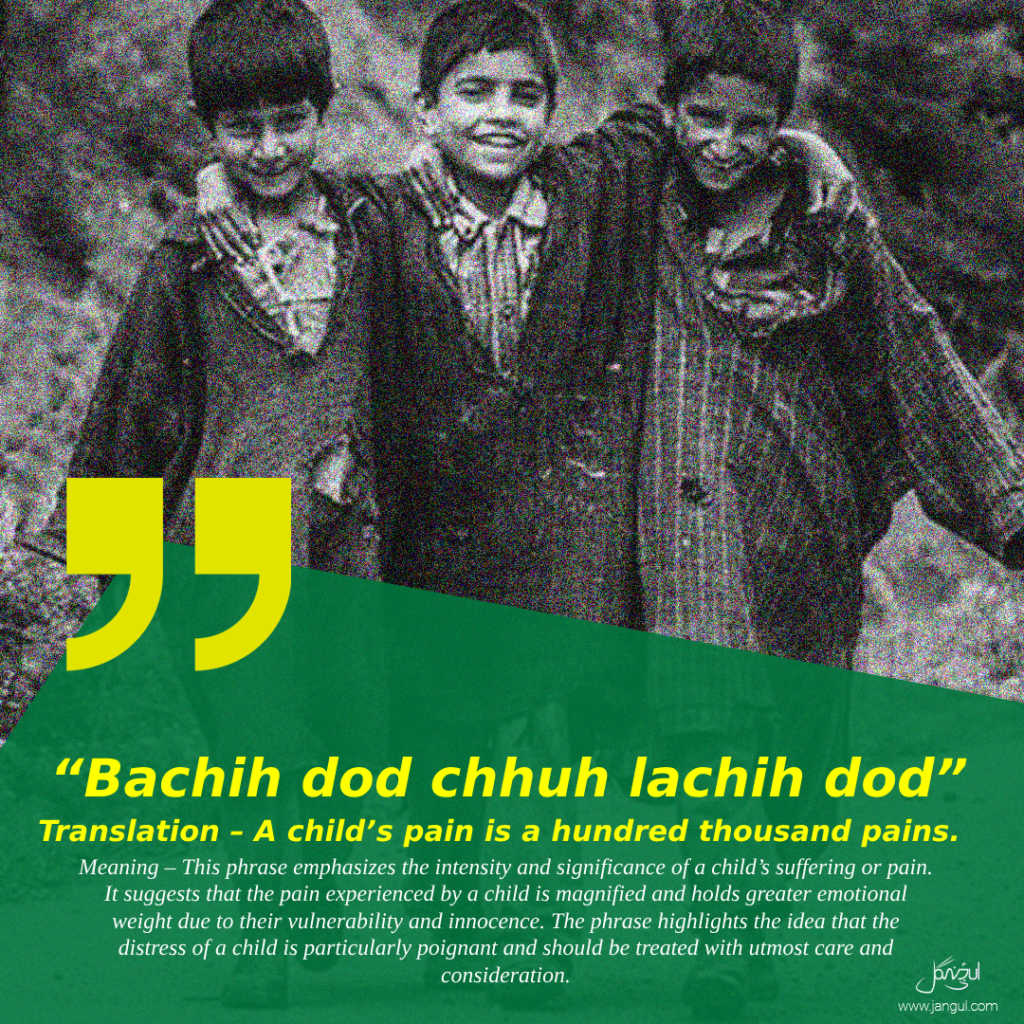
58. “Baláí dúr tah khair kabúl.”
Translation – May misfortune be far from you and prosperity nigh.
Meaning – One of the Kashmiri proverbs that is a Kashmiri blessing or well-wishing expression. It conveys the hope that difficulties and misfortunes stay distant from you, while good fortune and prosperity come close. It reflects a genuine wish for a positive and prosperous life for the person being addressed.

59. “Band kus? Zih chandah”
Translation – Who is (your) friend? (Your) pocket.
Meaning – This phrase implies that in times of need or difficulty, one’s own resources, particularly financial ones, become their true friend. It underscores the idea that material possessions, like money, often play a significant role in determining relationships and associations.

60. “Bángis chhčh búng dapun.”
Translation – It is the work of the Muazin to call the Azaan.
Meaning – Every man to his own work.
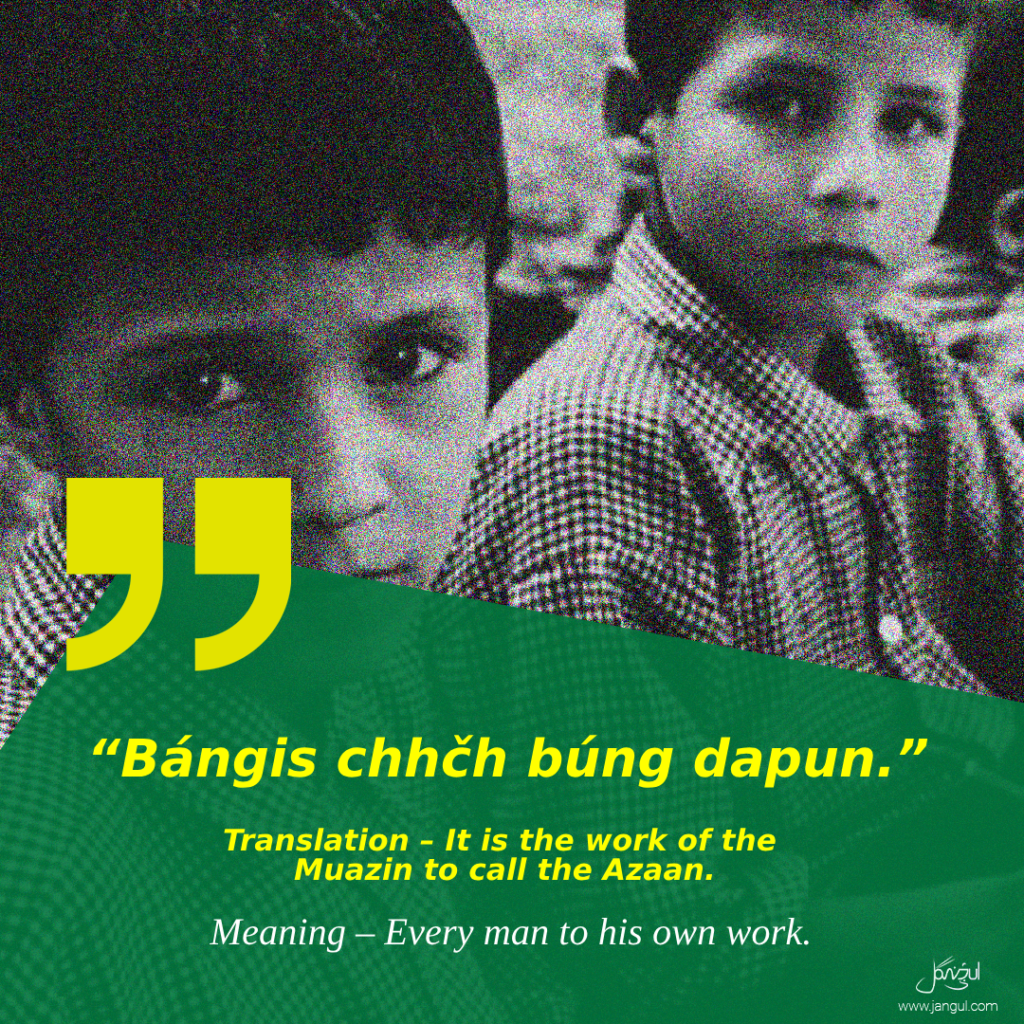
61. “Bechán tah guris khasit!”
Translation – Begging and riding upon a horse!
Meaning – This phrase describes an individual who maintains a sense of pride or arrogance despite their disadvantaged or dependent status, such as someone who begs for assistance or support. It highlights the paradoxical combination of humility and self-importance, suggesting that the person’s outward behavior contradicts their actual circumstances.

62. “Be-hayáhas sharm dúr.”
Translation – To the shameless shame is distant.
Meaning – One of the Kashmiri proverbs that conveys that individuals who lack a sense of shame or embarrassment are unaffected by feelings of disgrace or humiliation. It suggests that those who are shameless do not experience the emotional discomfort that would typically arise from socially unacceptable behavior or actions.
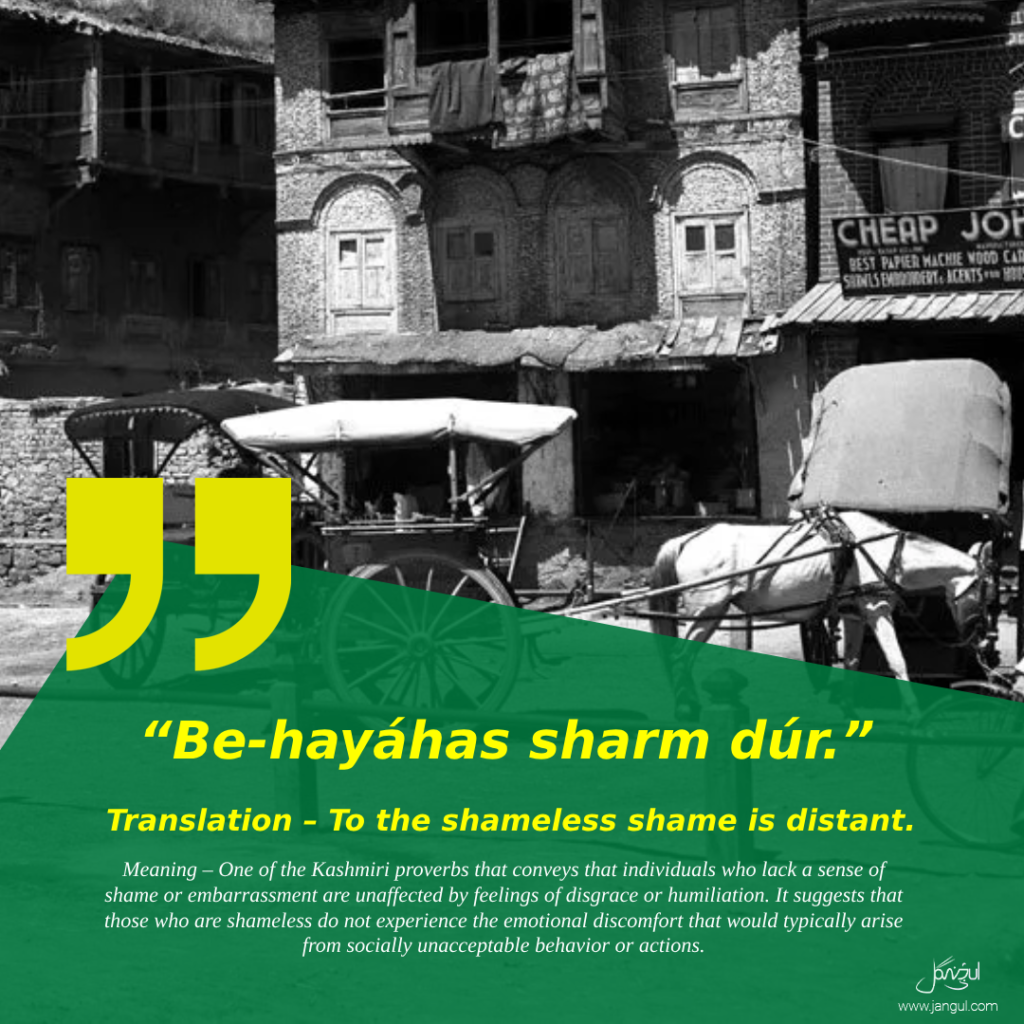
63. “Be-kir chhuh běmár.”
Translation – The unemployed, or idle man, is sick.
Meaning – This phrase suggests that idleness or unemployment can have negative effects on a person’s well-being, similar to an illness.
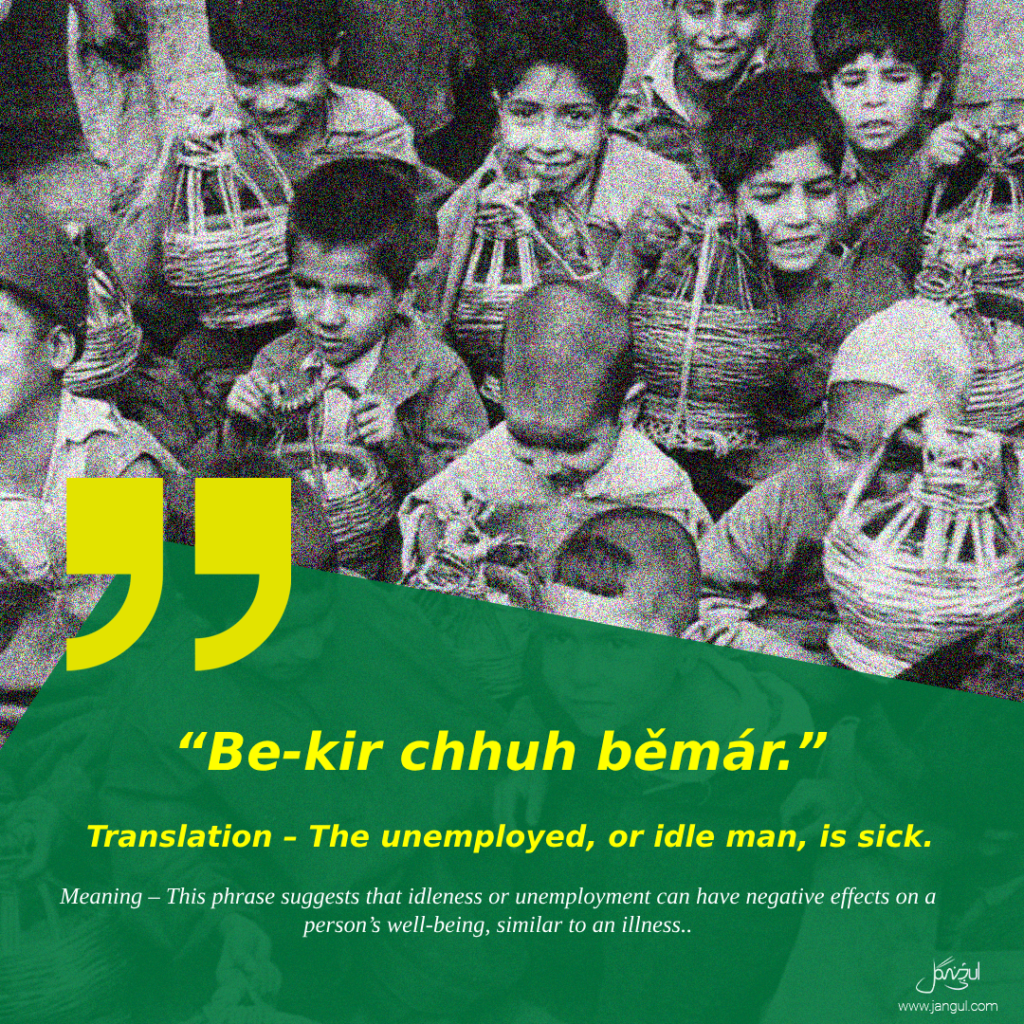
64. “Be-kár chhuh wakili har darbúr.”
Translation – An unemployed man visits every darbár.
Meaning – This phrase humorously points out that someone who is unemployed or idle often has the time and inclination to frequently visit social gatherings or events. It implies that individuals without a job may have more availability to attend various gatherings, indicating that their lack of employment allows them to be present on such occasions.

65. “Be-káras chhih trah kár.”
Translation – To the idle man there are three works (viz., sleeping, quarreling, and eating).
Meaning – This phrase highlights the tendency of idle or unemployed individuals to engage in unproductive or detrimental activities. It humorously suggests that those with free time often end up doing things that may not contribute positively to their well-being or the well-being of others, such as sleeping excessively, getting involved in quarrels, or overeating. It emphasizes the importance of keeping oneself engaged in constructive tasks and responsibilities.

66. “Be-málas ailah.”
Translation – Cardamoms for the man who is not hungry.
Meaning – This phrase is used to express irony or humorously criticize someone who is indulging in luxuries or unnecessary pleasures when they are not even in a state of need or hunger. It points out the absurdity of spending resources on non-essential items when basic needs are already fulfilled.
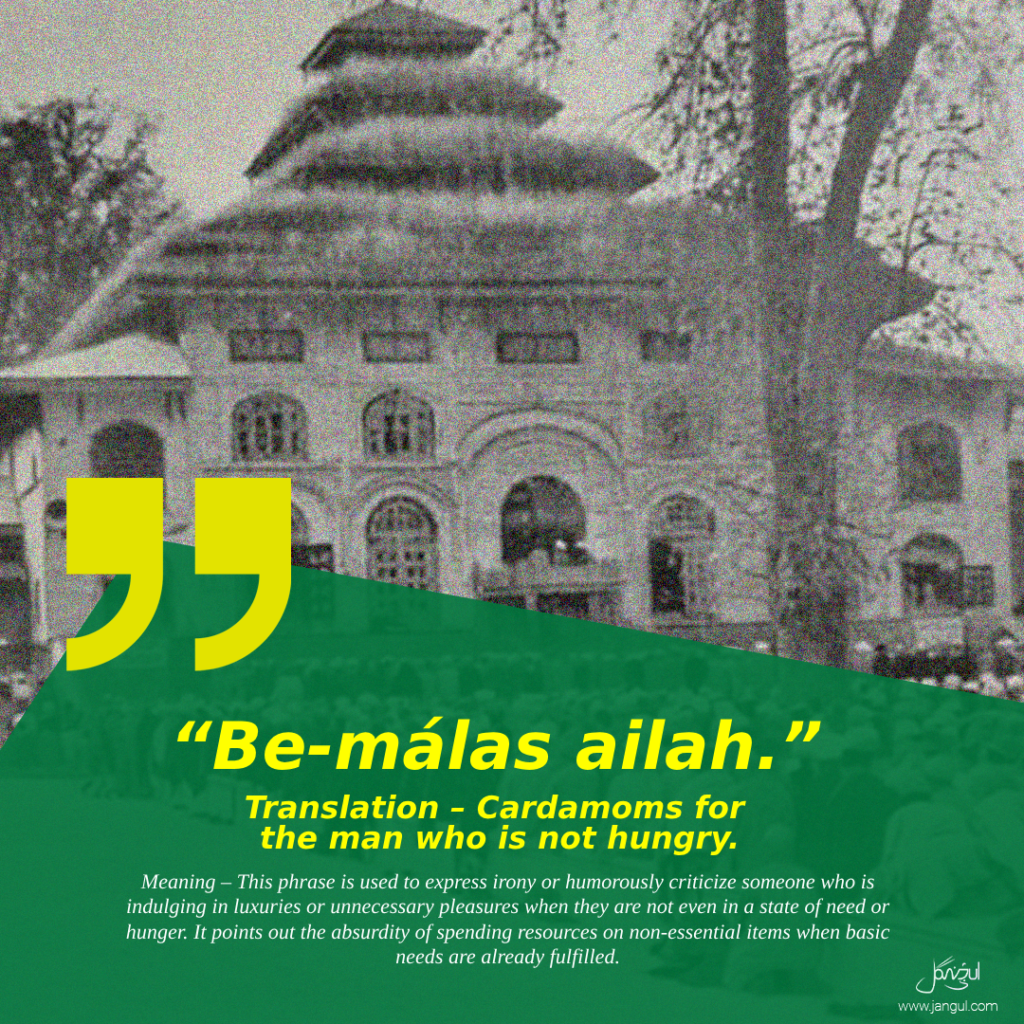
67. “Běyih sund amánat chhuí khárawánuk núrah tungul hyuh.”
Translation – Another’s belongings in your charge is like a live coal from the blacksmith’s shop.
Meaning – This phrase conveys the idea that being entrusted with someone else’s property or possessions is a responsibility that requires careful handling and attention. Just as live coal from a blacksmith’s shop is hot and potentially dangerous, taking care of someone else’s belongings carries risks and requires vigilance to prevent any harm or damage. It emphasizes the importance of being trustworthy and responsible when entrusted with the property of others.
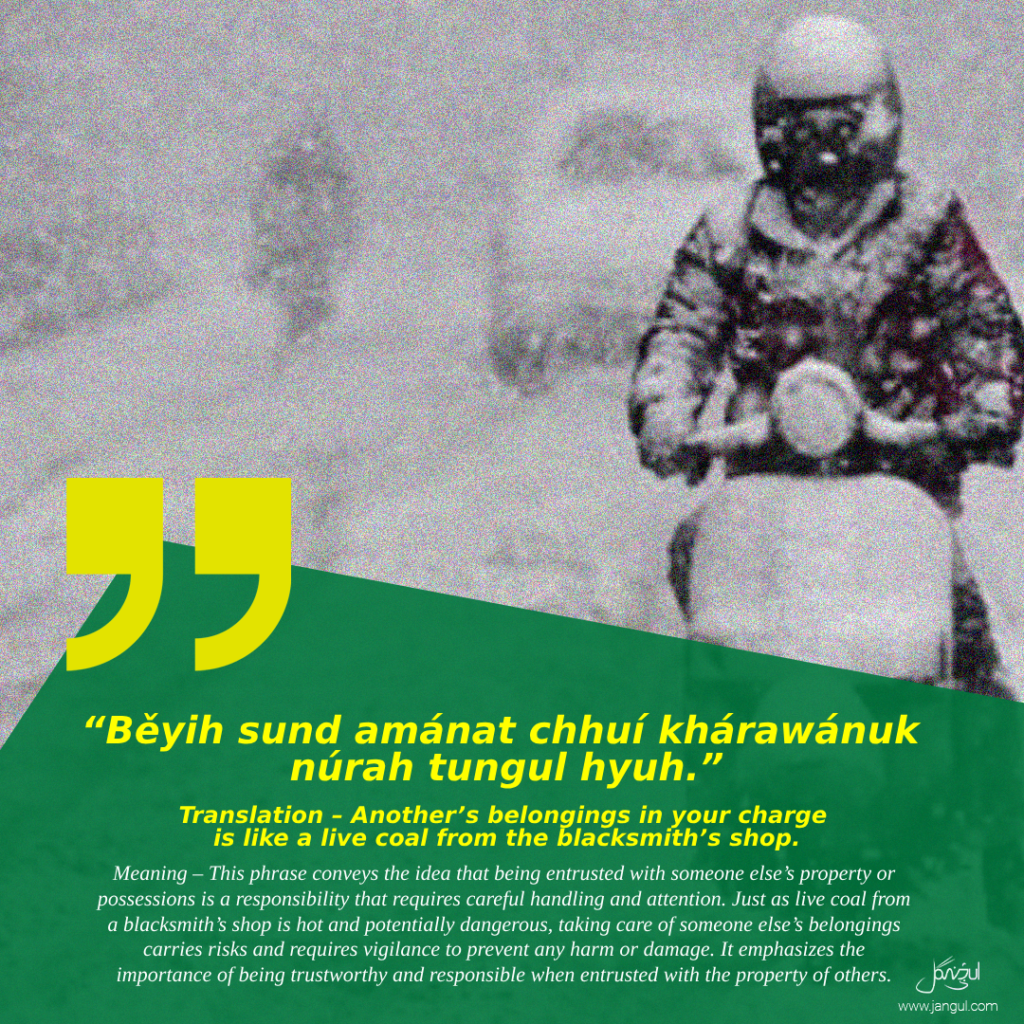
68. “Běyih sund dod chhui be-múne ; Yas akhis banih tai suí záne.”
Translation – Another’s pain is without meaning. Only he, who suffers it, knows what it is like.
Meaning – This couplet emphasizes that experiencing someone else’s pain or suffering may not be truly understood or appreciated by others. Only the person who endures the pain can truly comprehend its nature and impact. It underscores the idea that empathy and understanding are often limited when it comes to comprehending the depth of another person’s suffering.

69. ” Bod myund gatshih khyun tah bad kath gatshih nah karani.”
Translation – You must eat a big mouthful, but you mustn’t do much work.
Meaning – One of the Kashmiri proverbs that is spoken sarcastically to criticize a lazy or idle individual who appears eager to consume resources without contributing meaningful effort or work.
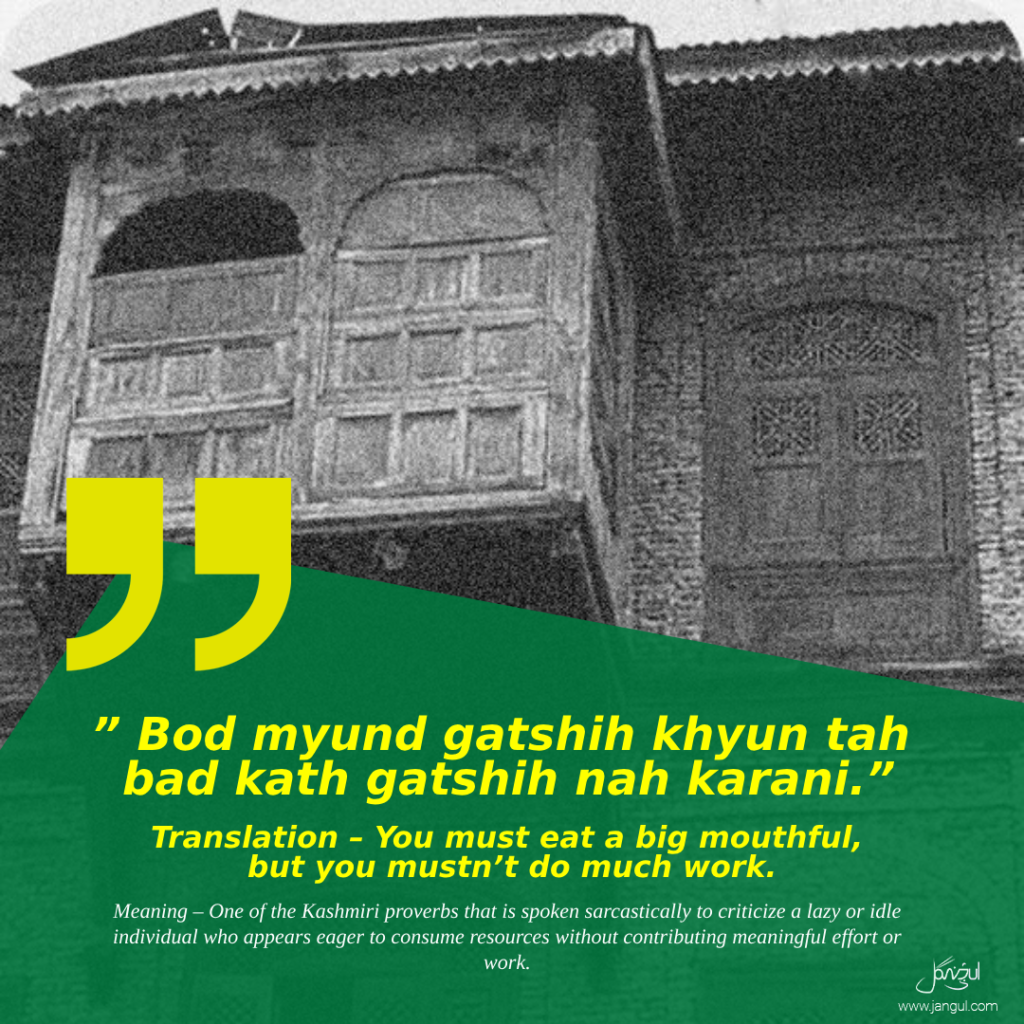
70. “Boi gav kini binih gayih thani.”
Translation – Brother is (hard like) a stone, and sister is (soft as) butter.
Meaning – This phrase draws a comparison between the characteristics of a brother and a sister. It suggests that brothers are often perceived as strong, resilient, and unyielding like a stone, while sisters are seen as gentle, tender, and affectionate like butter. The phrase highlights the contrast in personality traits typically associated with siblings of different genders.

71. “Bozit zur tah dishit un.”
Translation – Be as the deaf man hearing and the blind man seeing.
Meaning – This phrase provides paternal guidance to a child, encouraging them to act as if they are unaware of certain matters. It suggests that it is sometimes wise to avoid reacting to or engaging with certain information or situations, just as a child might be advised by a parent to remain unaware or unaffected by certain things. It emphasizes the value of discretion and selective involvement.

72. “Bror wuchhit gatshih ‘bishtah’ khasun.”
Translation – When he sees a cat, he must cry “bishtah.”
Meaning – This statement questions the effectiveness of criticizing or threatening someone when they are not present to hear or respond. It suggests that addressing issues directly and openly with the person involved, rather than making comments or complaints behind their back, is a more constructive approach. It highlights the importance of addressing concerns and conflicts directly and transparently.

73. “Budan tah lokaten hunz khidmat gatshih nah karuni.”
Translation – Do not enter the service of the old or the young (because the old will soon die, and the young do not remember).Meaning – This phrase advises against engaging in service or assistance for either the elderly or the very young. It provides two reasons: Firstly, the old are expected to pass away relatively soon, making long-term service less practical. Secondly, the young may not retain a memory of your help or may not fully appreciate it due to their lack of understanding or awareness. The phrase suggests considering the practicality and impact of your service before committing to it.
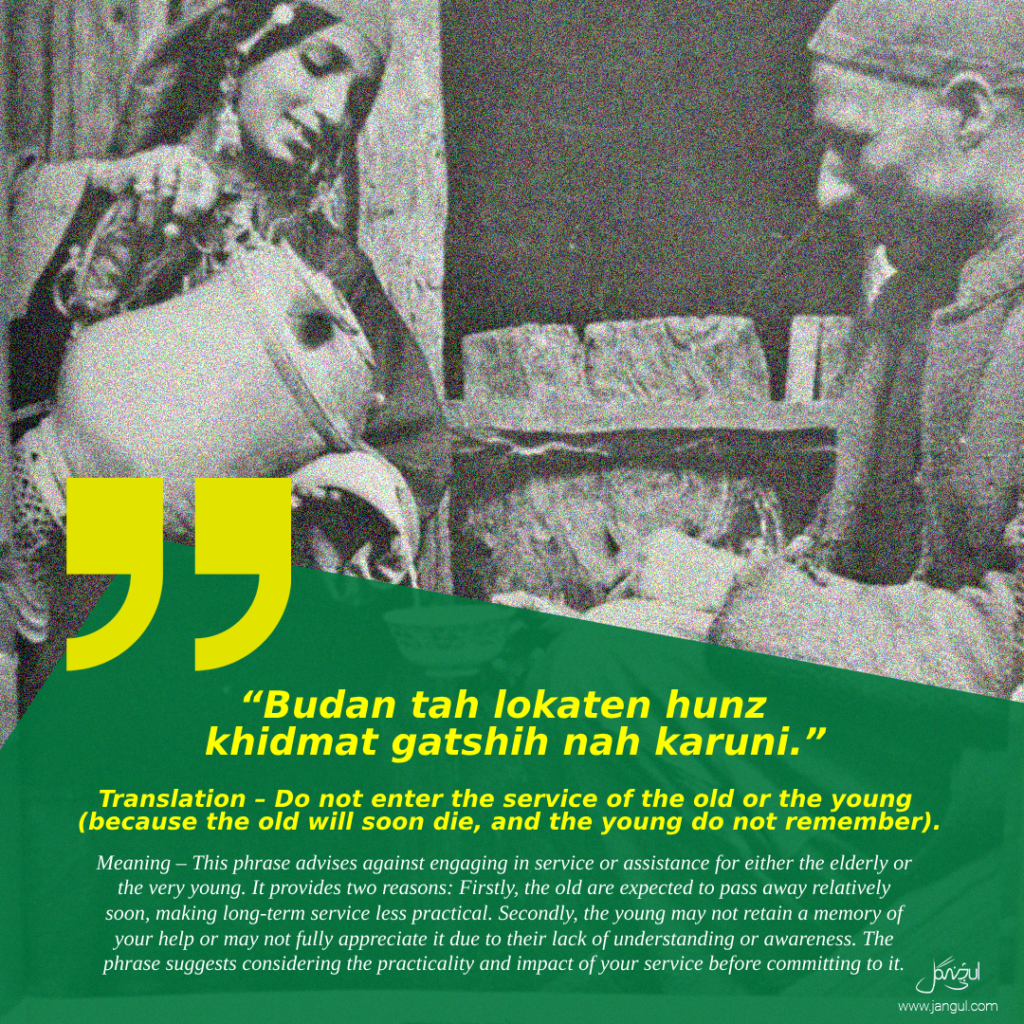
74. “Bun kun wuchhit tsun kun nazar.”
Translation – (Apparently) looking below, but (really) seeing in every direction.
Meaning – This phrase describes someone who appears to be focused on a specific task or aspect, but in reality, is vigilant and aware of everything happening around them. It implies a shrewd and attentive nature, suggesting that the person is observant and able to perceive a wide range of details and situations even while appearing to concentrate on a single matter. The phrase highlights the ability to be thorough and mindful in one’s approach.
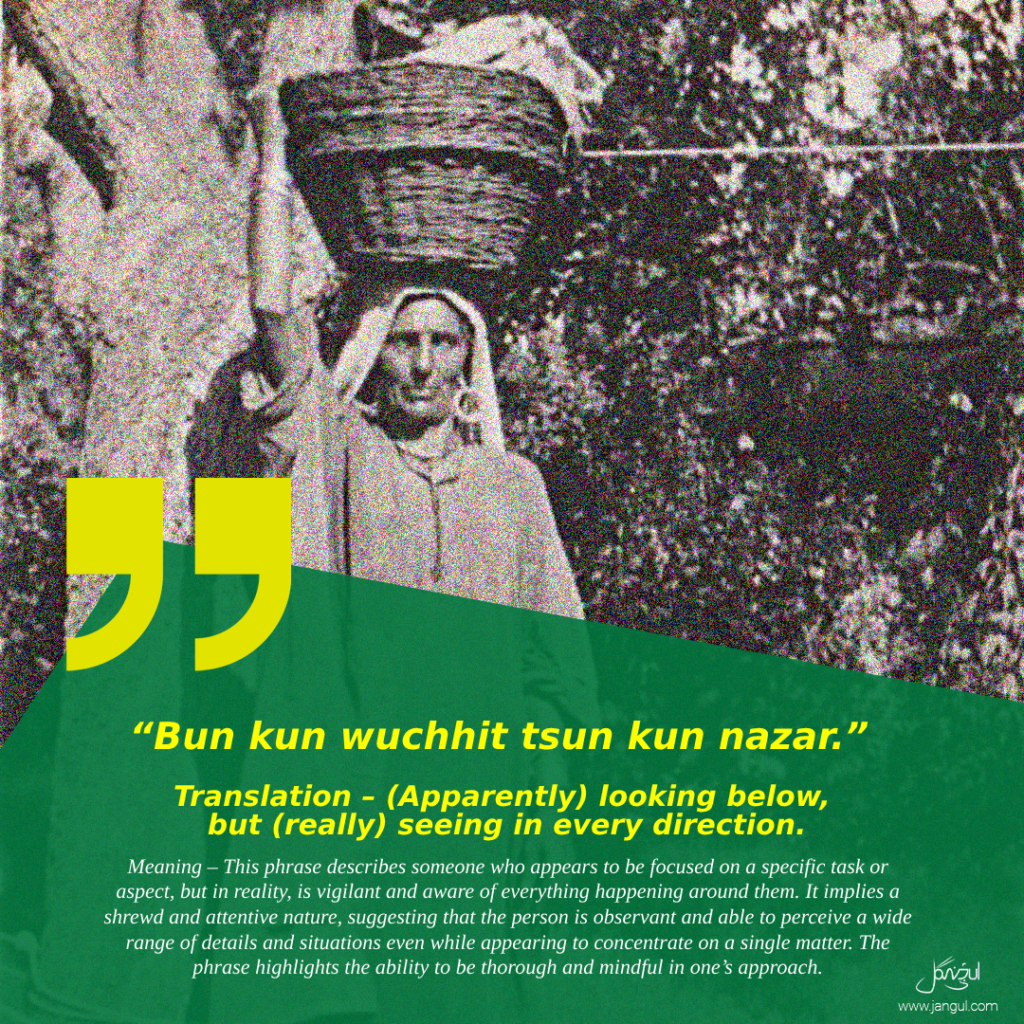
75. “Buzi buzi gáḍah khěwan asmanas suět.”
Translation – He cooks his fish by the sun and eats.
Meaning – One of the Kashmiri proverbs that describes someone who is so self-assured or self-reliant that they ignore advice or input from others. The imagery of cooking fish by the sun suggests an individual who believes their own methods or decisions are superior and disregards alternative approaches or suggestions.
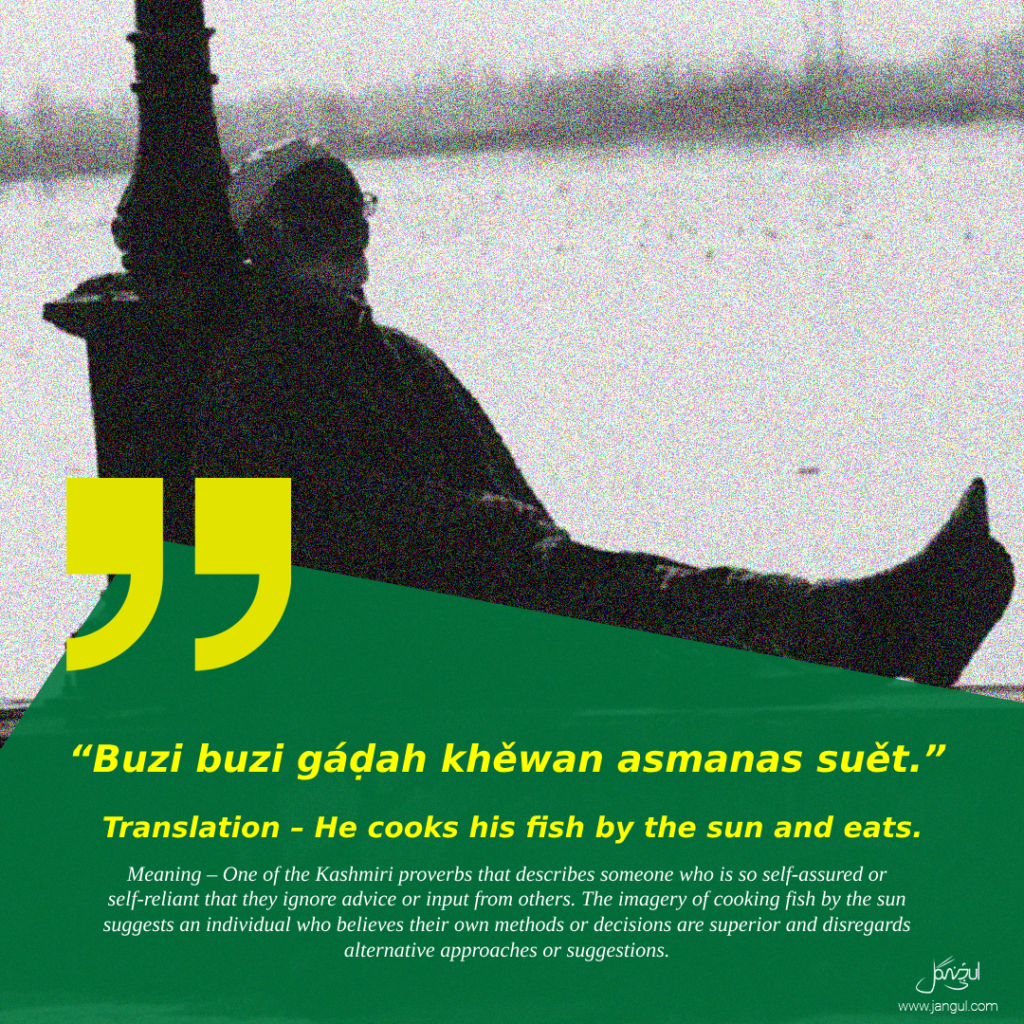
76. “Chini barándah kanı chhai nah sěz.”
Translation – Your doorstep is not straight.
Meaning – This phrase is used metaphorically to suggest that something is amiss or not right within a household or a family.

77. “Chánis dahanas guláb.”
Translation – May roses be to your mouth.
Meaning – One of the Kashmiri proverbs that is used as a gracious and appreciative response to a kind or pleasant remark made by someone else. It expresses the sentiment that the speaker wishes something beautiful or delightful (symbolized by roses) for the other person. It is a way of reciprocating positive sentiment and conveying gratitude for the kind words spoken.
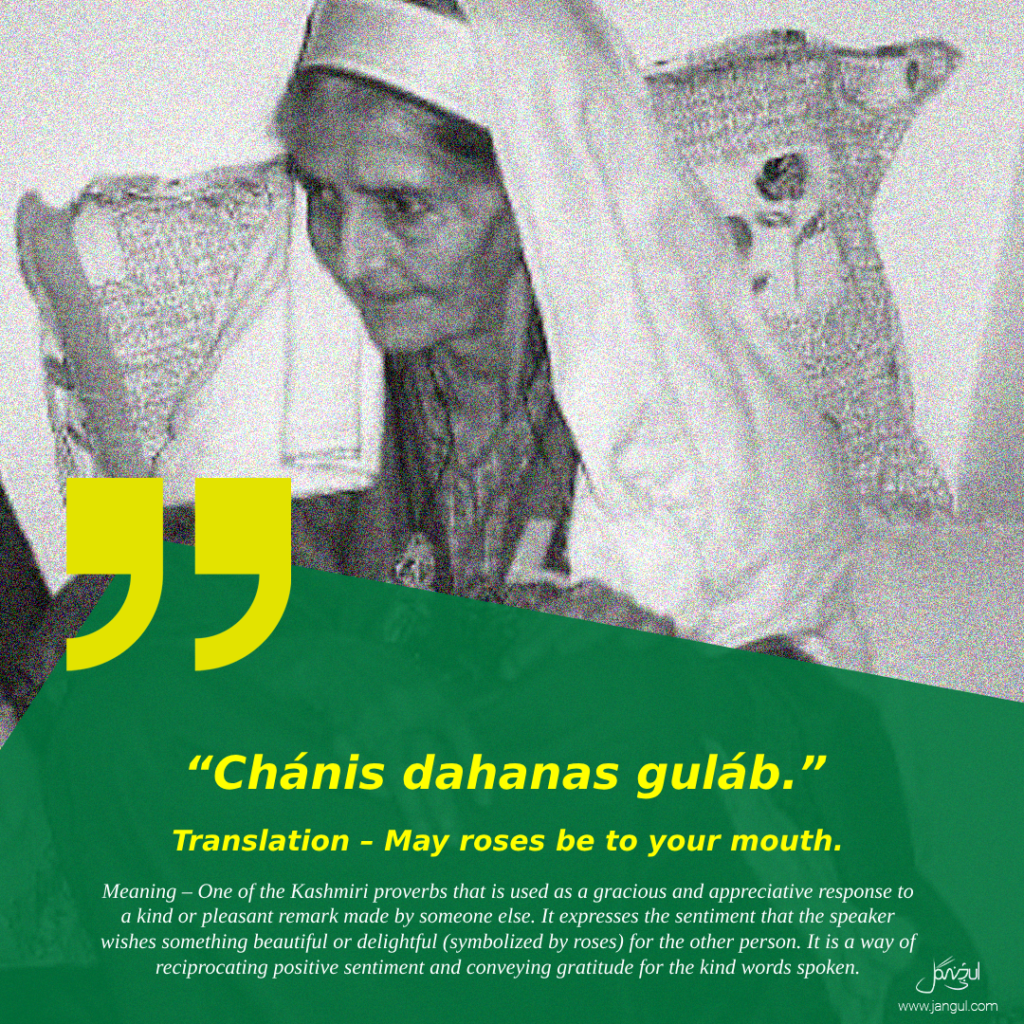
78. “Chenis haakas chhuh neh paak dinuk haajat.”
Translation – There is no need to cook your cabbage.
Meaning – One of the Kashmiri proverbs that suggests that one does not need to unnecessarily complicate things or make an extra effort for a simple task or situation. It implies that sometimes, simplicity is the best approach, and there’s no need to overthink or overdo things.
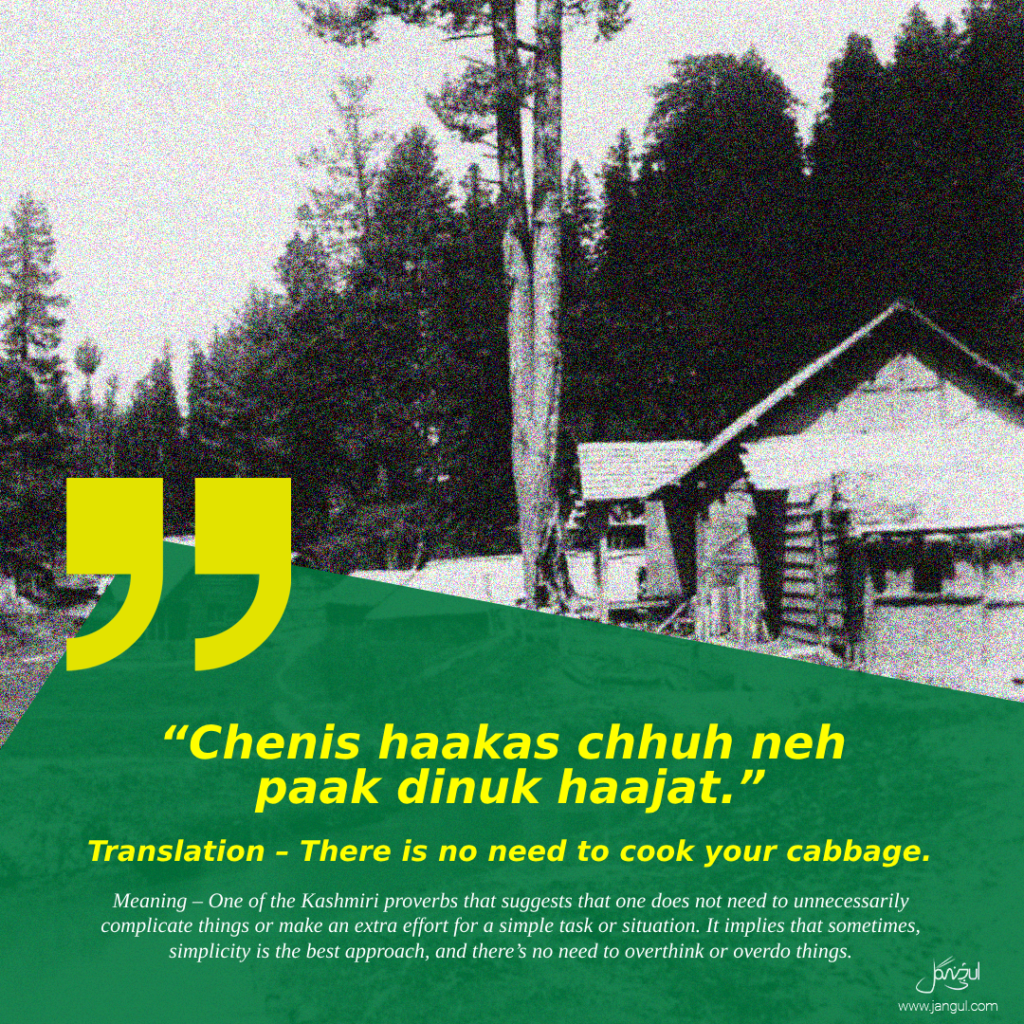
79. “Chhanih kij.”
Translation – The carpenter’s wooden nail.
Meaning – Overall, the phrase illustrates themes of ingenuity, negotiation, and the dynamics of ownership, while also offering a glimpse into the interactions and strategies within the world of craftsmanship.
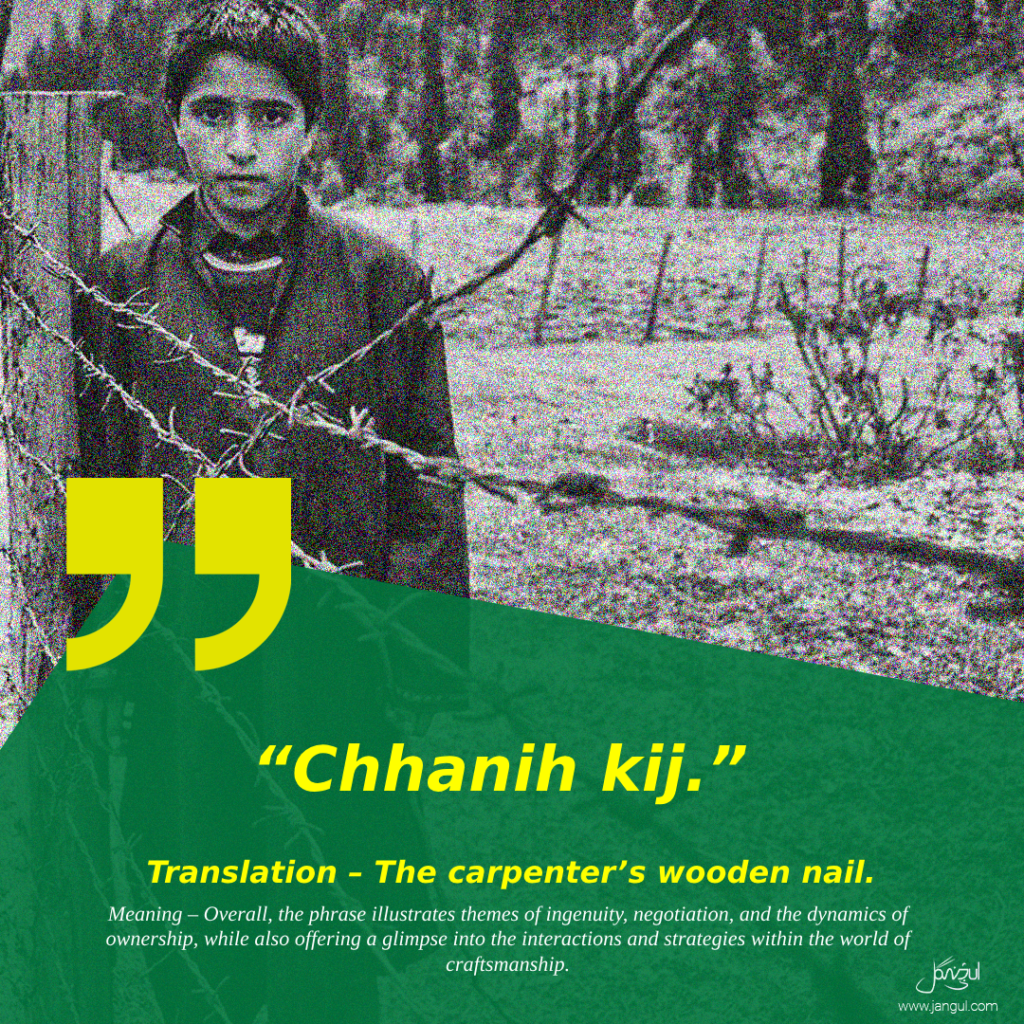
80. “Chhanah thuk chhuh nah bastih rozán.”
Translation – The sound of the carpenter does not remain secret.
Meaning – This phrase conveys the idea that no matter how hard one tries to conceal or hide something, the truth has a way of being revealed over time. Just as the noise made by a carpenter’s work cannot be kept hidden, the underlying truth or reality of a situation will eventually become known or apparent. It emphasizes the inevitability of truth coming to light and suggests that attempts to conceal it are often

temporary.
81. “Chhěn nut chhěh wazaan.”
Translation – Empty vessels sound.
Meaning – One of the Kashmiri proverbs that suggests that those who lack substance or knowledge often make the most noise. Just as an empty vessel produces a louder sound when struck, individuals who lack depth or understanding may try to compensate by being outspoken or boastful. It highlights the contrast between genuine knowledge or wisdom and mere showmanship.
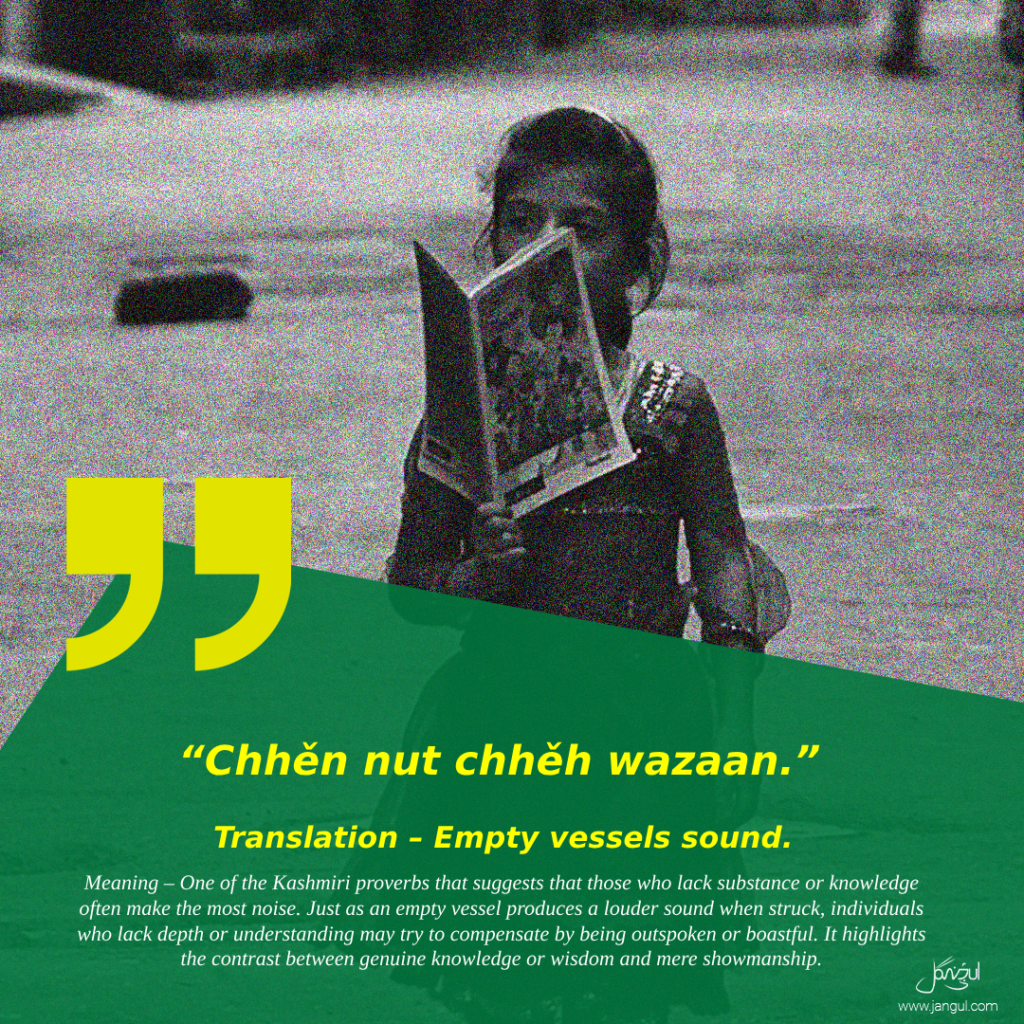
82. Dab chhuú bab?
Is falling down a father?
Why should I trouble about that fellow?

83. “Dahan thawin sai tah akis nah tsunun wai.”
Translation – He gives promise to ten, but does not give food to one.
Meaning – This phrase describes someone who makes grand promises or commitments to many people, but fails to fulfill even the most basic obligations to a single individual. It criticizes the person for being insincere and unreliable, highlighting their tendency to over-promise and under-deliver. The phrase underscores the importance of keeping one’s word and being consistent in actions, rather than making empty assurances.
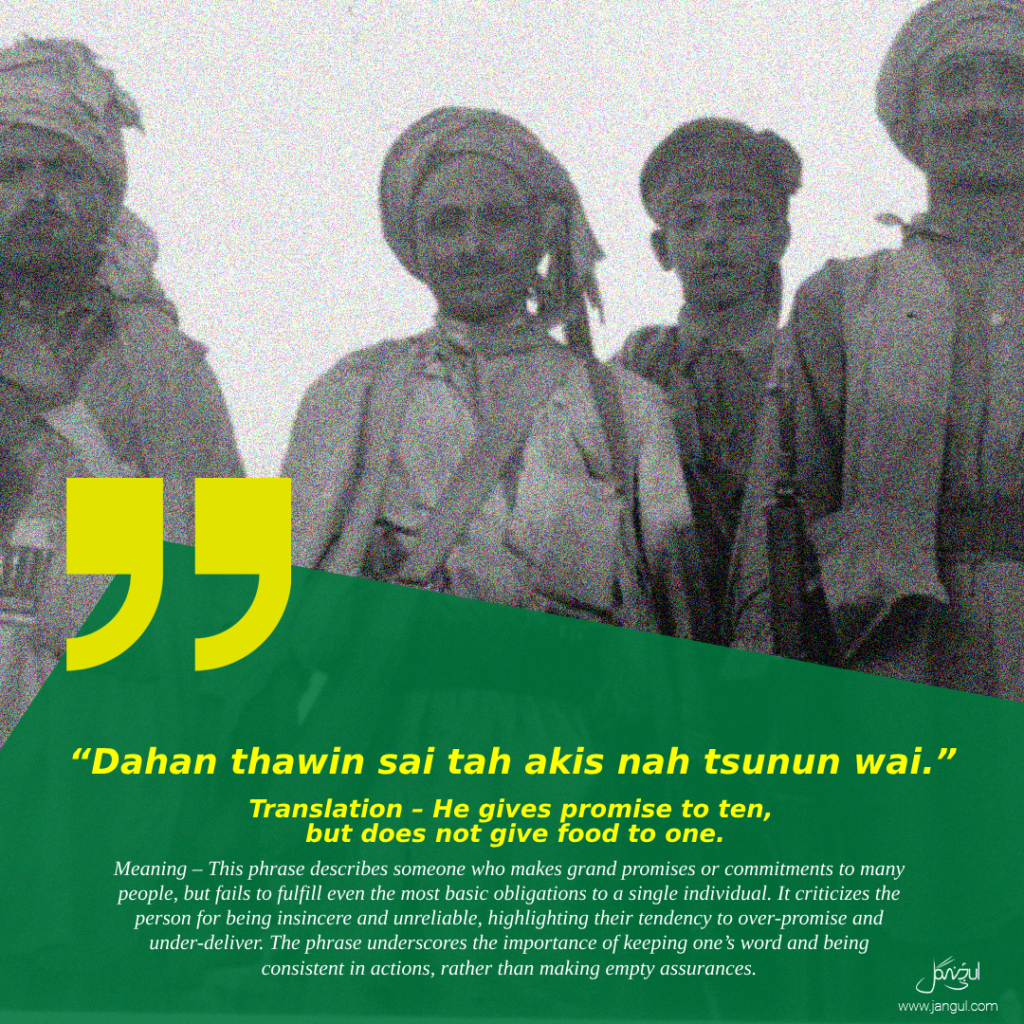
84. “Dachhun athah chhuh chhalán khowaris, tah khowur athah chhuh chhalán dachhinis.”
Translation – The right-hand washes the left, and the left-hand washes the right.
Meaning – This phrase symbolizes cooperation, mutual support, and reciprocity. It suggests that people should help and assist each other, just as one hand cleans the other. The imagery emphasizes the importance of working together, where each individual contributes to the well-being and success of others. It underscores the idea that collaboration and interdependence lead to collective progress and growth.

85. “Dah chandas; dah wandas; dah shúndas.”
Translation – Ten in the pocket; ten in the heart; ten in the pillow.
Meaning – The phrase uses the imagery of ten items being stored in various places to convey the idea that people may hide their true opinions or feelings, making it challenging to accurately discern their thoughts. It highlights the complexity of human nature and the limitations of trying to fully understand another person’s perspectives.

86. “Dúná dushman chhuí núdán metharah sandih khutah jún.”
Translation – A wise enemy is better than an unwise friend.
Meaning – This phrase conveys the idea that having an intelligent or shrewd adversary can be more beneficial than having an ignorant or foolish friend.
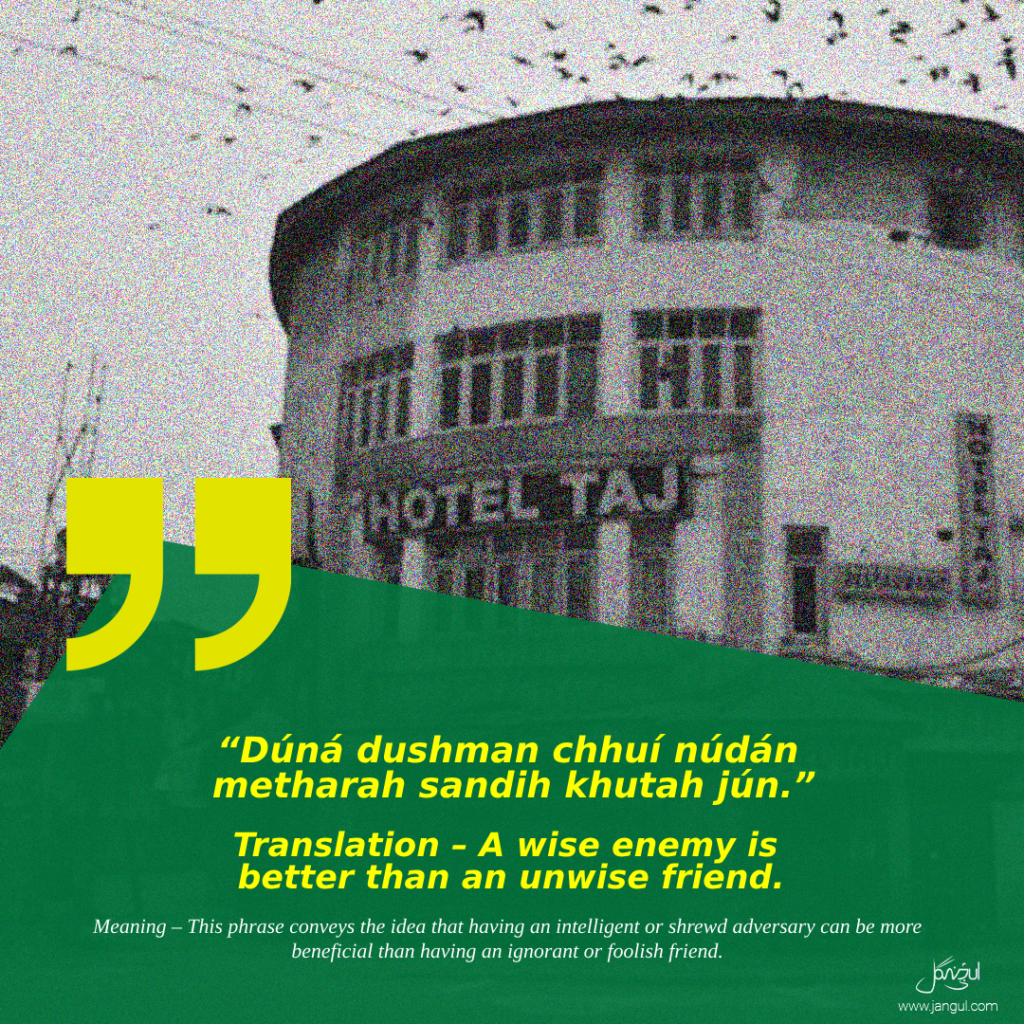
87. “Dangi suh.”
Translation – A tiger in the stable.
Meaning – A tyrant in his house.

88. “Dard chhěh gard.”
Translation – Love is as dust (i.e., must show itself).Meaning – This phrase suggests that love, like dust, must be visible or evident to have an impact.
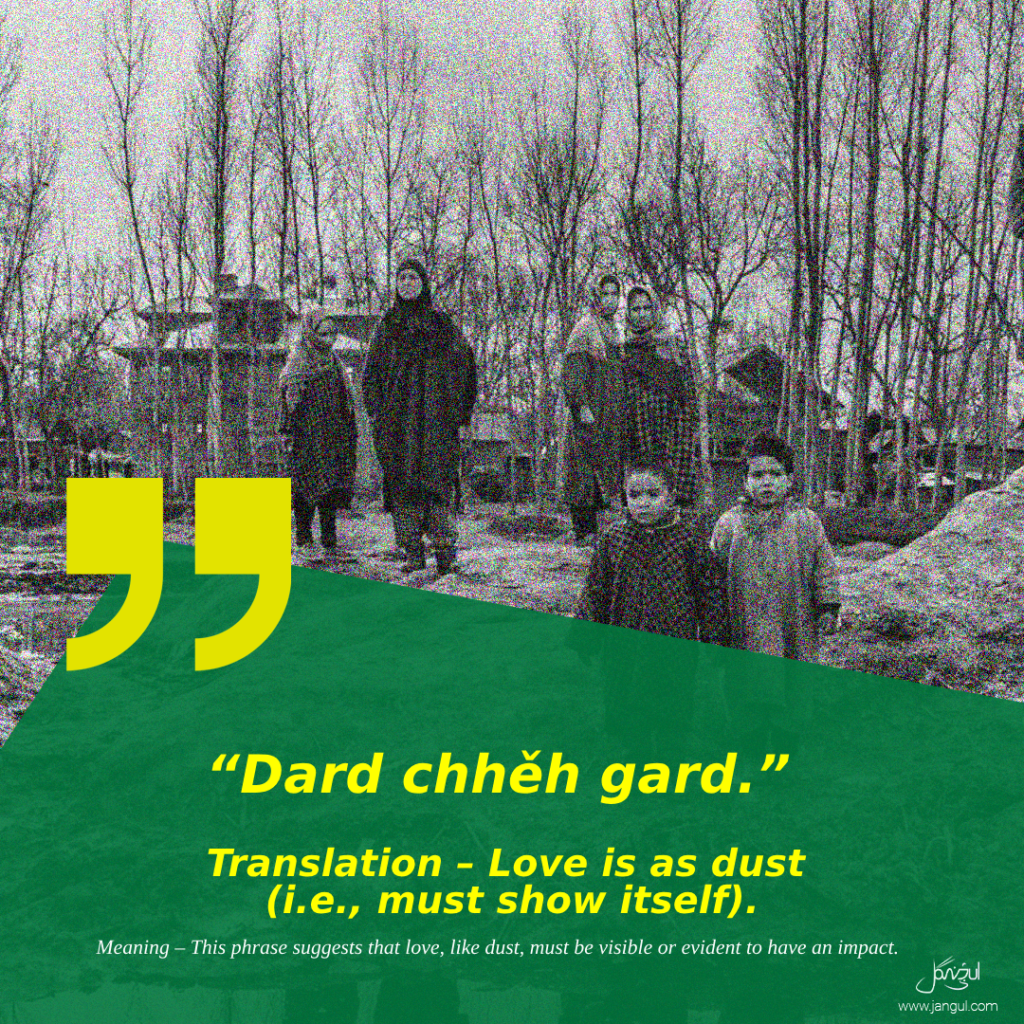
89. “Dastár chhih ganḍún izzatah khátirah wushnerah khátirah nah.”
Translation – Men bind on their turbans for honor’s sake, not for warmth.
Meaning – One of the Kashmiri proverbs that highlights the idea that certain actions or choices are made for reasons beyond their immediate practical benefits.

90 “Dazanas dod.”
Translation – There is pain from a burn.
Meaning – To lose anything is not pleasant.

91. “Dik nú tah paizúr khět?”
Translation – You will give, I know, but you will eat your shoes (first).
Meaning – Putting on the screw to get a debt.

92. “Dobi sund garah nonih íz doh.”
Translation – The washerman’s house will be known on the great feast day.
Meaning – This phrase refers to a situation where a washerman’s house becomes recognizable or distinct on a significant feast day. The explanation provided suggests that the washerman’s family typically wears the clothes sent to them for washing. However, during the festive occasion, people retrieve their clothes, leaving the washerman’s family with very few garments to wear.
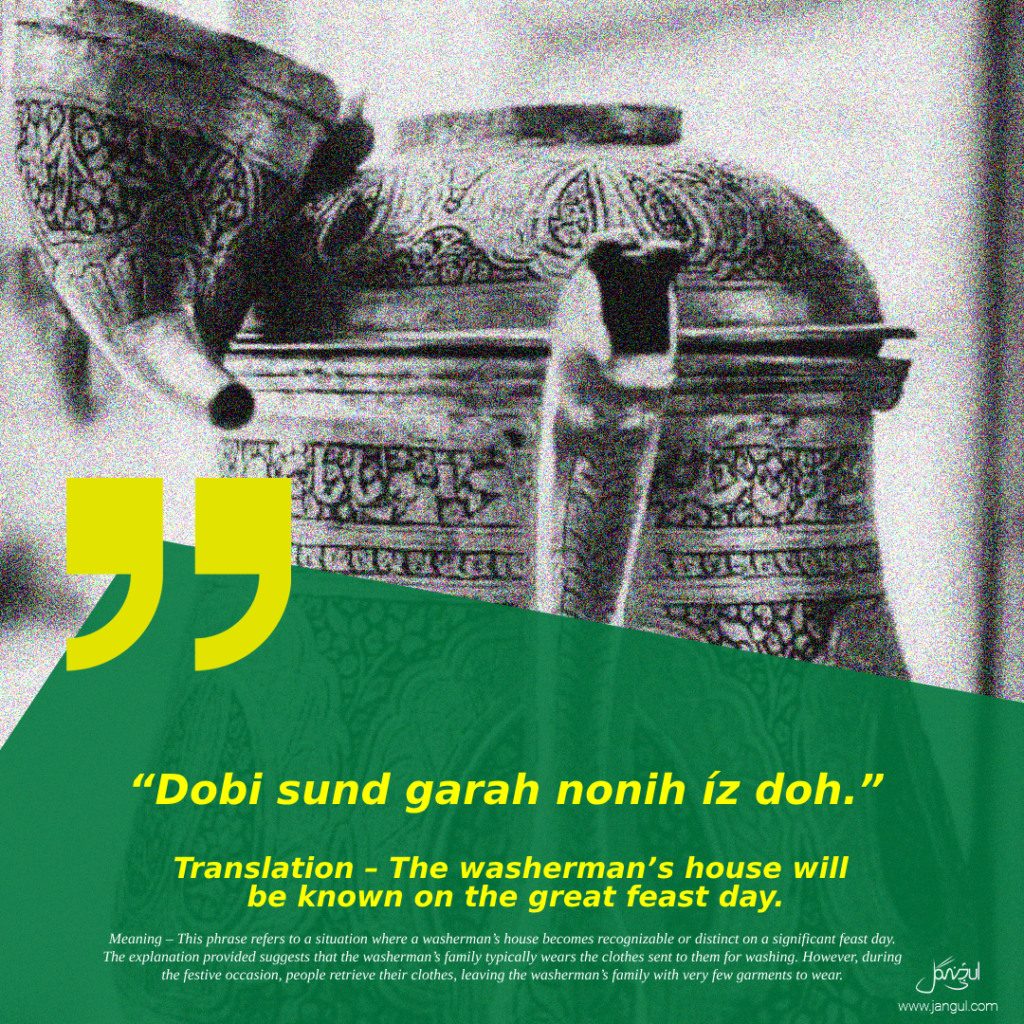
93. “Don ungajan chhuh nerán țás.”
Translation – One snaps with two fingers (not with one).
Meaning – It takes two to make a quarrel.
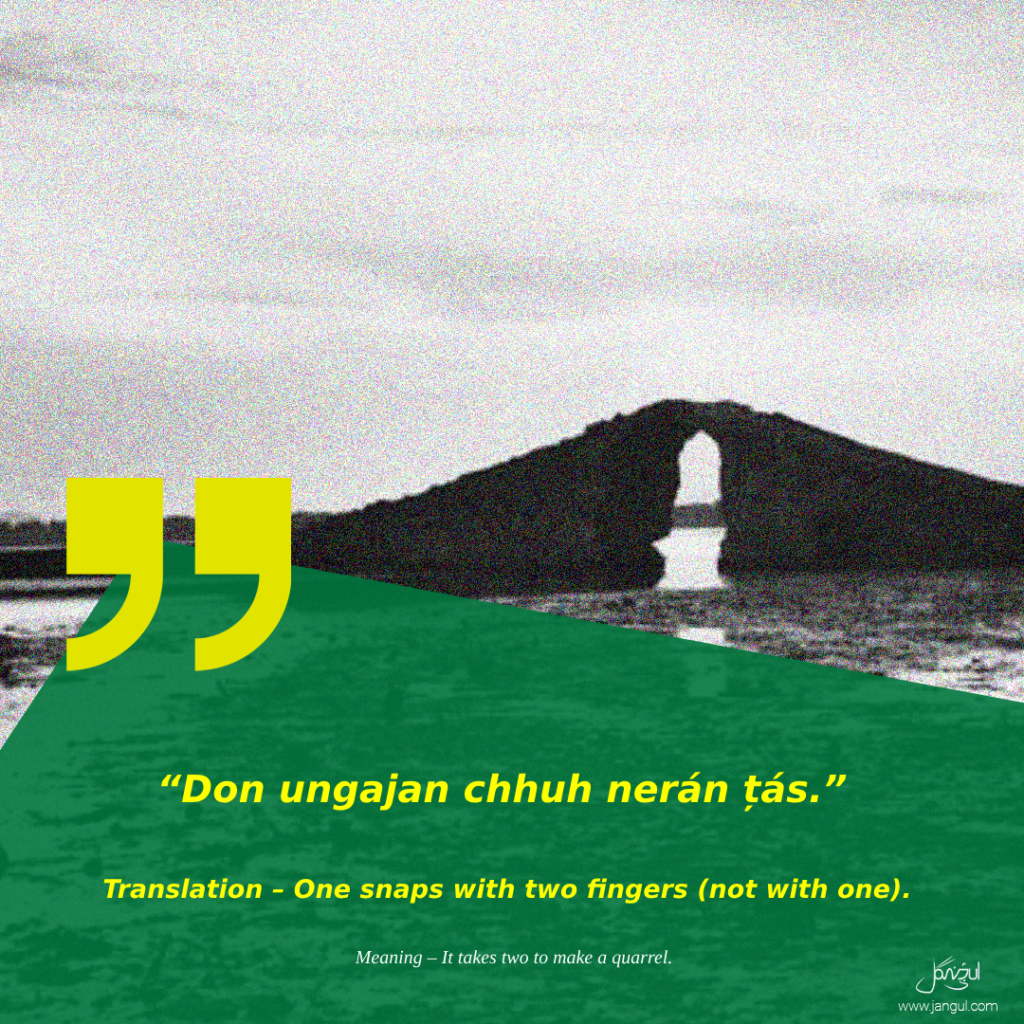
94. “Garah wandai garah súsú garah nerahah nah zah.”
Translation – O home, I offer you a thousand houses, and I will never go out from you.
Meaning – This captures the sentiment that there is no substitute or comparison for the comfort, familiarity, and emotional connection that one’s own home provides. It emphasizes the unique and irreplaceable nature of one’s personal living space and the sense of belonging associated with it.
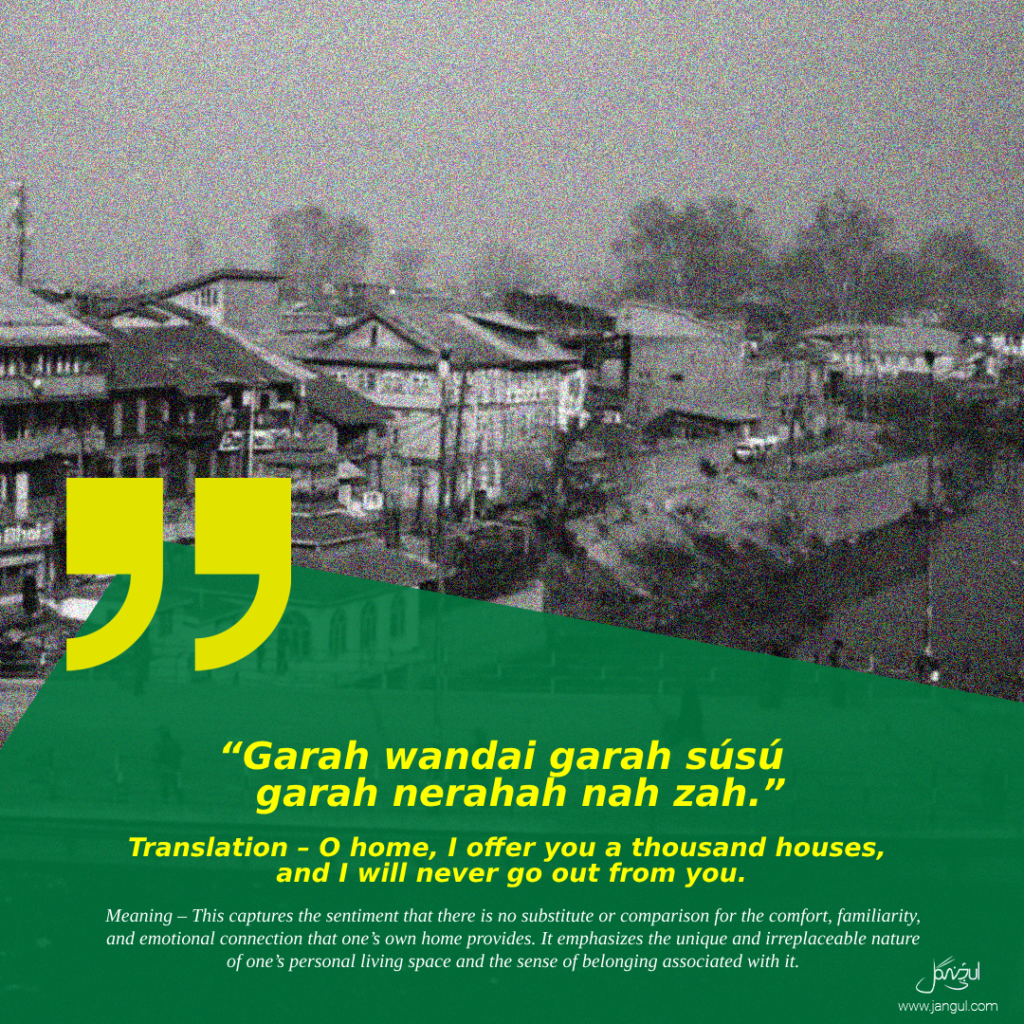
95. “Giv diyih nah tah wutsh cheyih nah.”
Translation – The cow will not give (milk) and the calf will not drink it.
Meaning – This phrase describes a situation where there is mutual dislike or animosity between two parties, but neither party takes the initiative to sever the relationship. The comparison of the cow and calf not cooperating with each other mirrors the strained relationships between stepmother and step-children, or between an old servant and their master. Both sides harbor negative feelings, but they hesitate to take action to end the association.
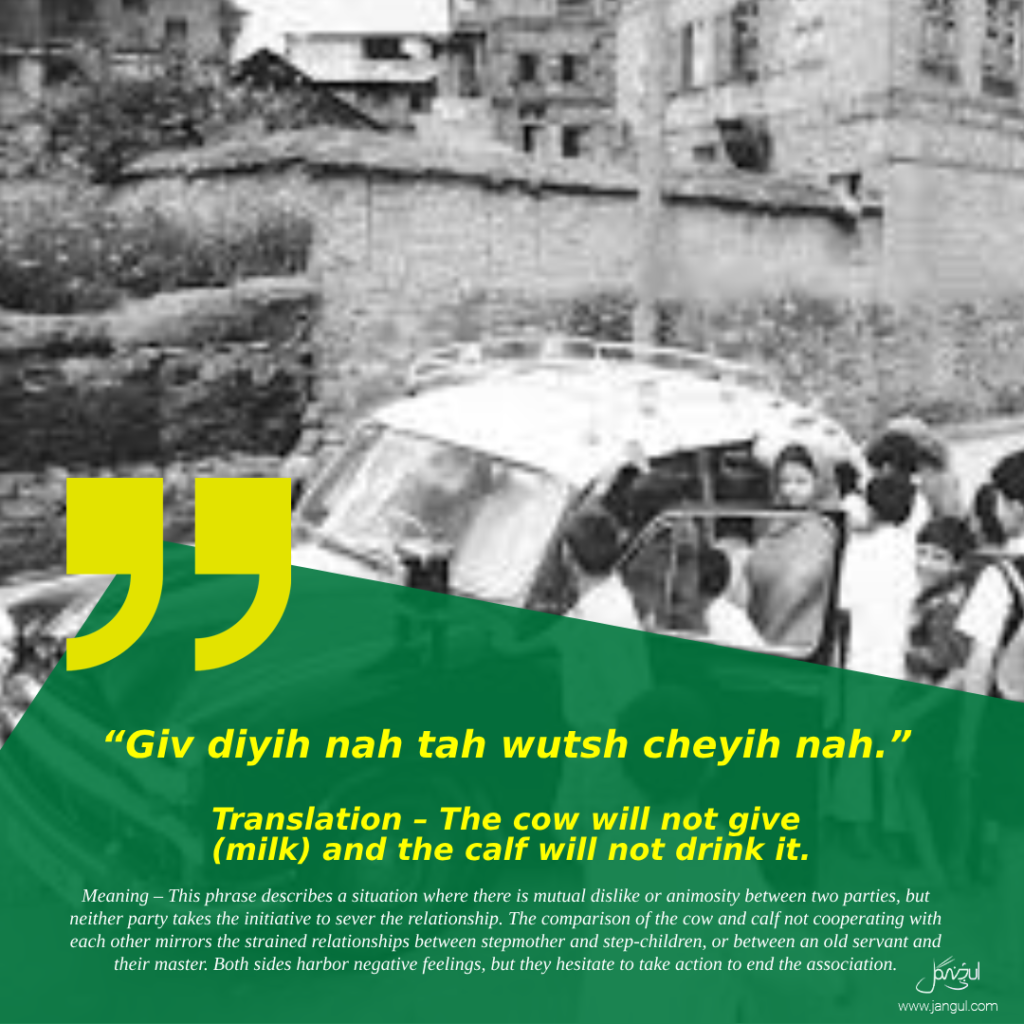
96. “Gewahah tah gyav khyom brárih.”
Translation – I would sing, but the cat has eaten my ghí.
Meaning – Circumstances are so that a person is afraid to speak or to act for himself.
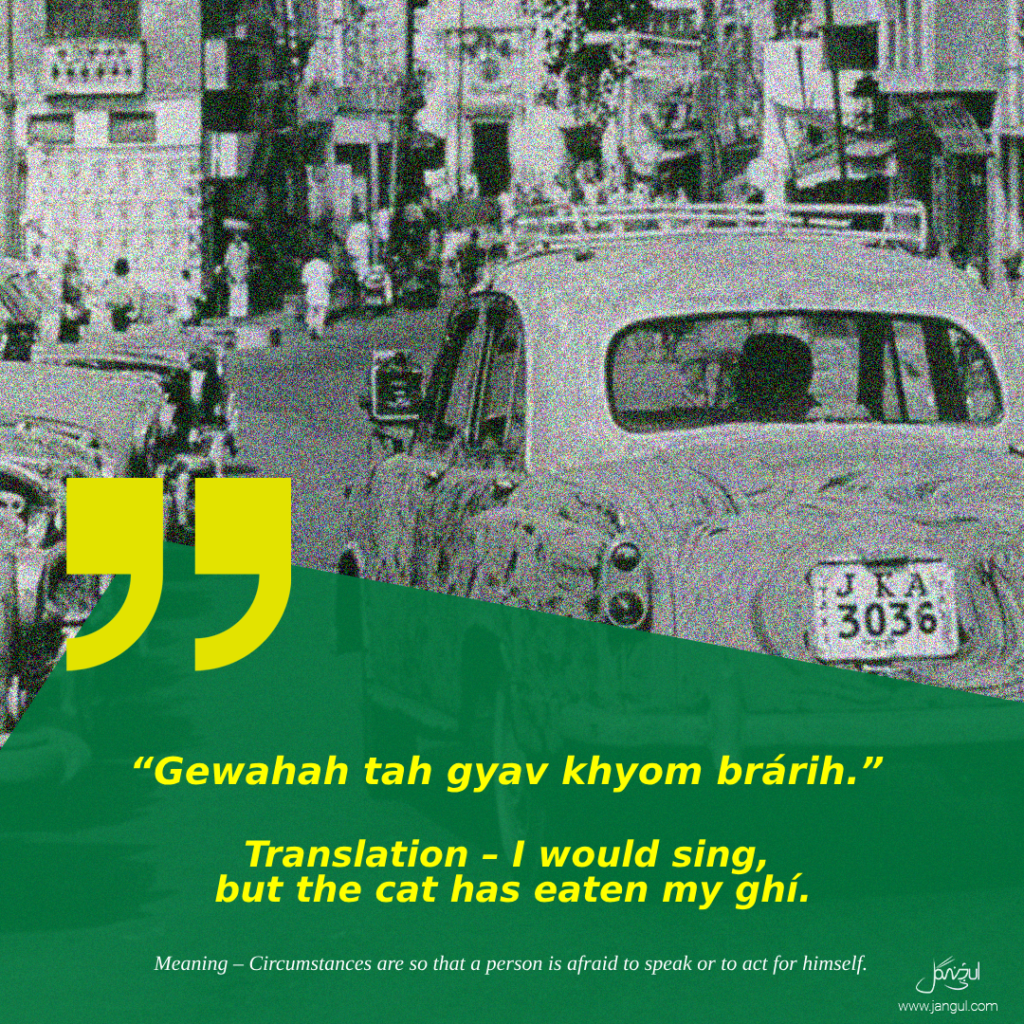
97. “Gúr dapiya, kih myon dud chhuh tsok?”
Translation – Will the milkman say that his milk is sour?
Meaning – This phrase is used rhetorically to highlight the inherent bias or lack of objectivity that someone might have when assessing their own products or actions. Just as a milkman is unlikely to admit that his own milk is sour, the phrase suggests that people may be hesitant to acknowledge or admit their own shortcomings or faults.

98. “Gur kyahpakihěh sirá chhuh pakún.”
Translation – The horse does not walk, but the secret walks.
Meaning – This phrase reflects the idea that outward appearances or facades often influence people’s perceptions and judgments of others. Just as a horse may appear to be walking, it’s actually the rider’s actions that propel its movement. Similarly, people tend to form opinions based on surface-level impressions and may not accurately perceive a person’s true nature or intentions. The phrase suggests that individuals often project an image or disguise that conceals their genuine self or motives. It underscores the notion that understanding someone’s true character requires going beyond appearances and uncovering their underlying motives or secrets.
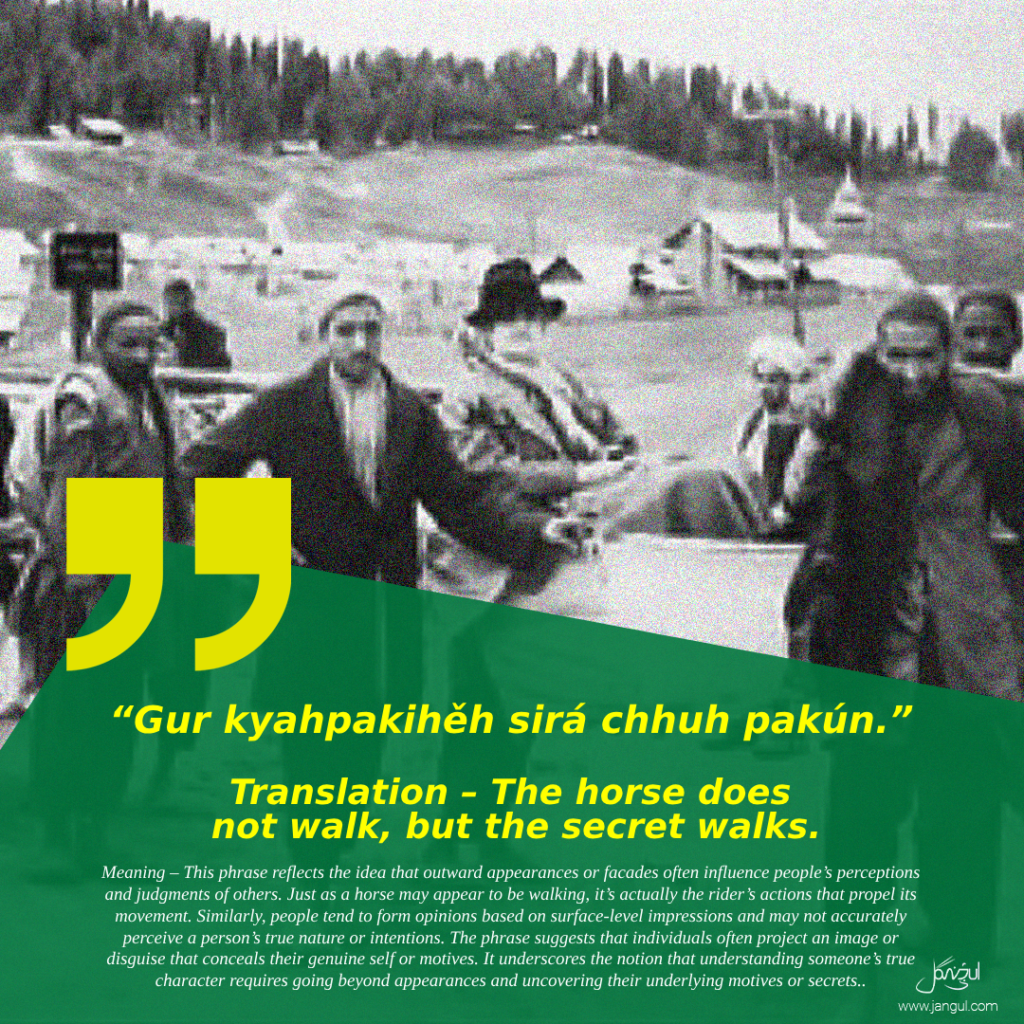
99. “Gursas mál tah tsuḍ hět patah kani”
Translation – Wishing to drink the butter-milk, but hiding the vessel behind him.
Meaning – One of the Kashmiri proverbs that captures the idea of someone who outwardly acts modestly or refrains from indulgence but secretly desires or craves more. The imagery of hiding the vessel of buttermilk while wanting to drink it serves as a metaphor for suppressing desires or actions while harboring inner wishes. In the context of dining out, it implies that a person may appear to eat sparingly or decline additional servings, but they actually desire to consume more. The phrase highlights the contrast between external behavior and internal desires, shedding light on the complexity of human motivations and actions.

100. “Gyav khěwán tah gardanih kun athah lúgún.”
Translation – Eating ghí and then feeling his neck (to see if he was getting fat, the fool, -as if results would happen so quickly as that)!
Meaning – This phrase humorously points out someone’s foolish or impatient behavior. It describes an action that is illogical or unrealistic, highlighting the absurdity of expecting immediate results from a recent action. In this case, the imagery of eating ghí (clarified butter) and then checking the neck to see if one is getting fat satirizes the idea of expecting instant changes in one’s physical appearance. The phrase is used to mock impatience, lack of understanding, or unrealistic expectations, reminding the listener that certain outcomes take time and cannot be instantly achieved.
